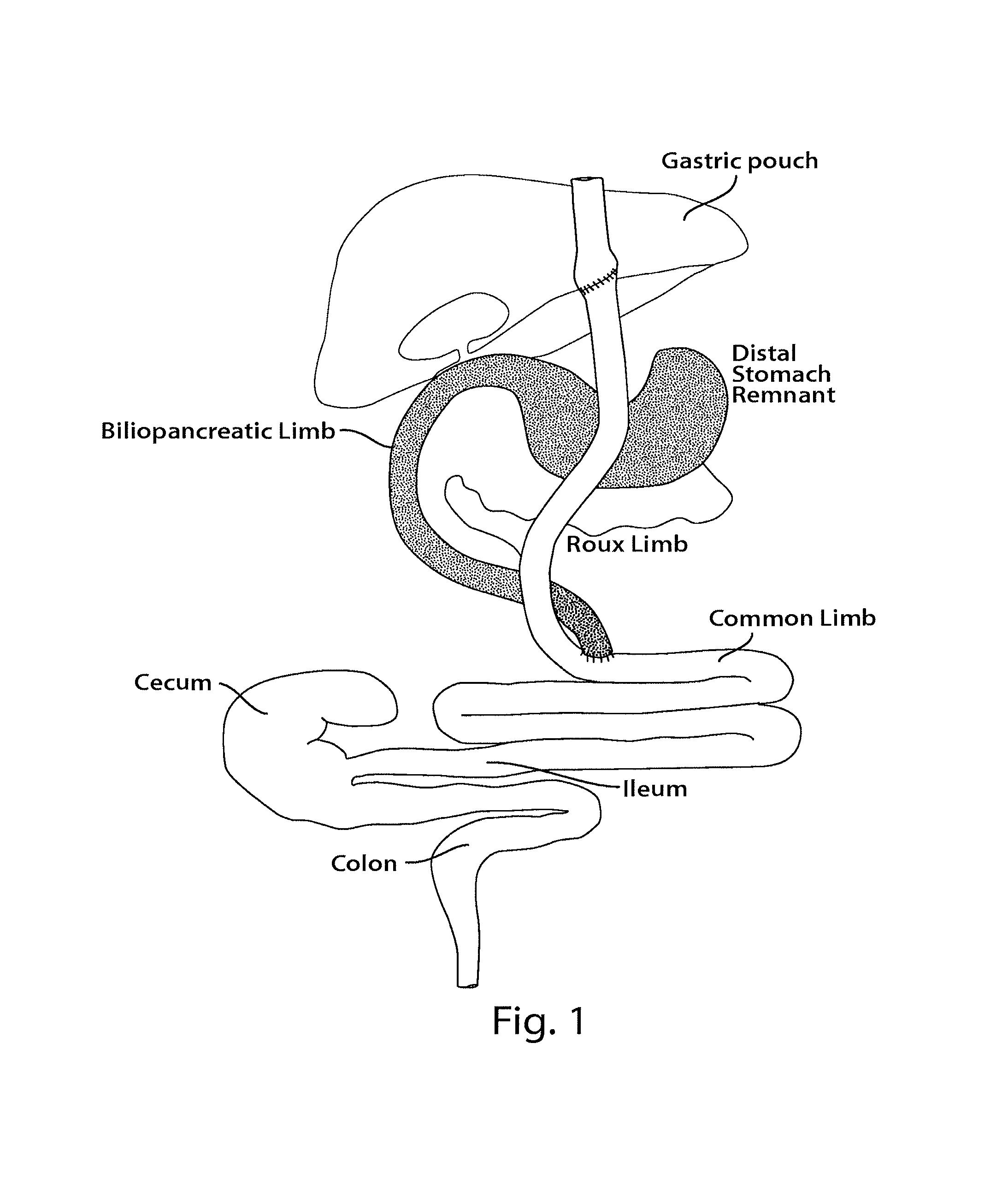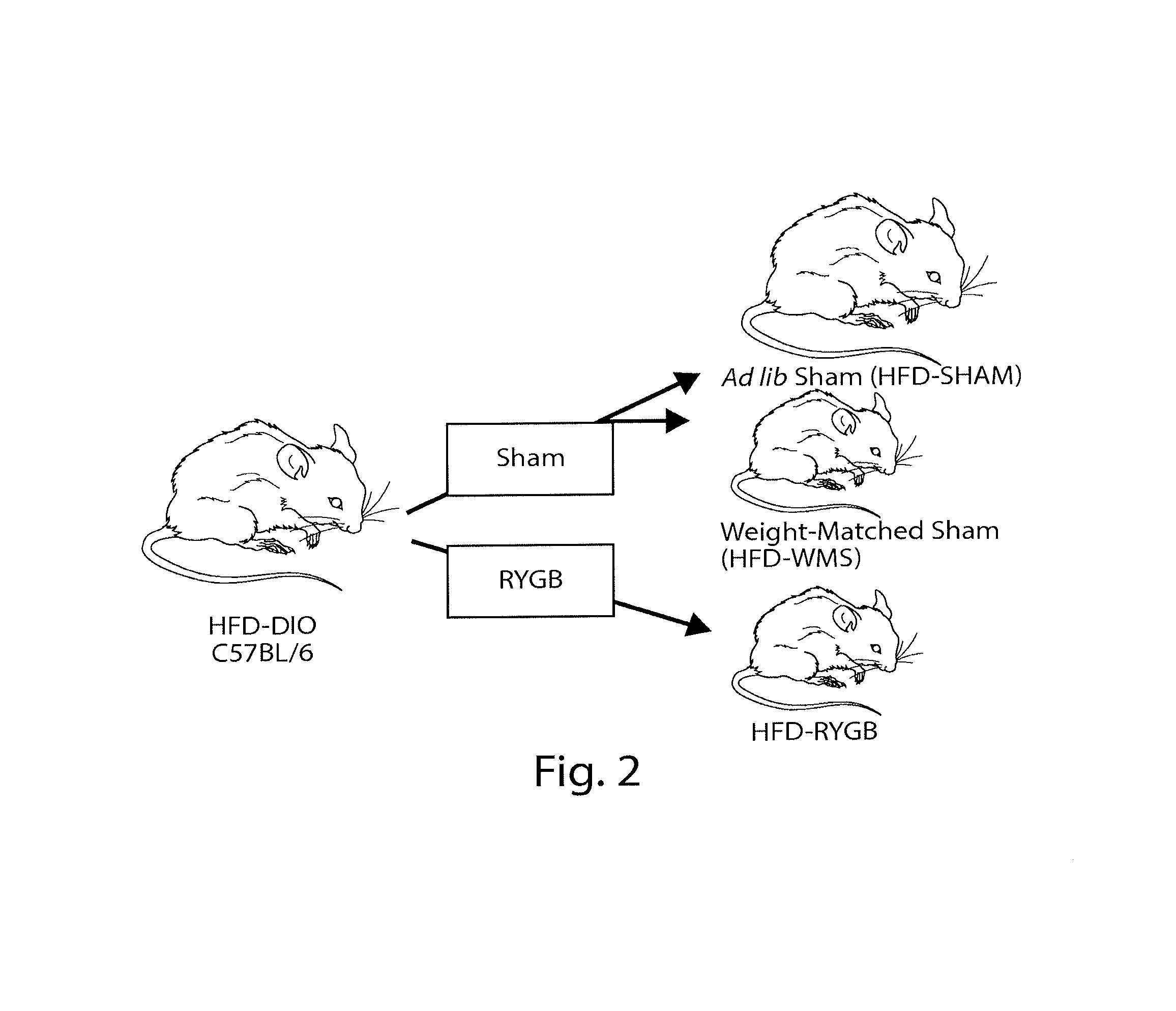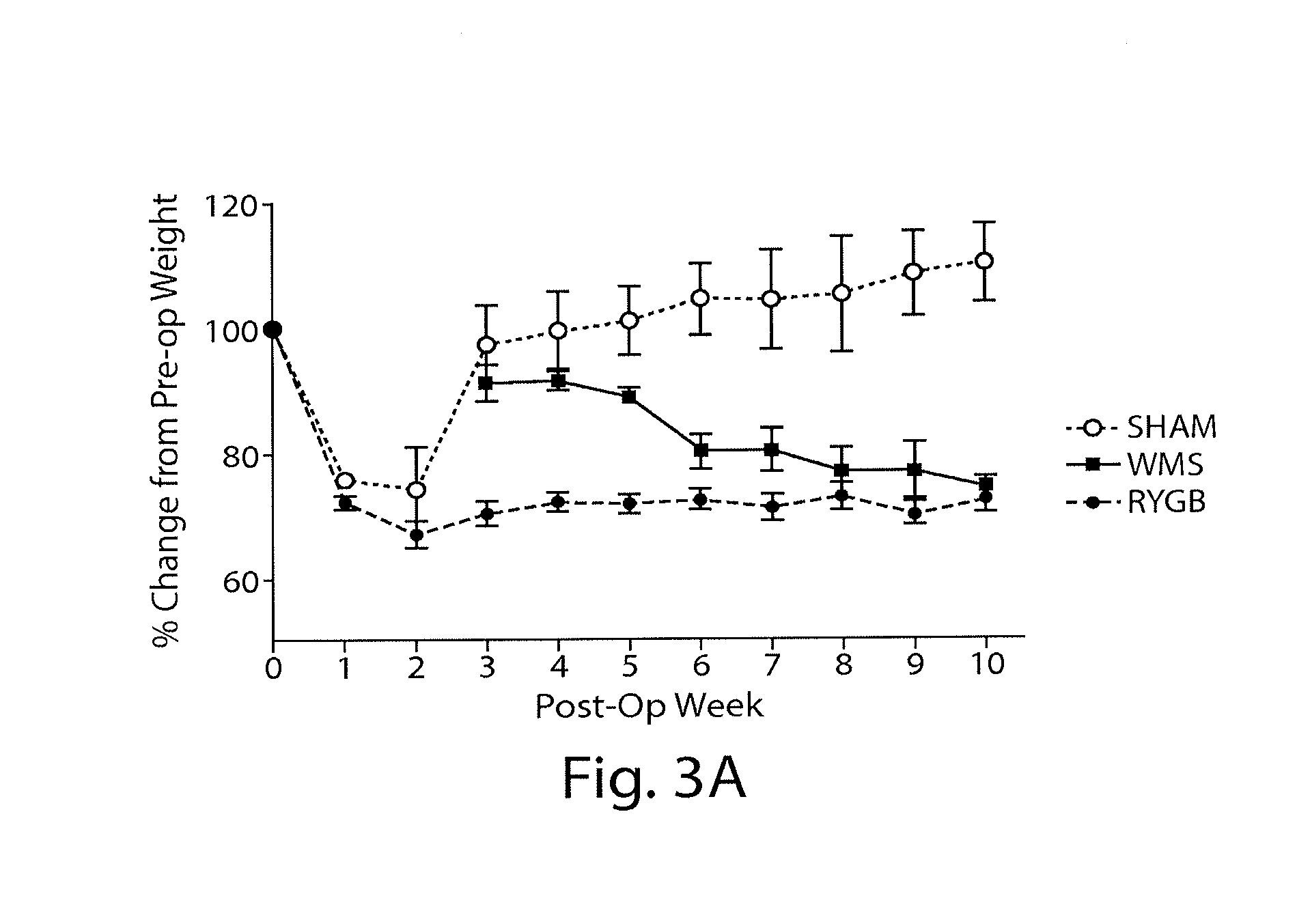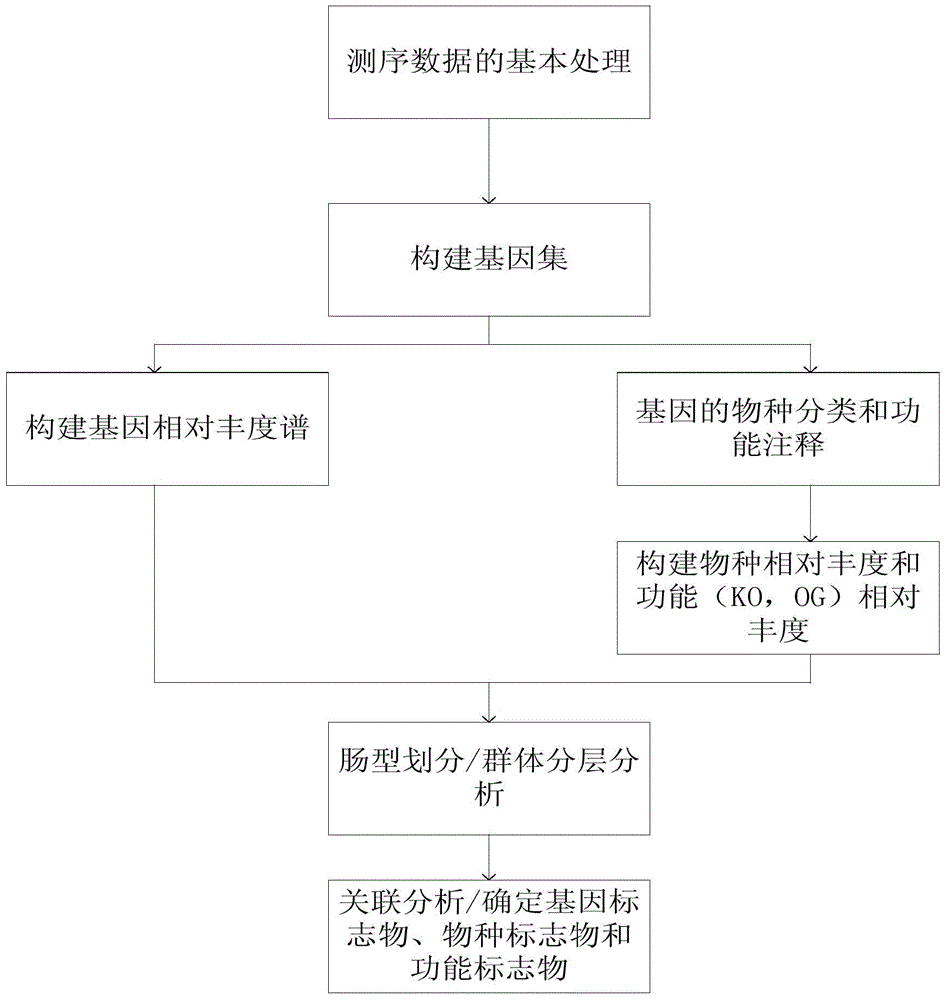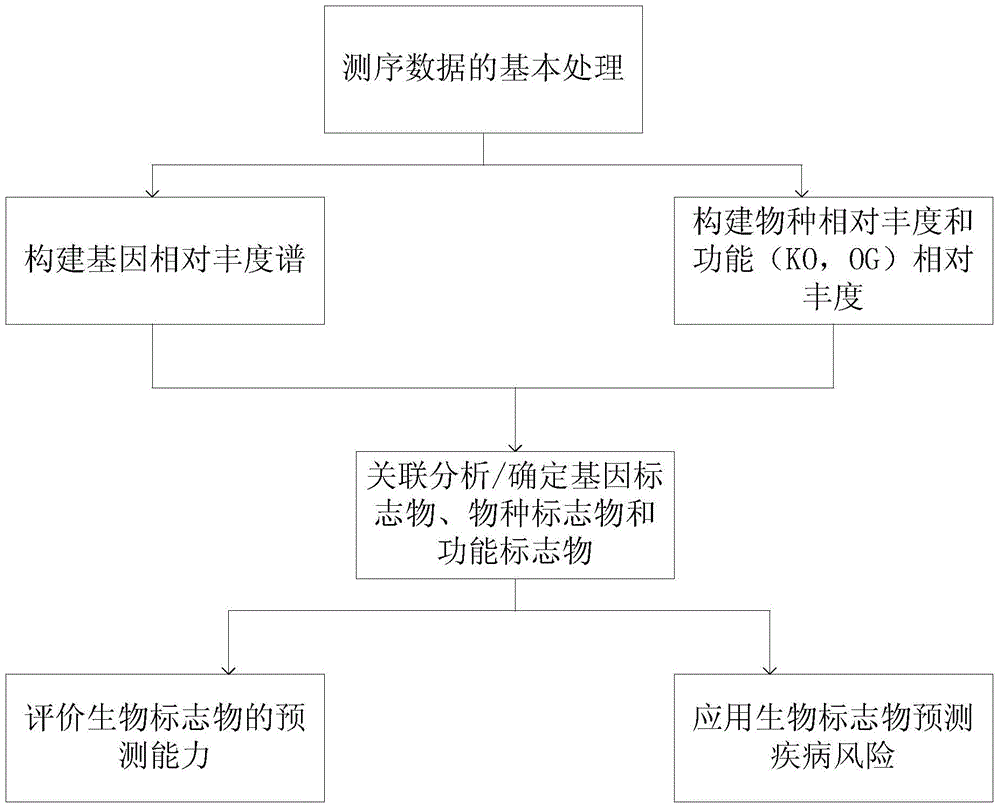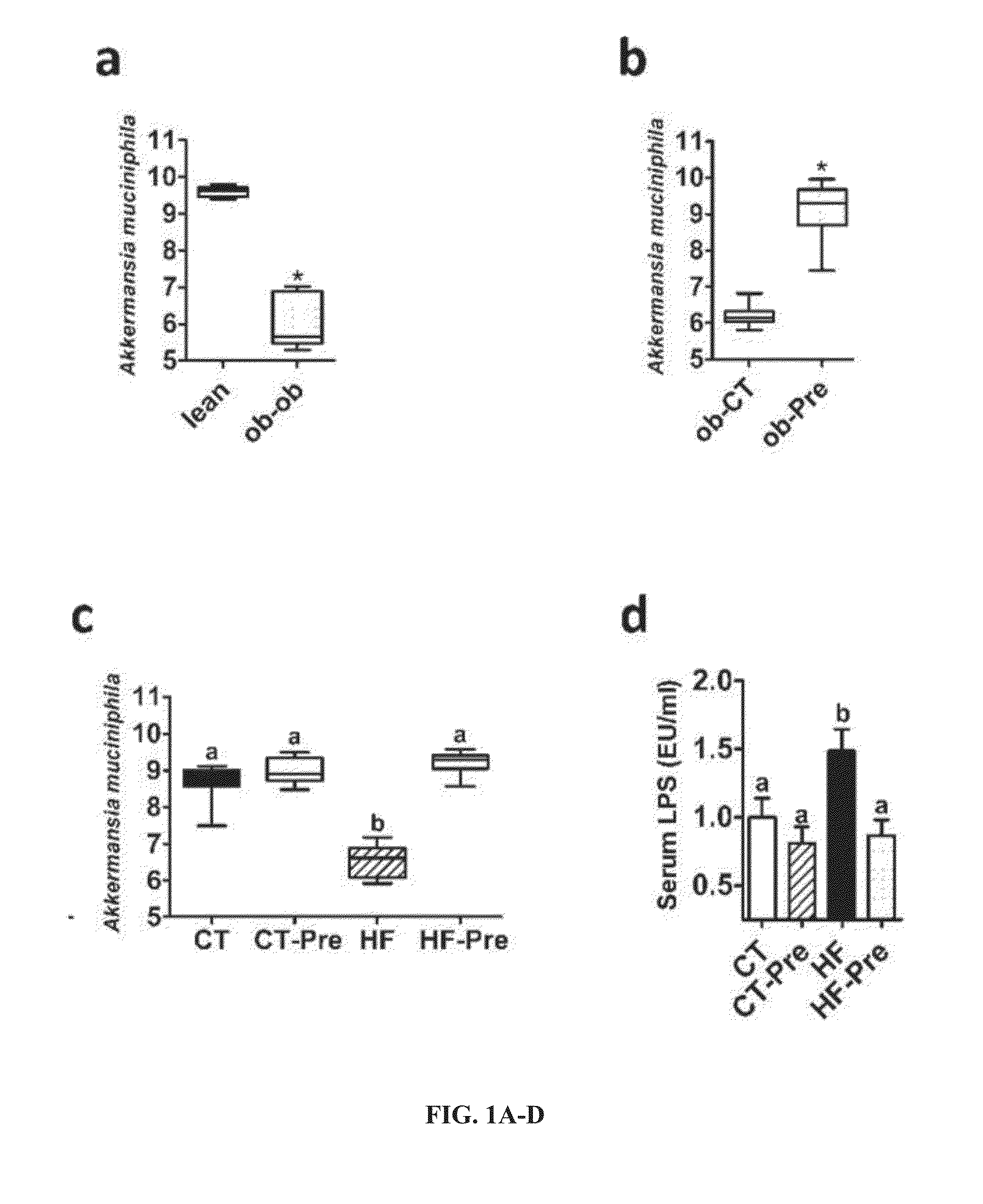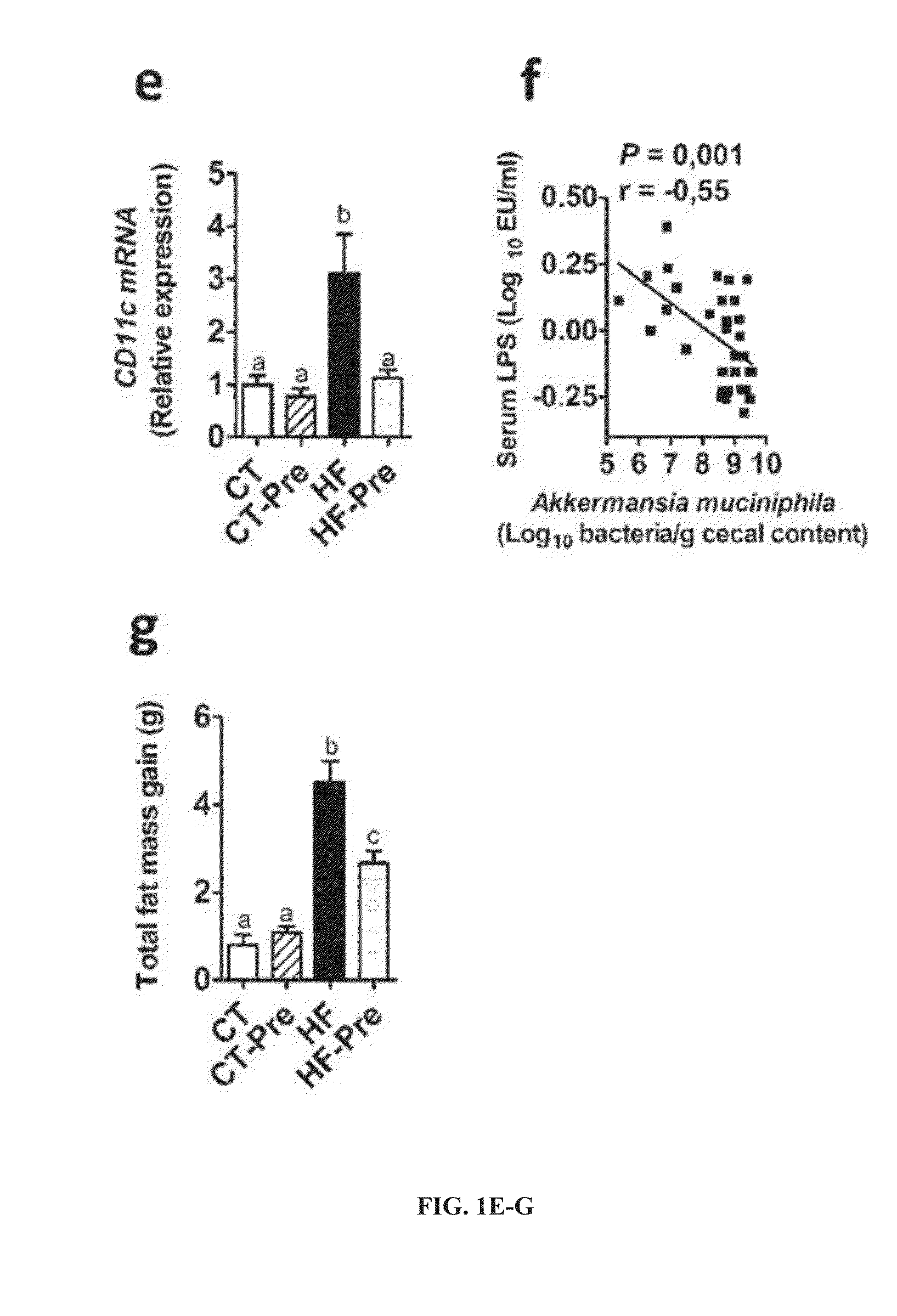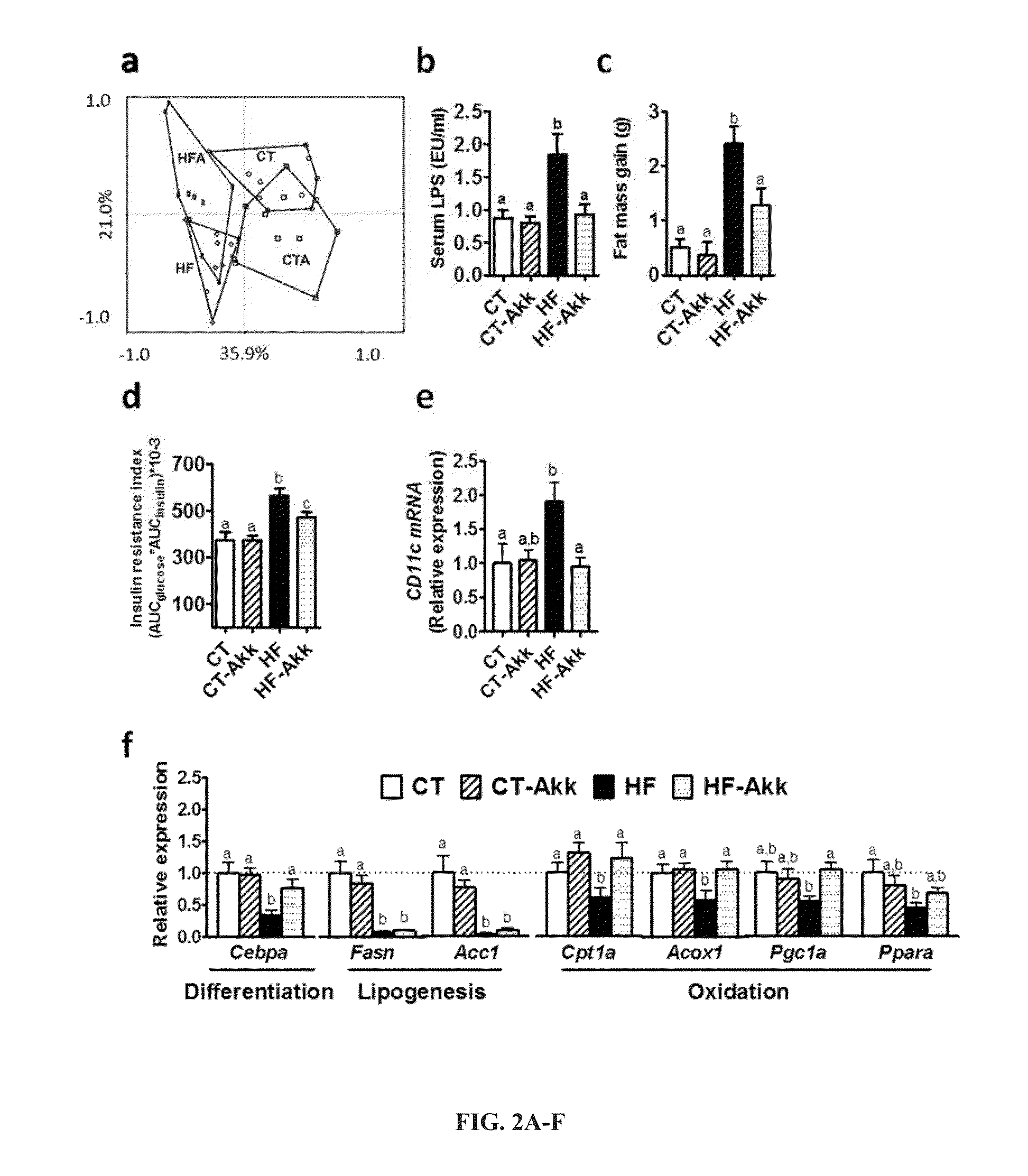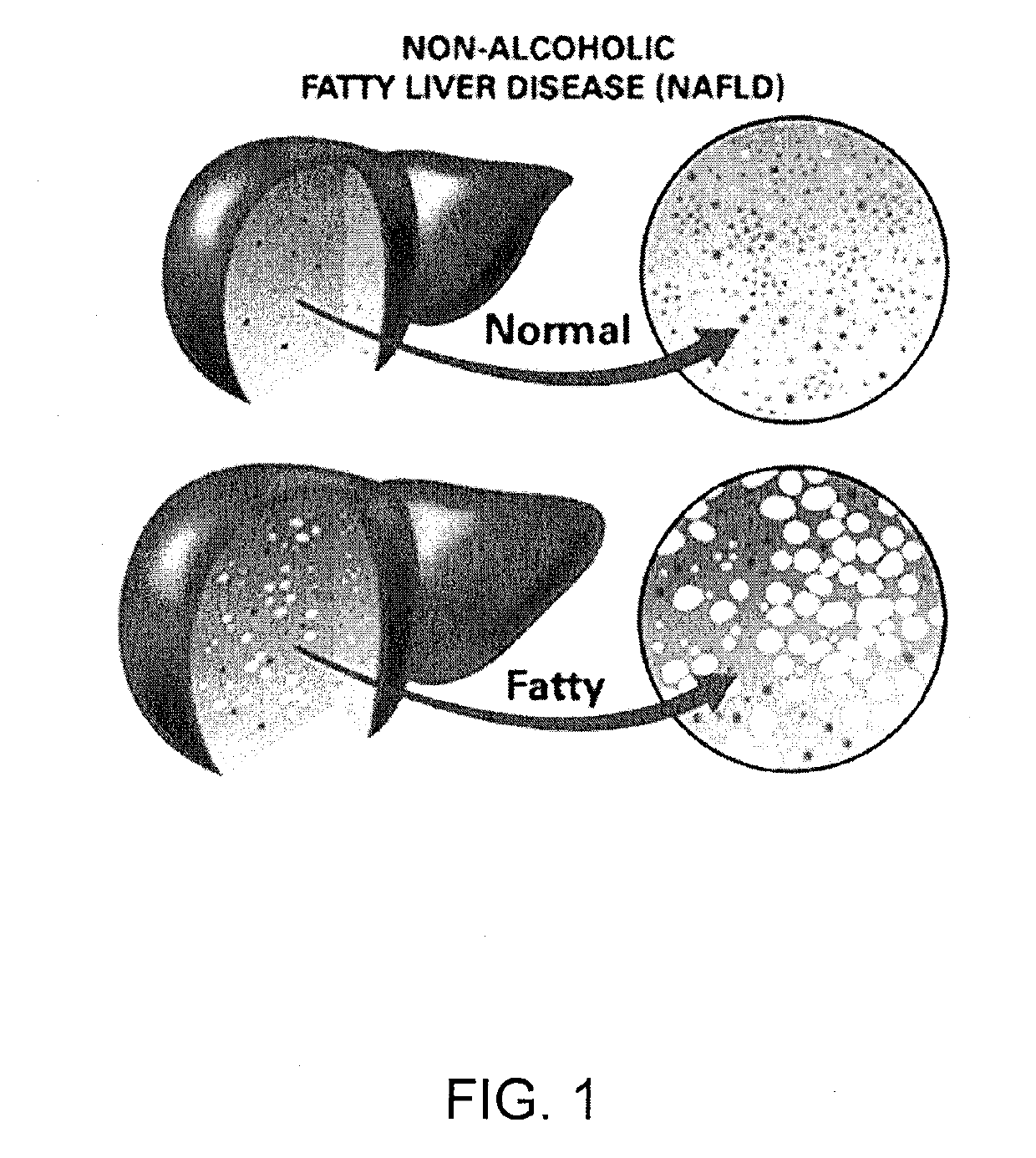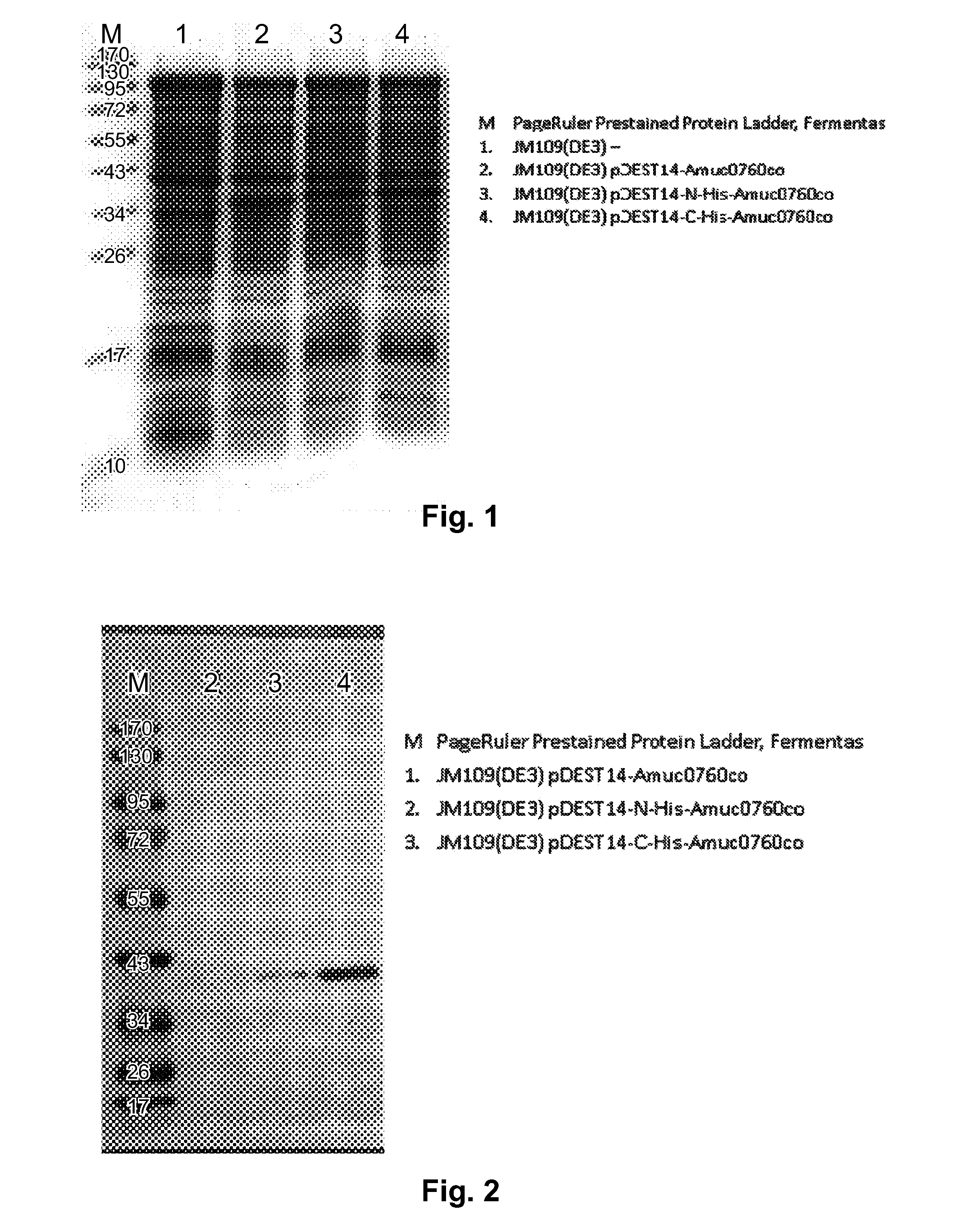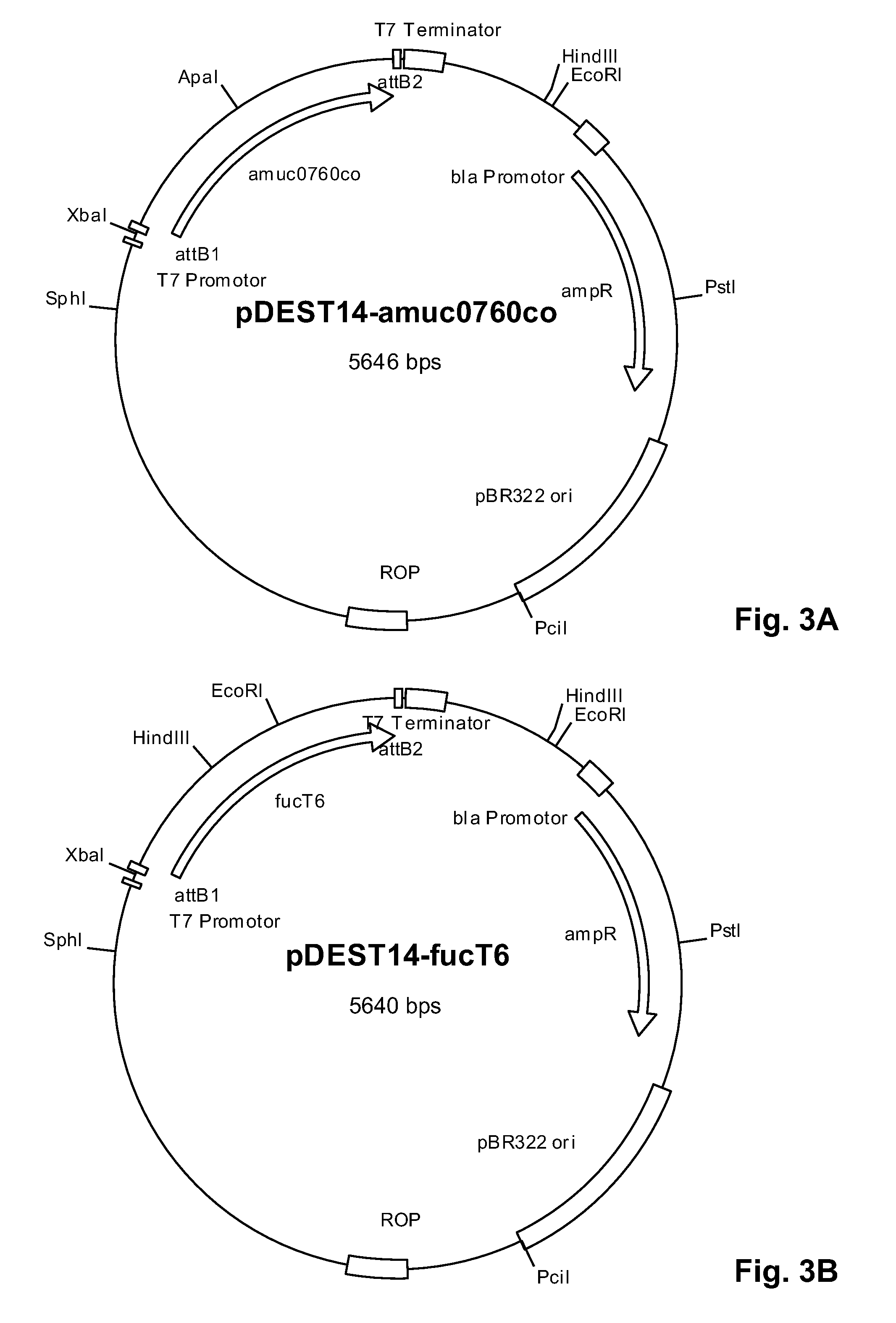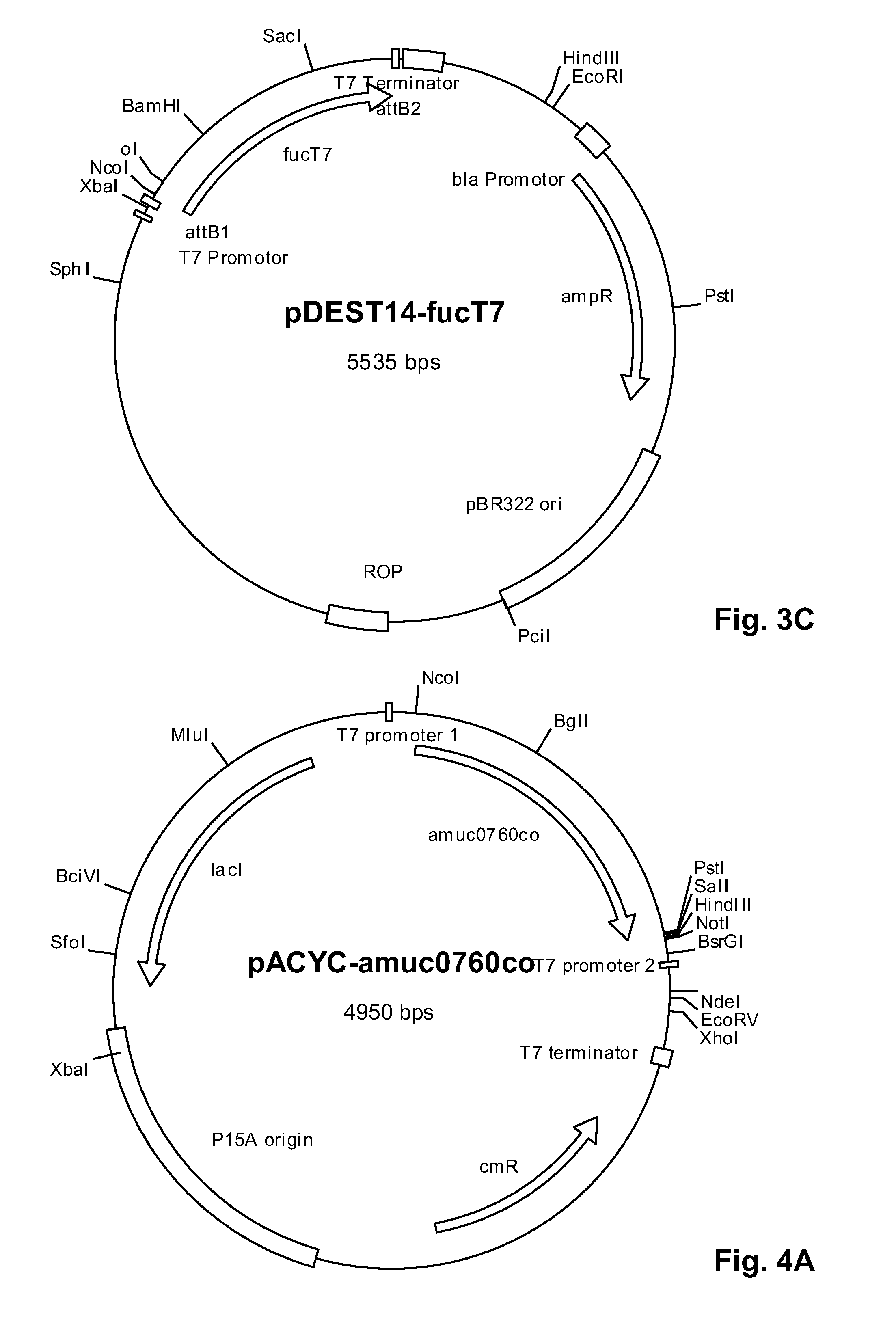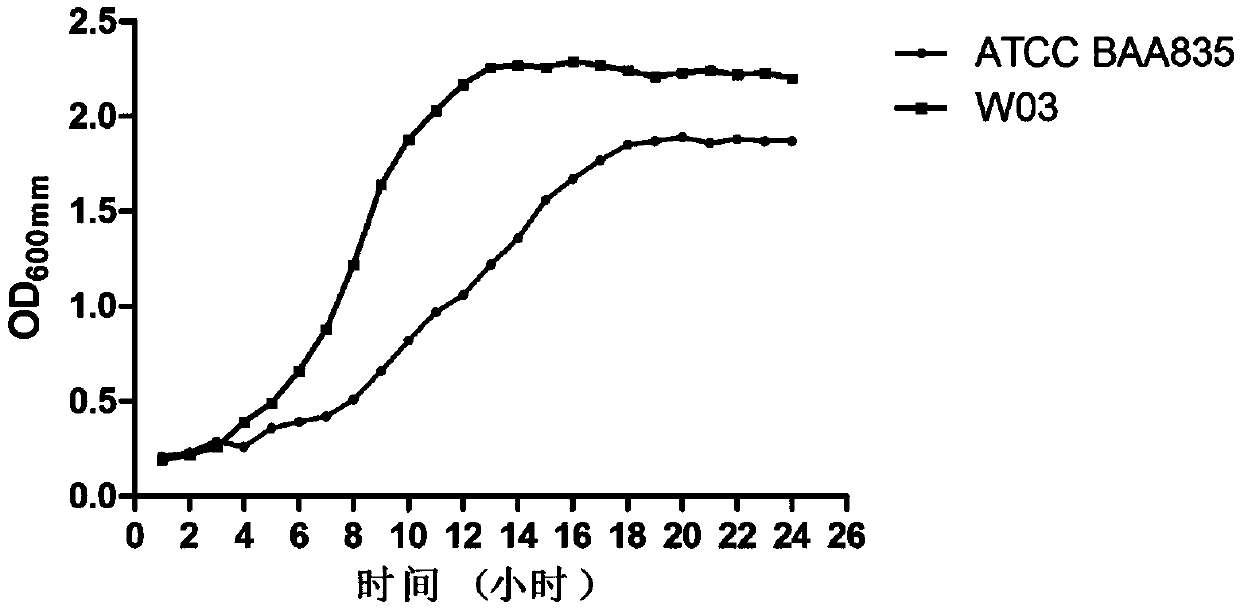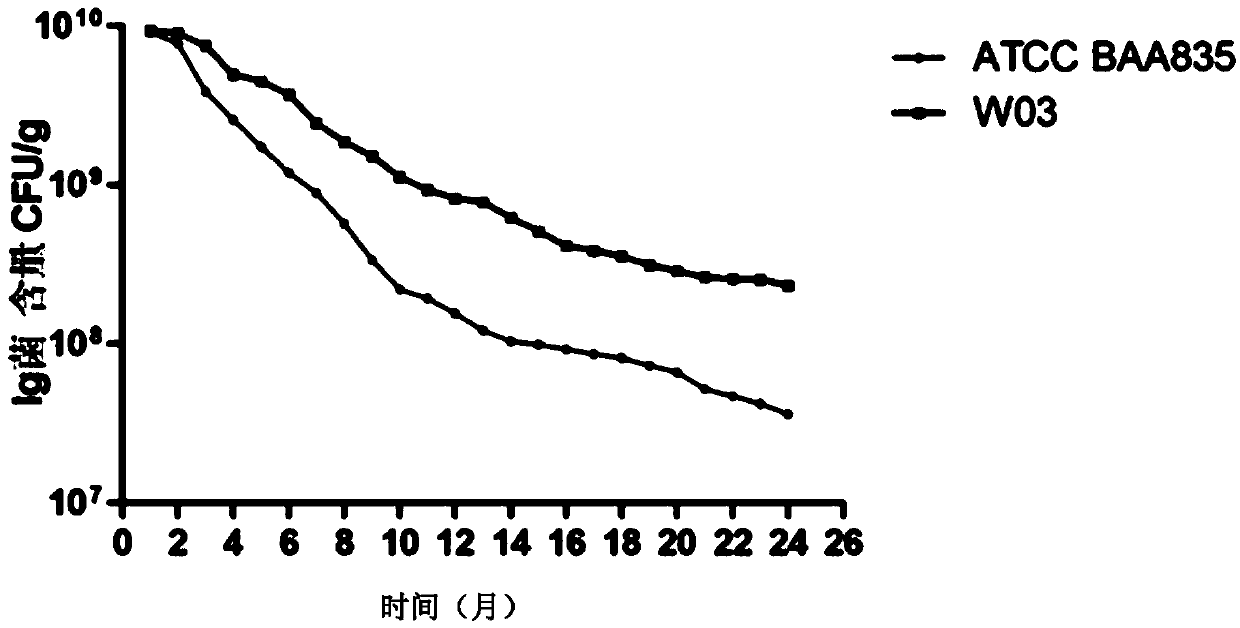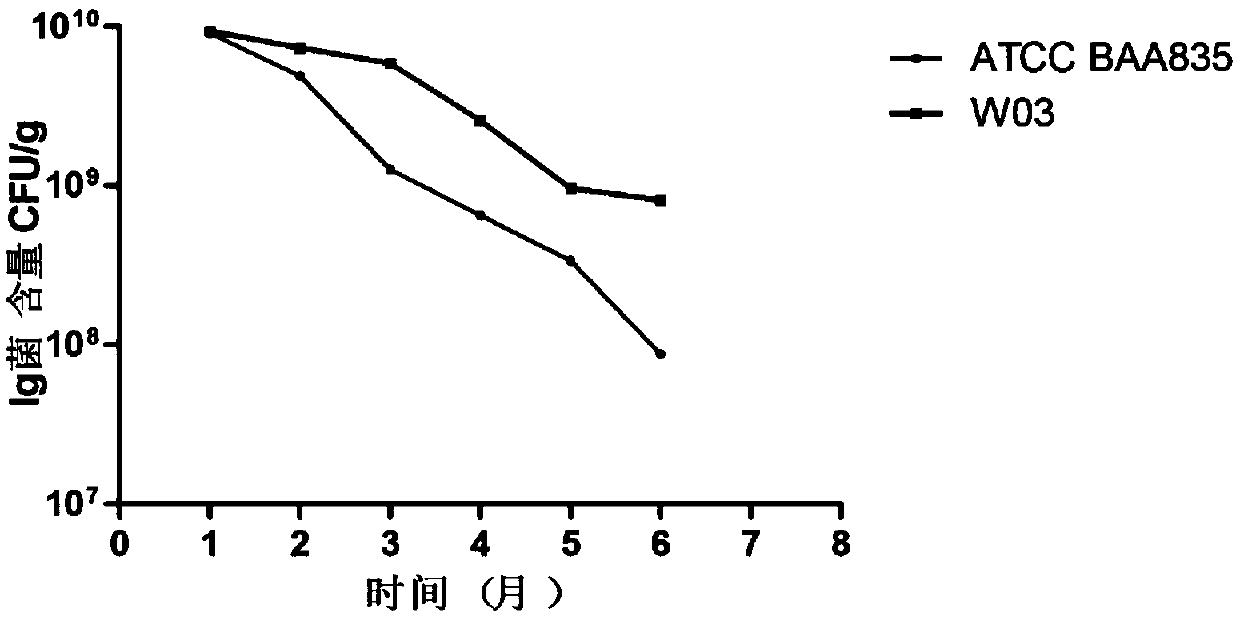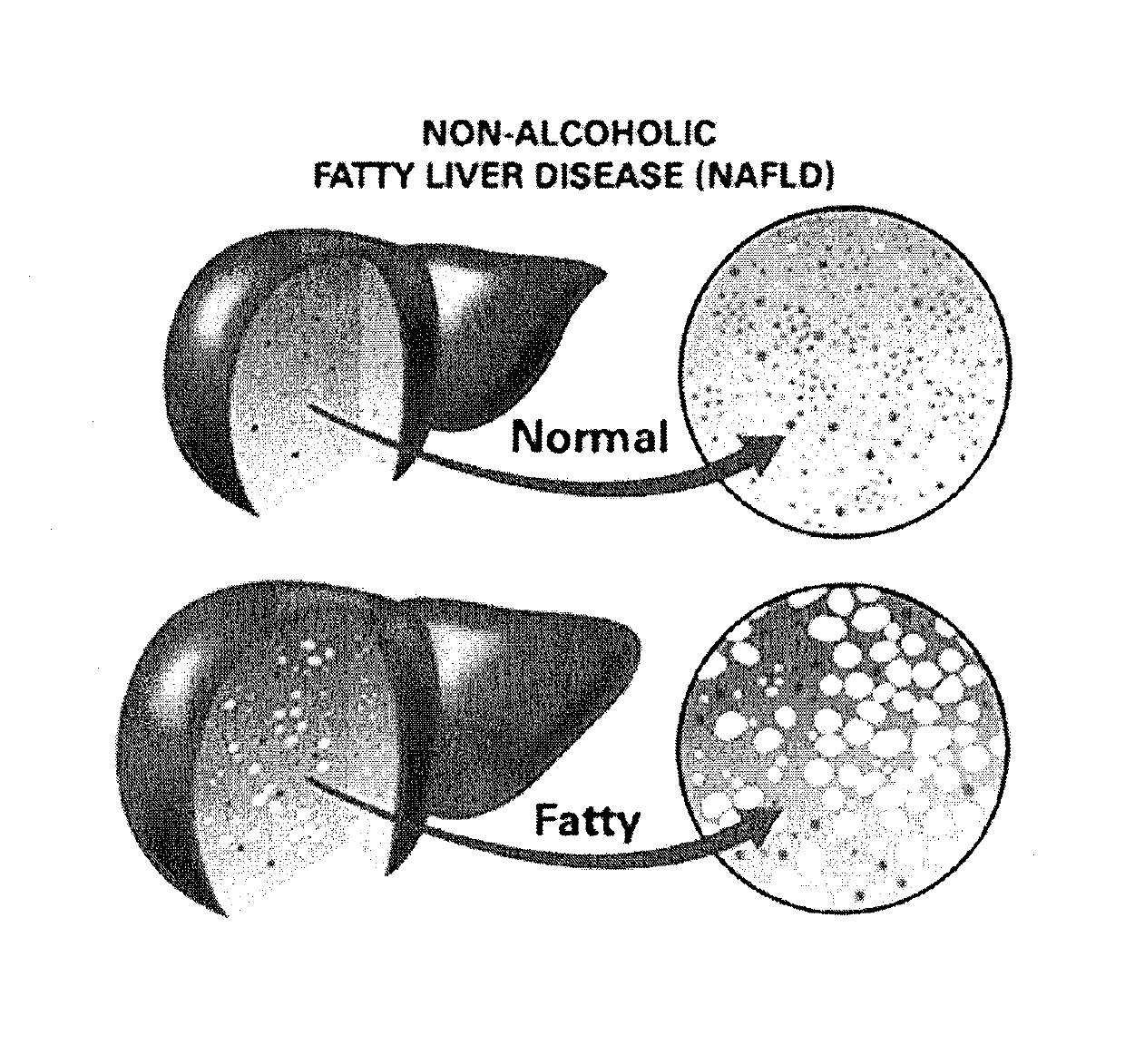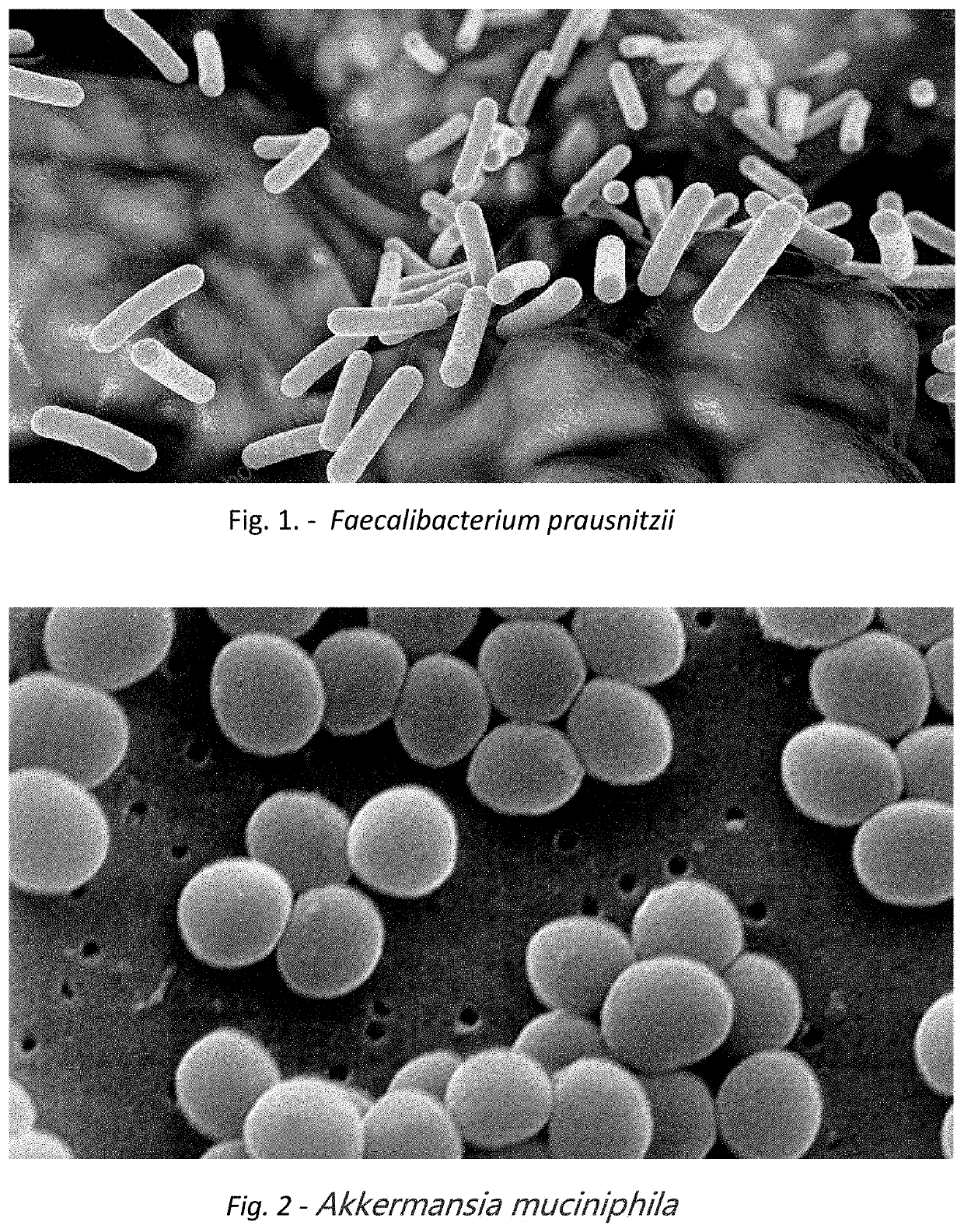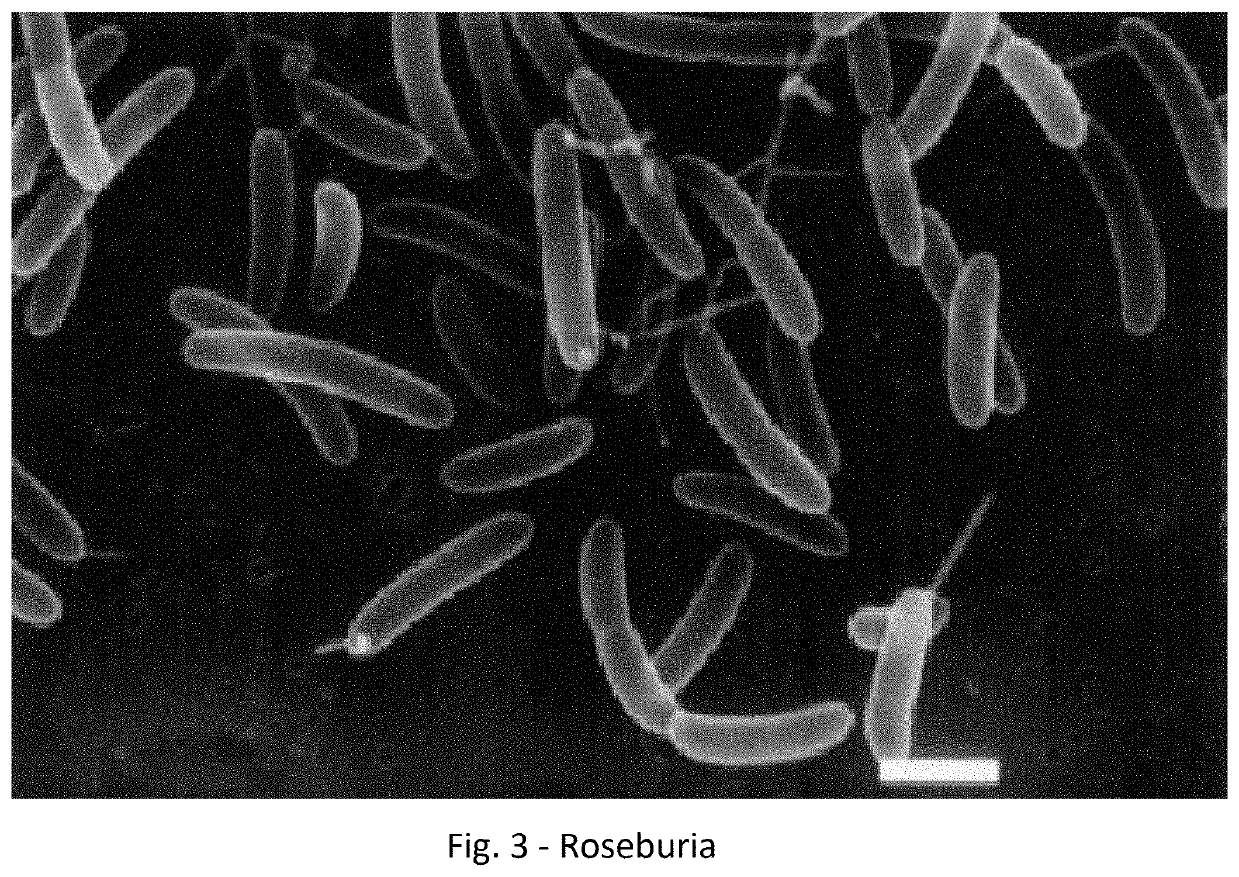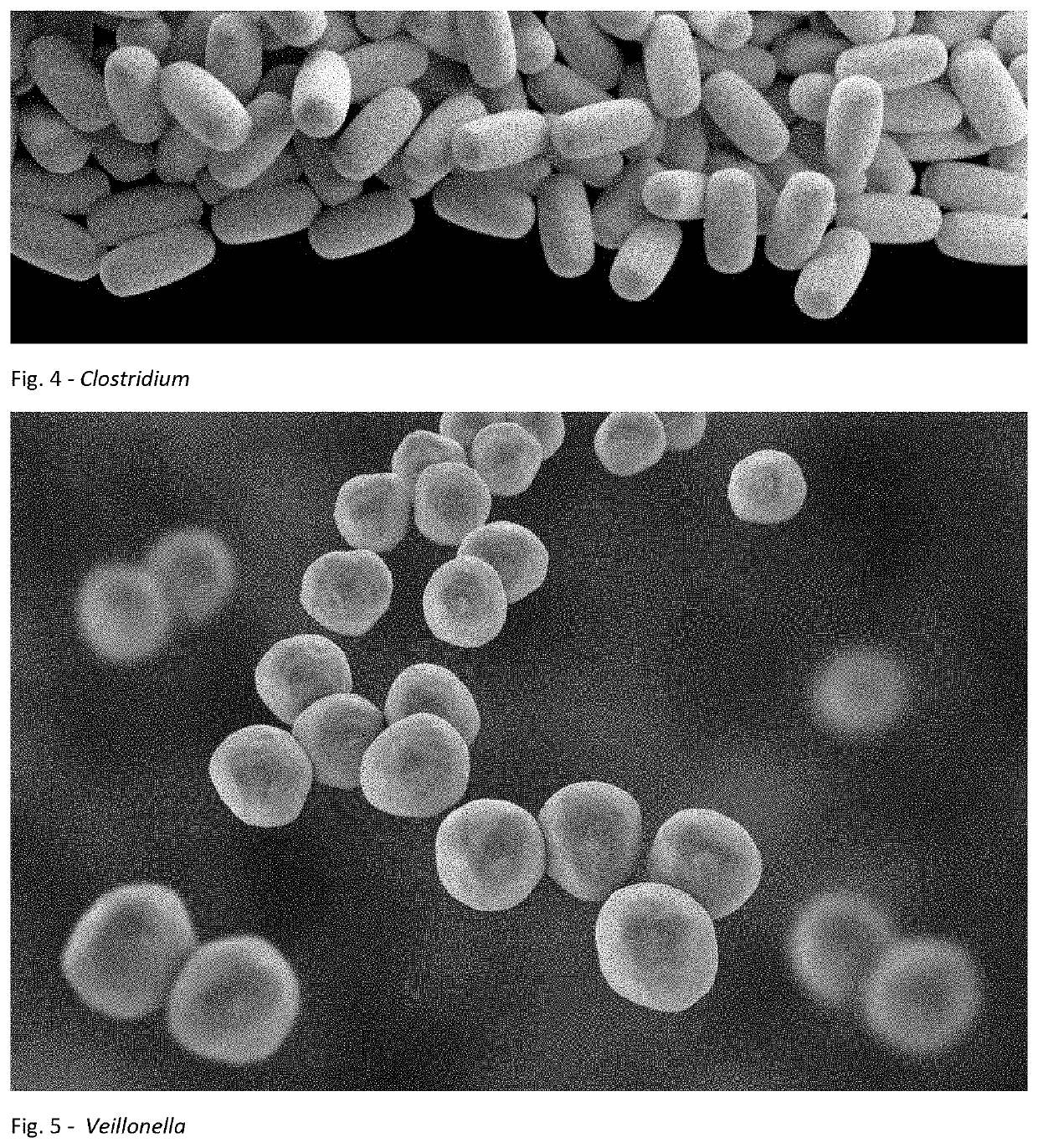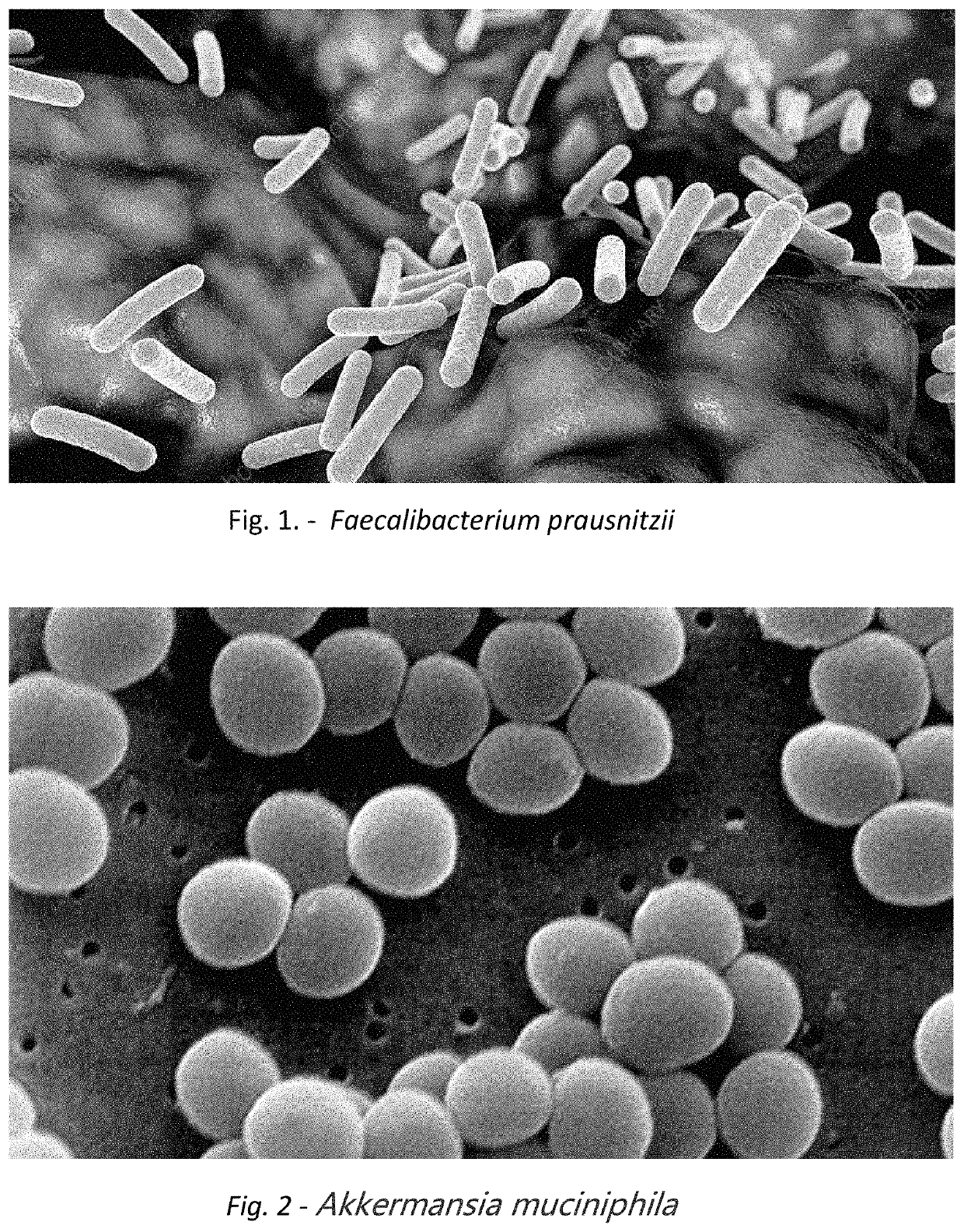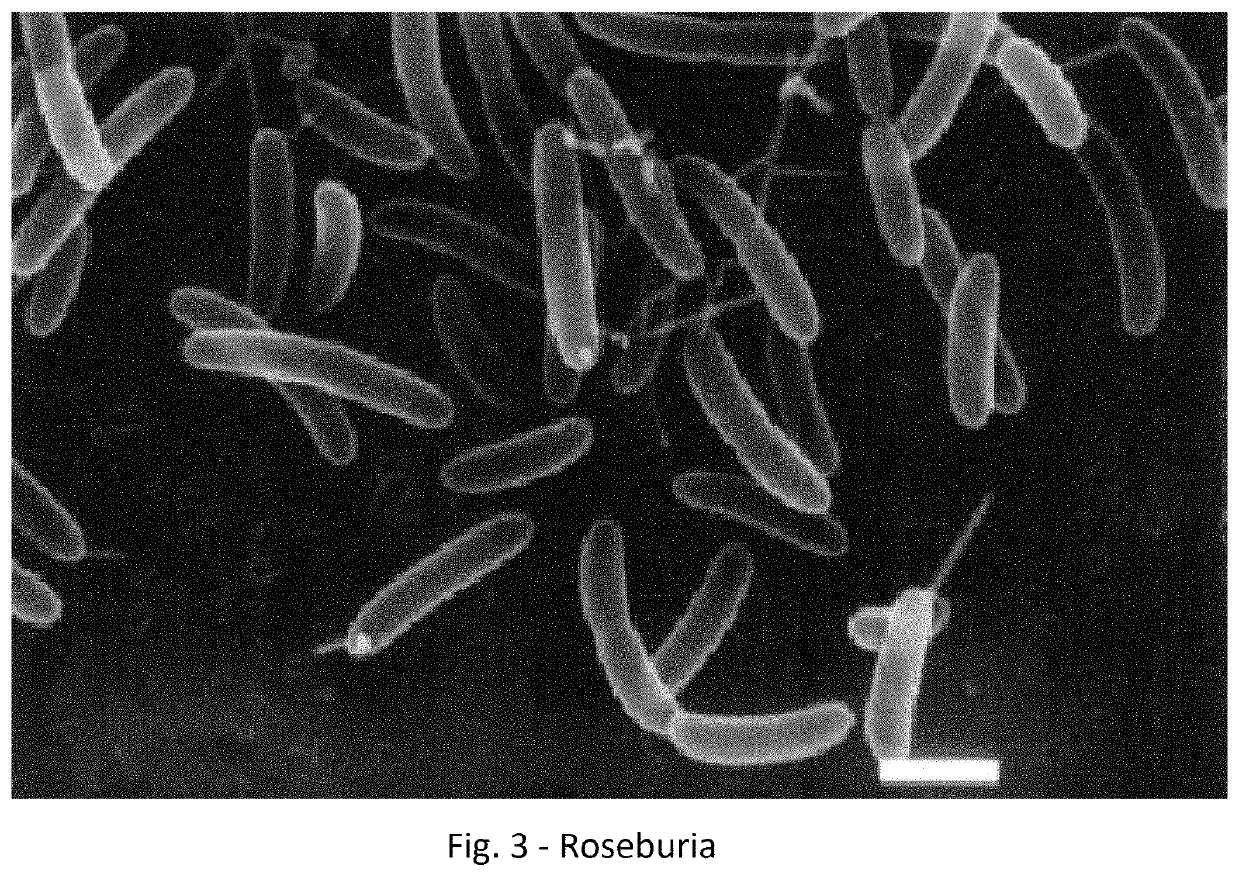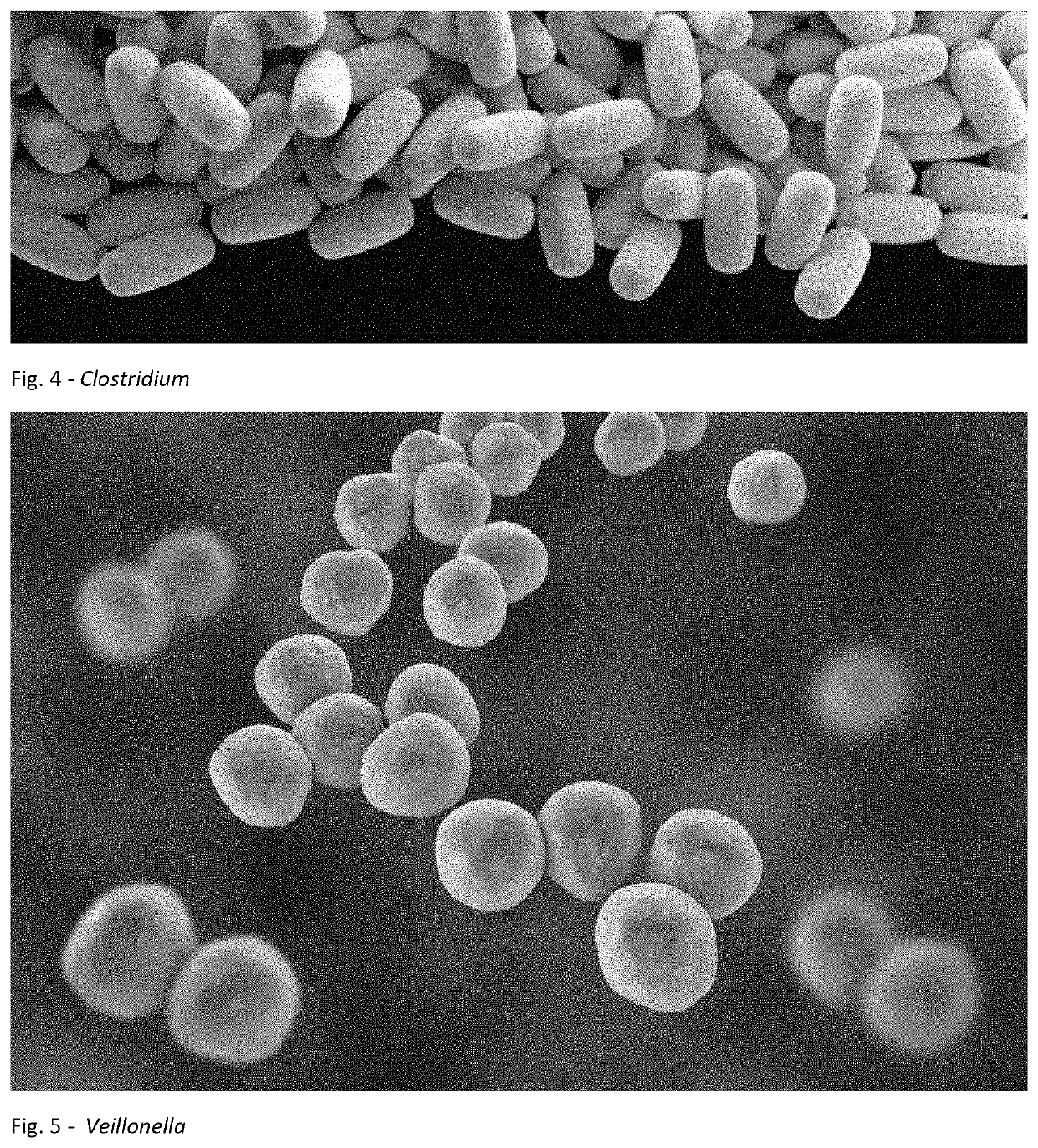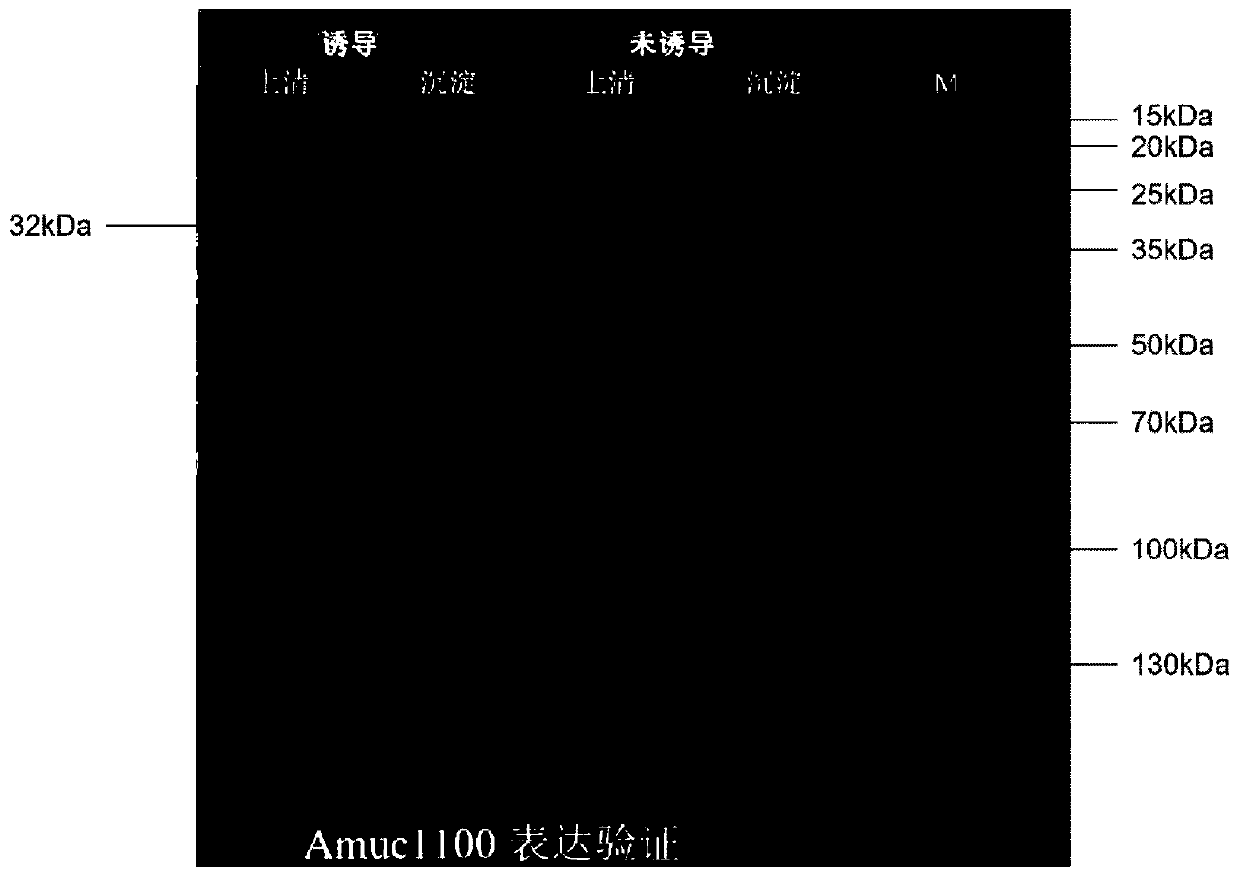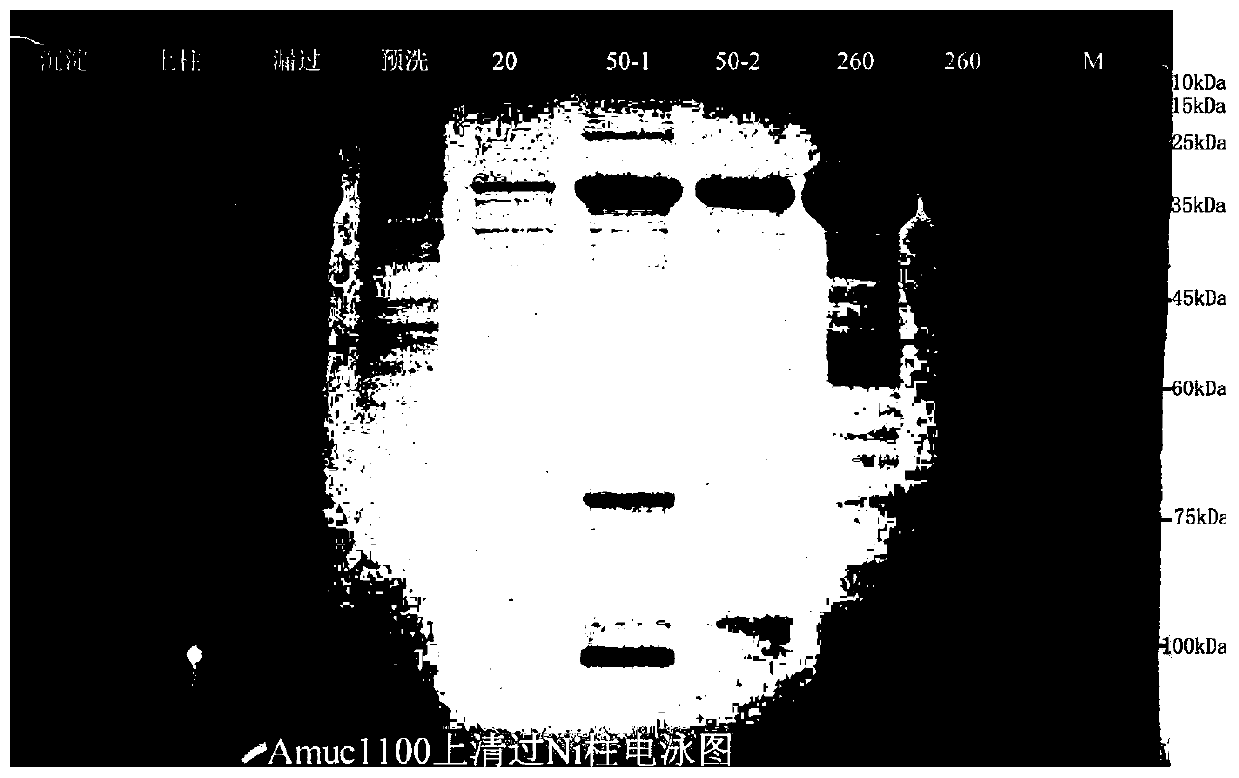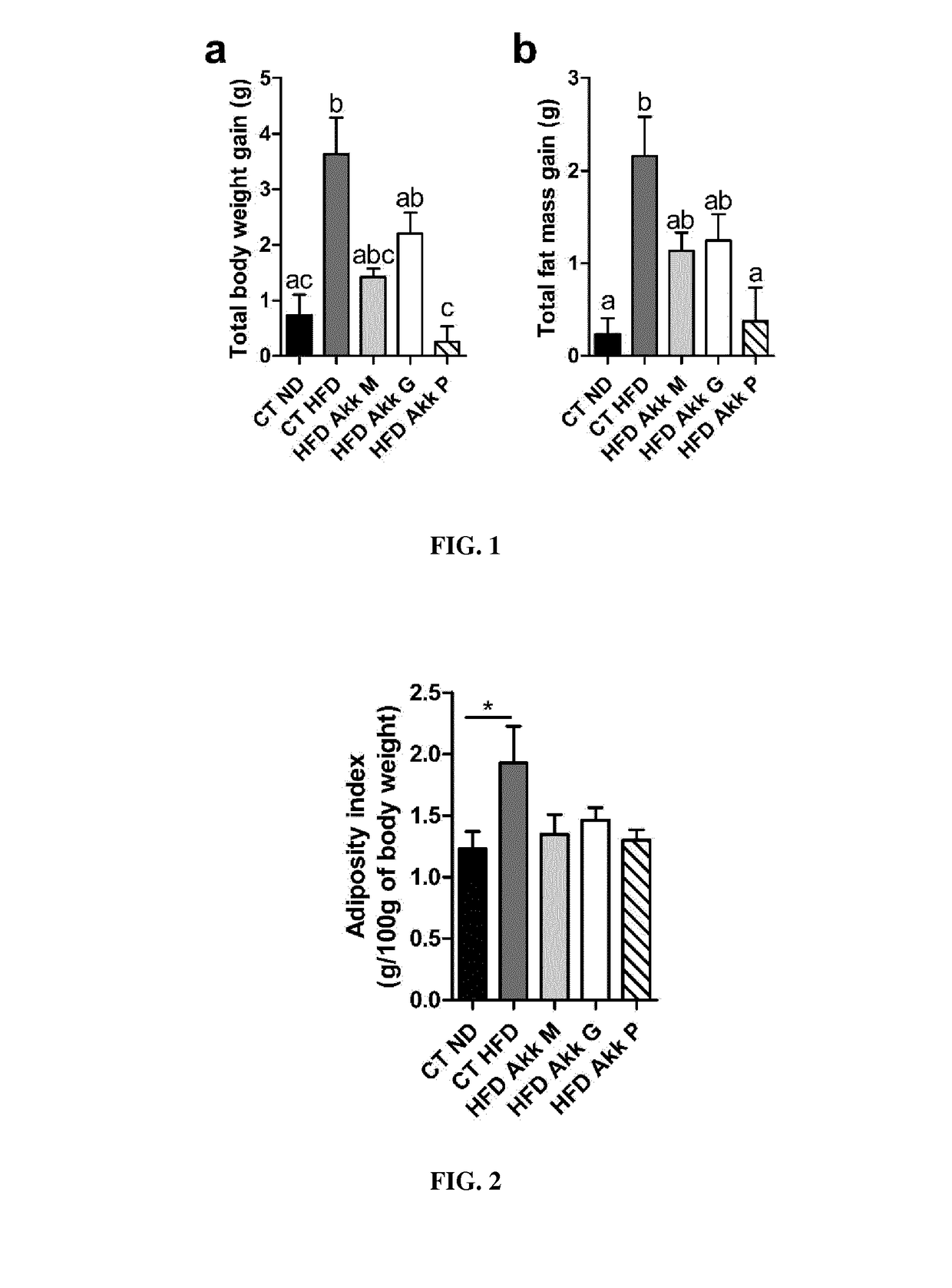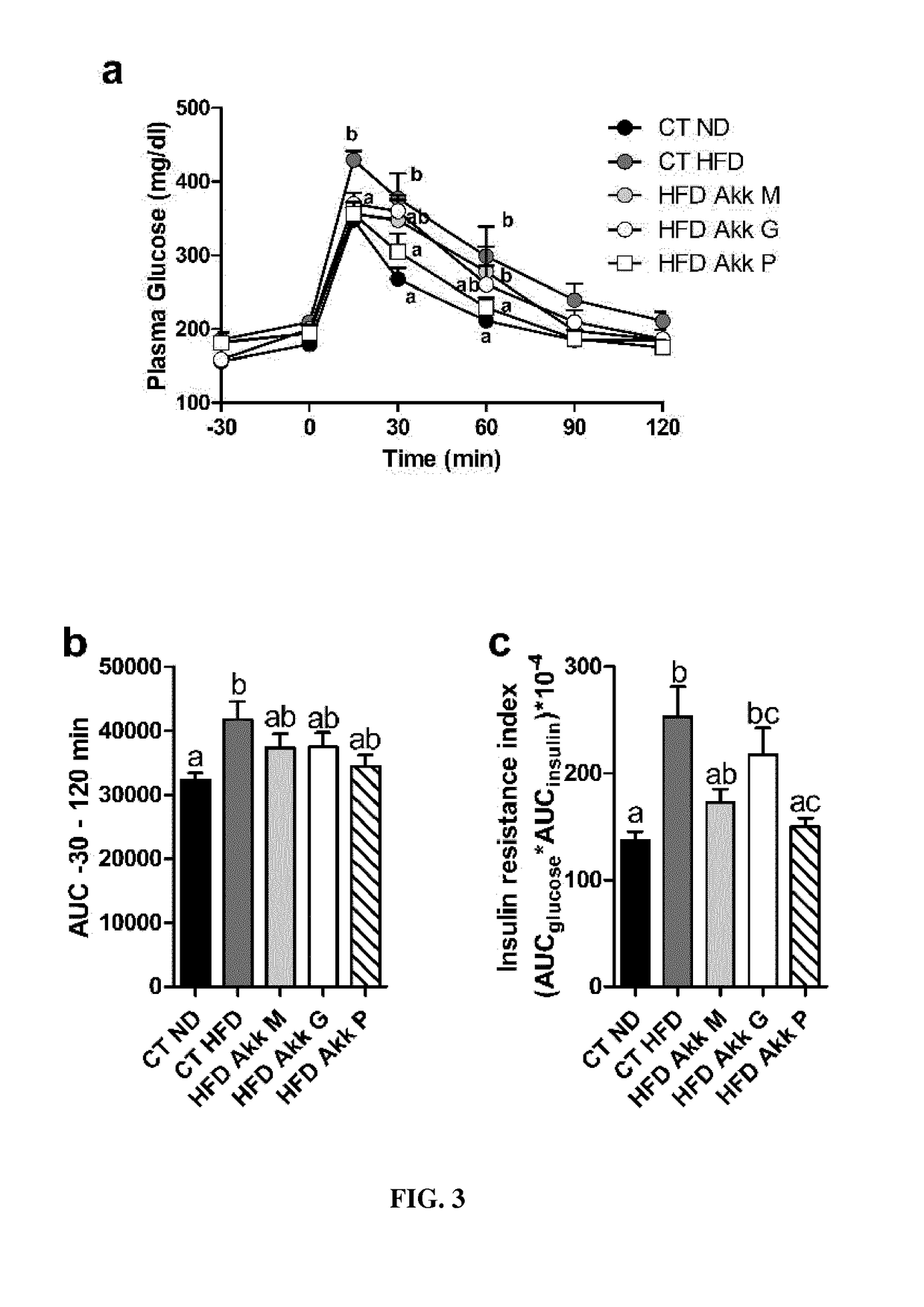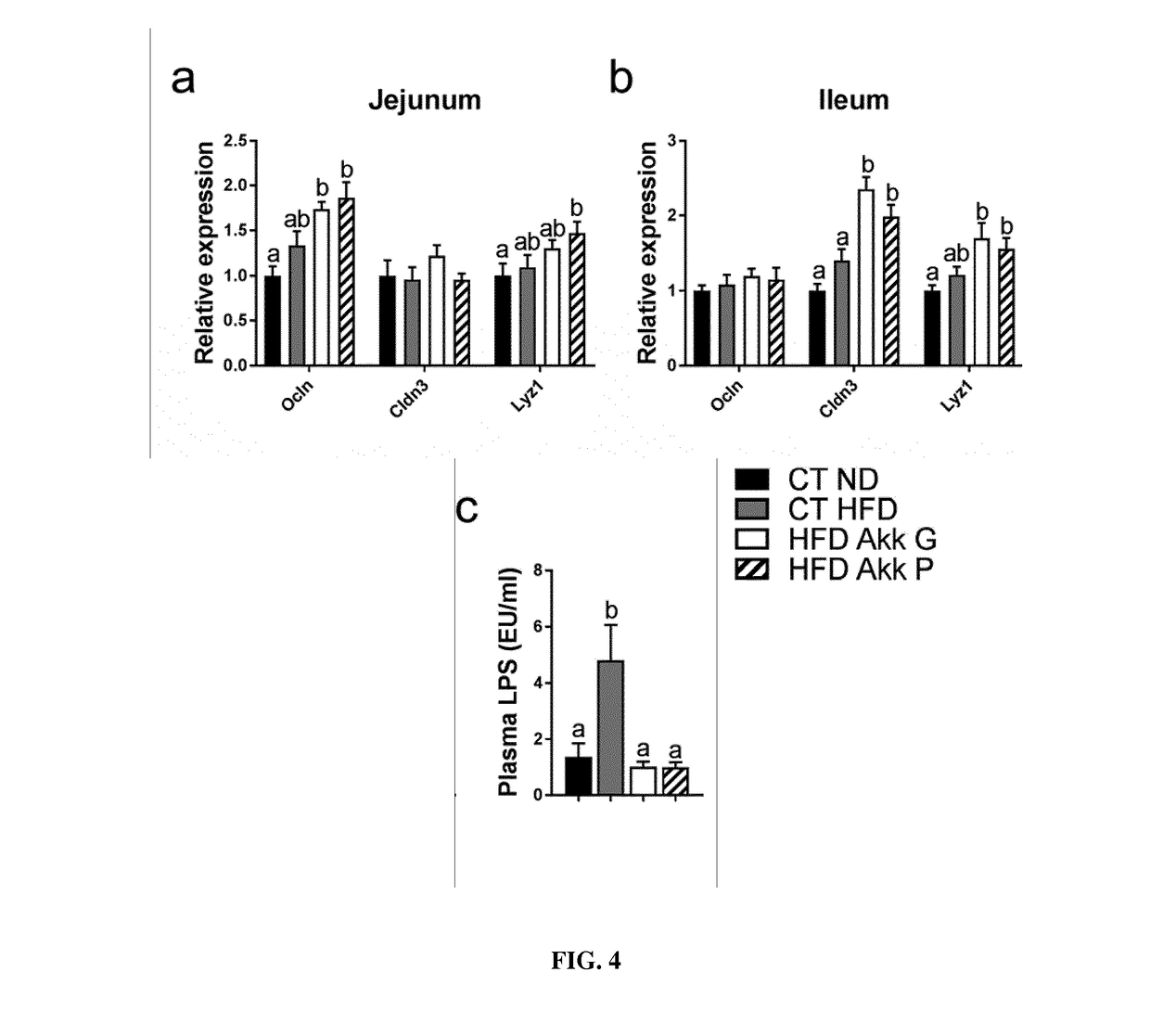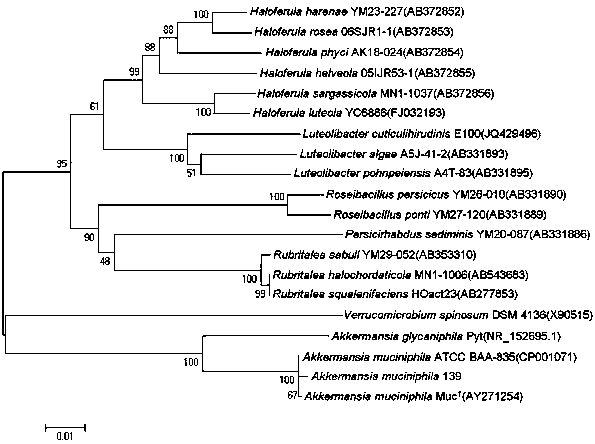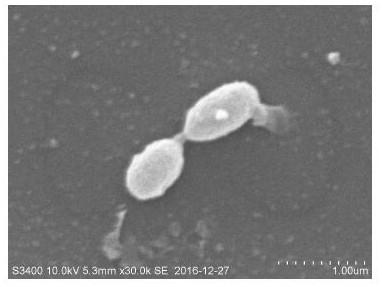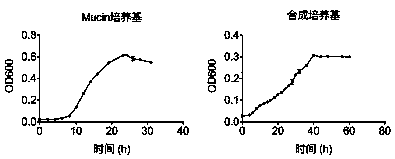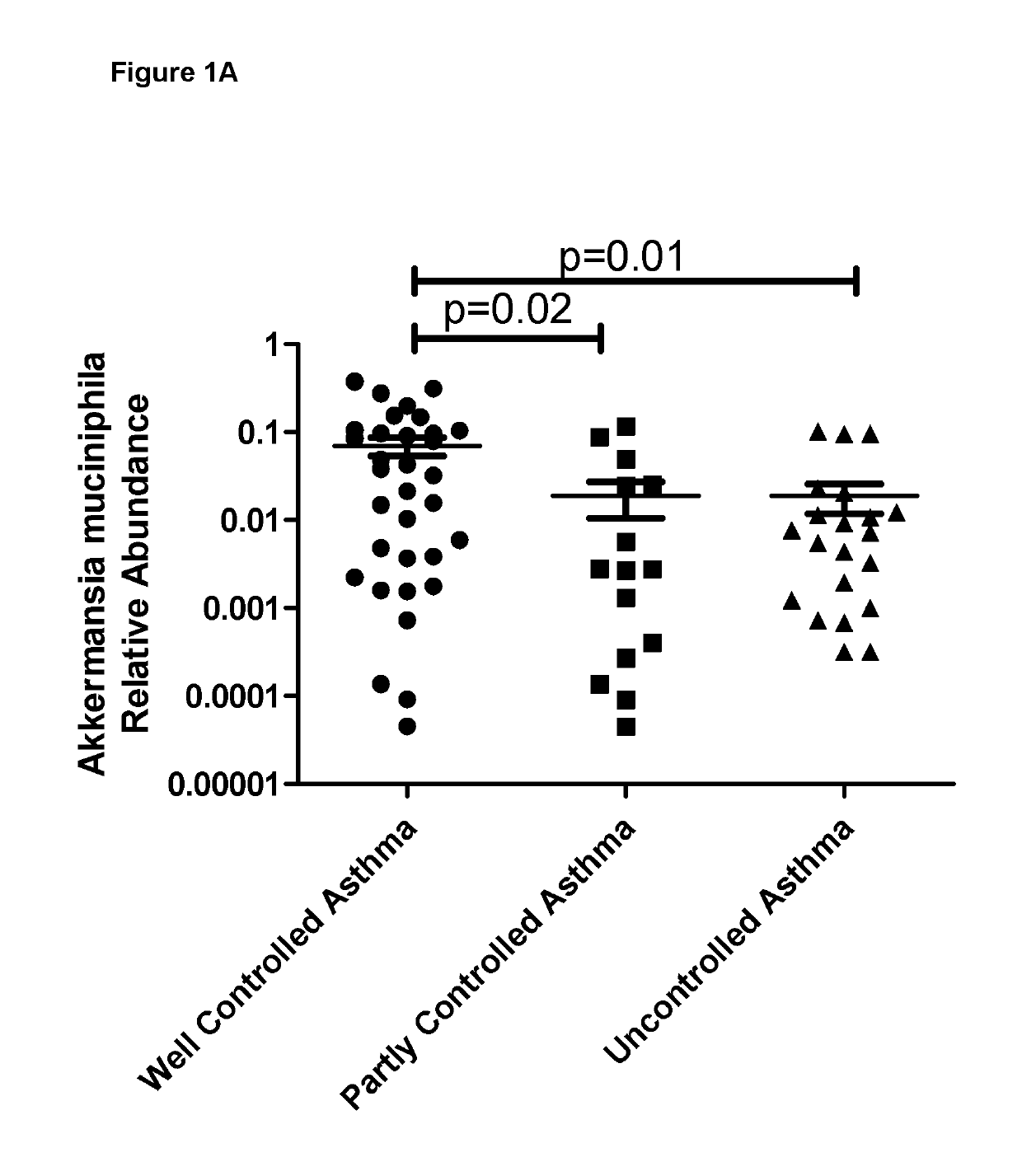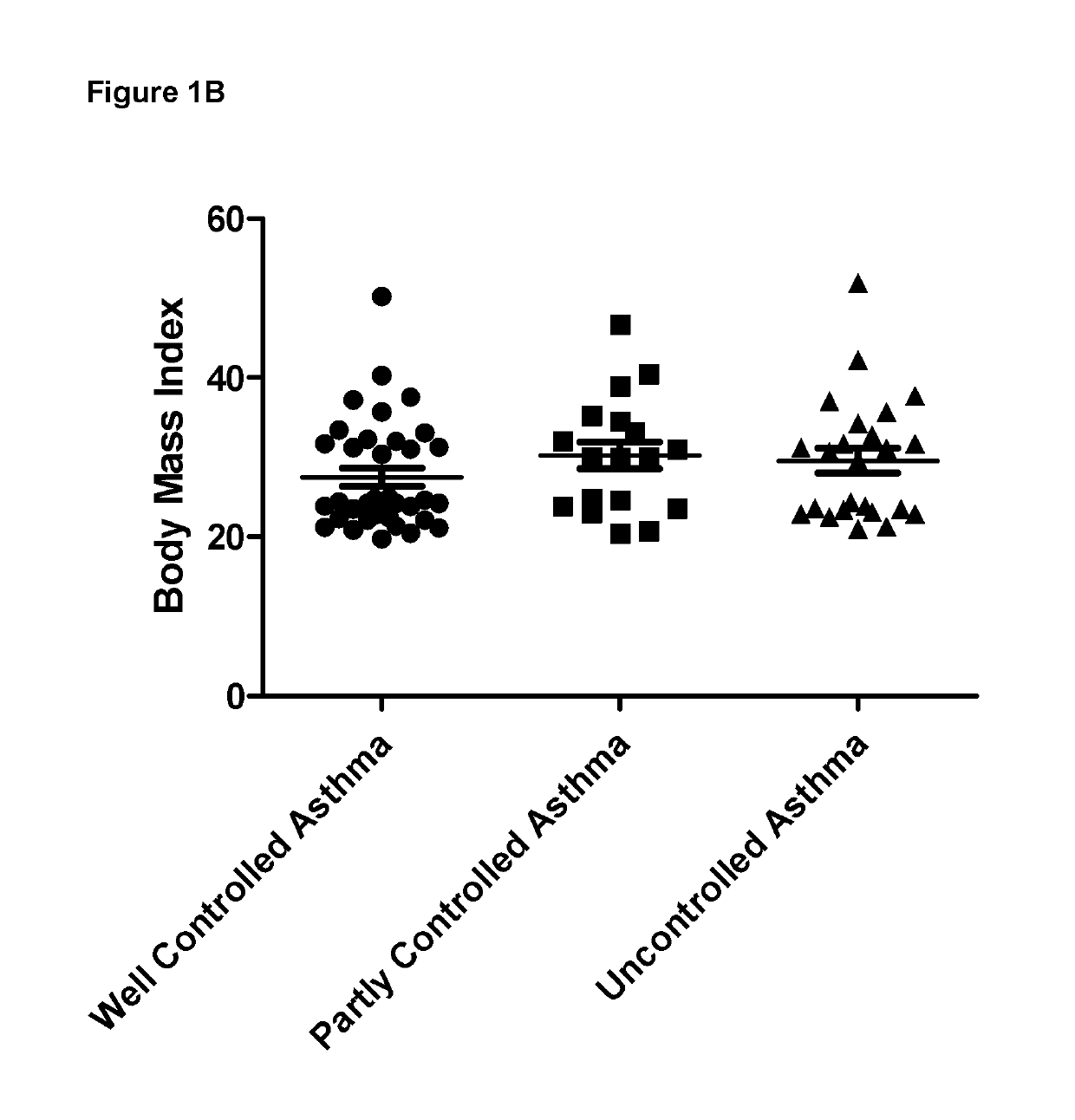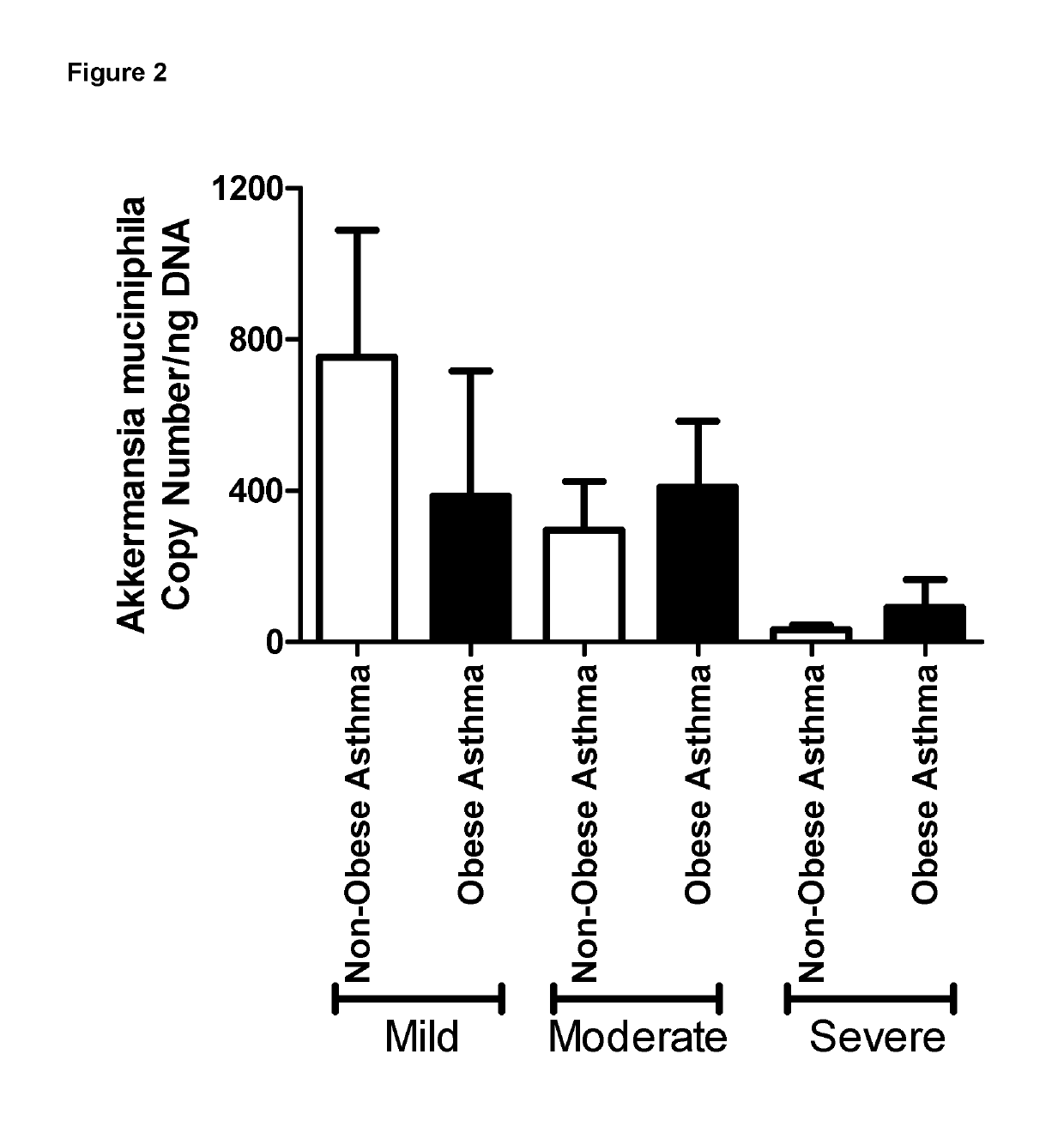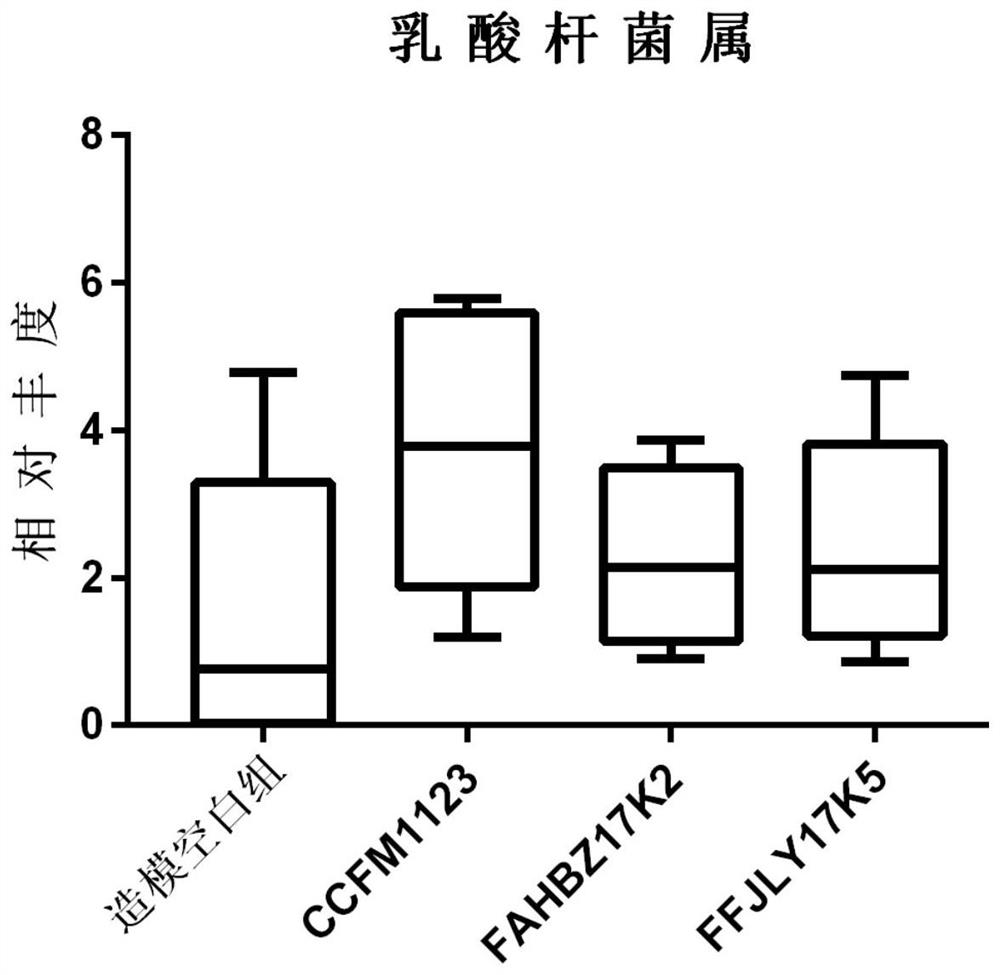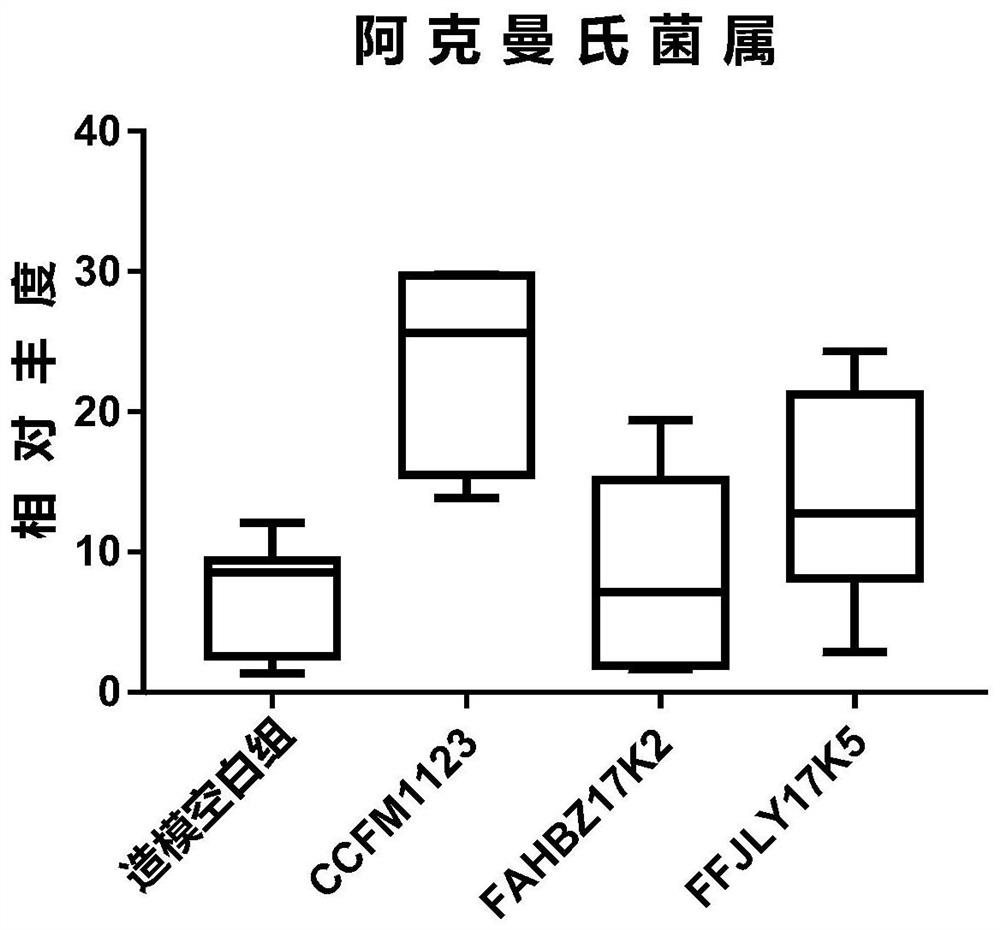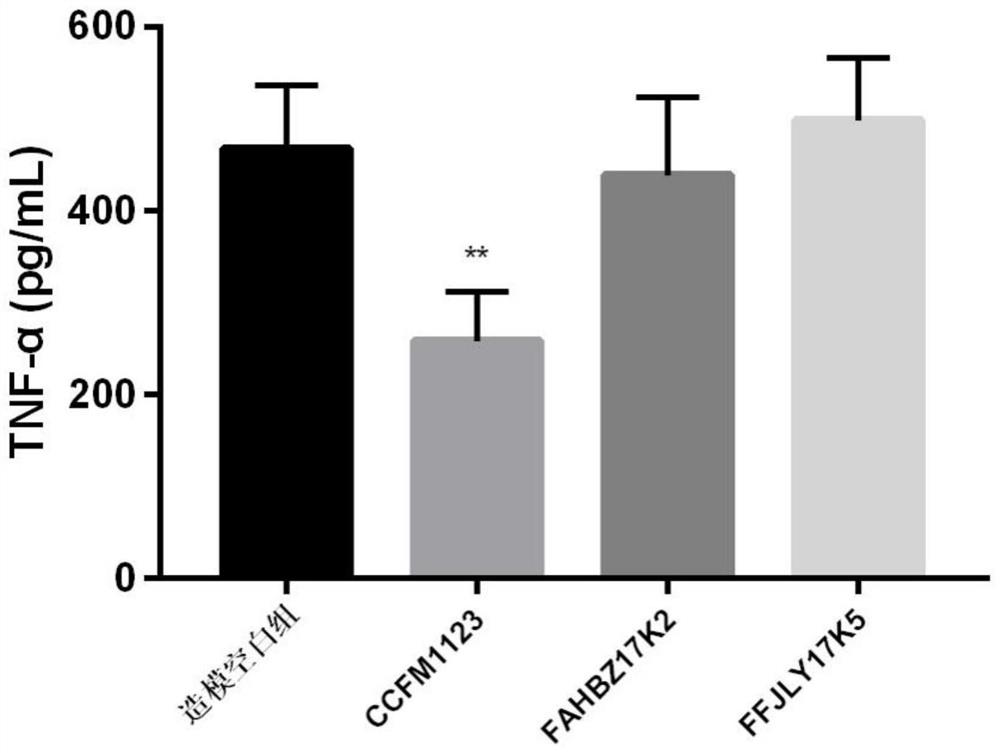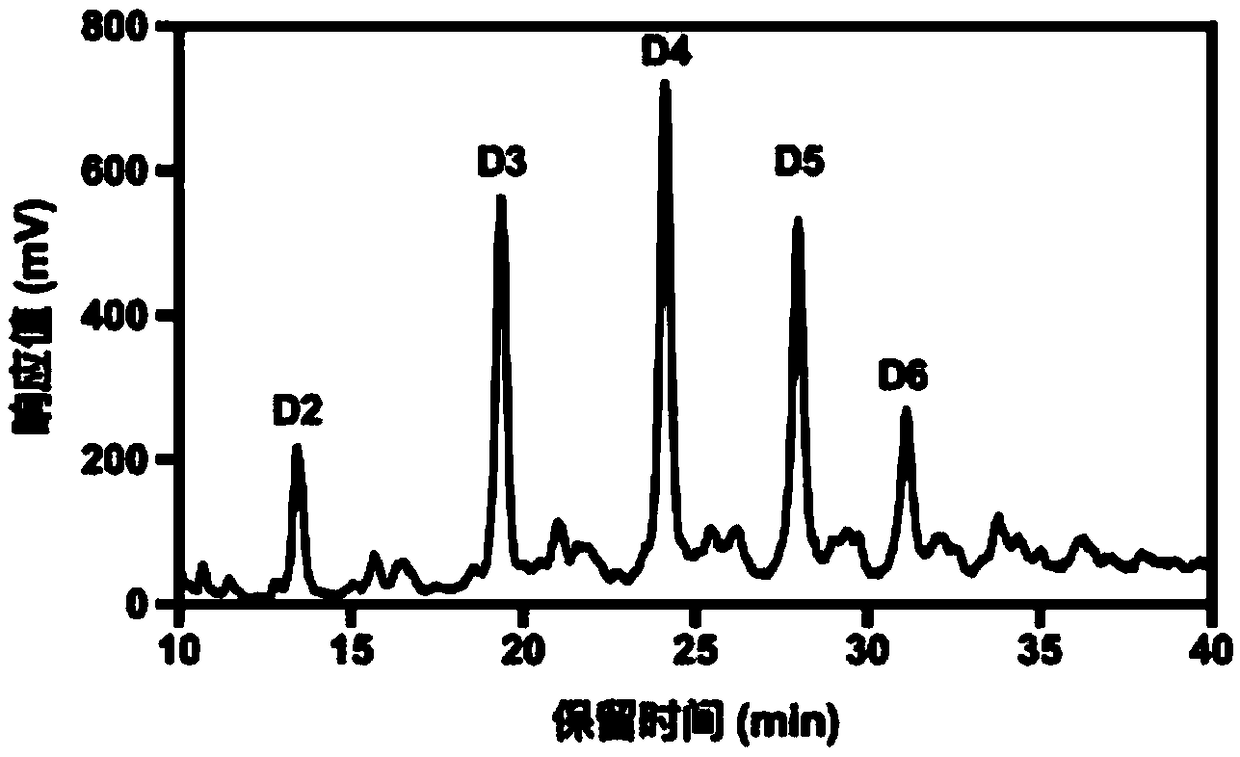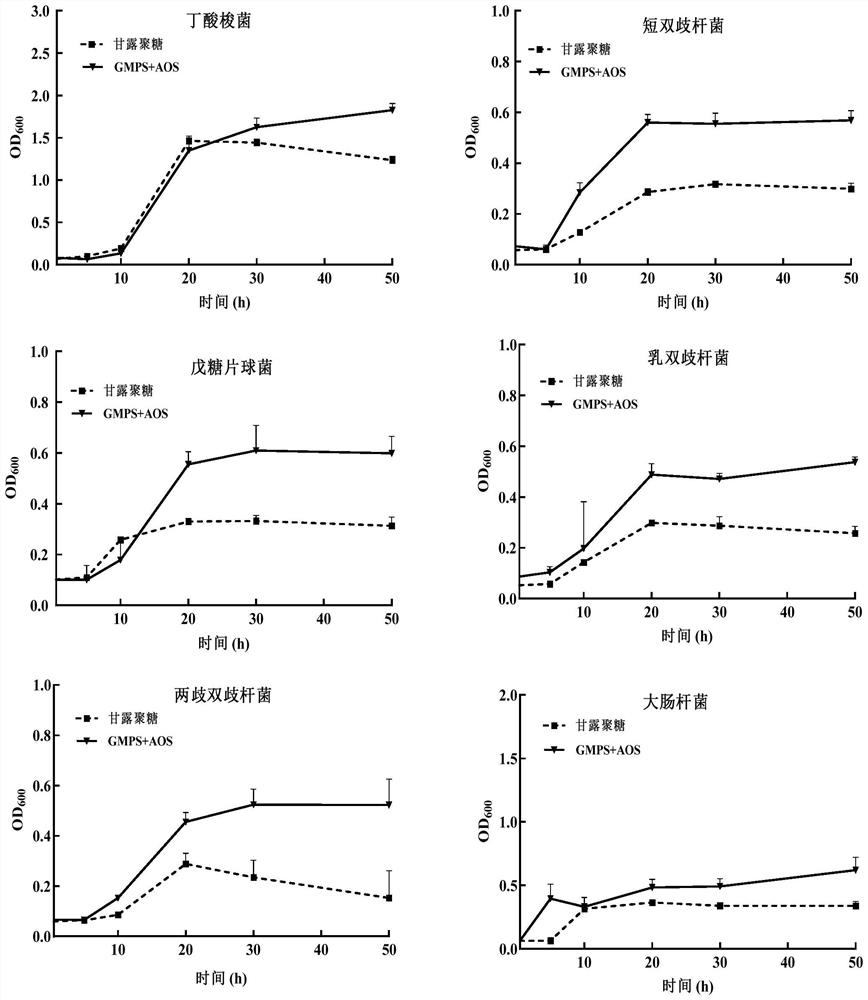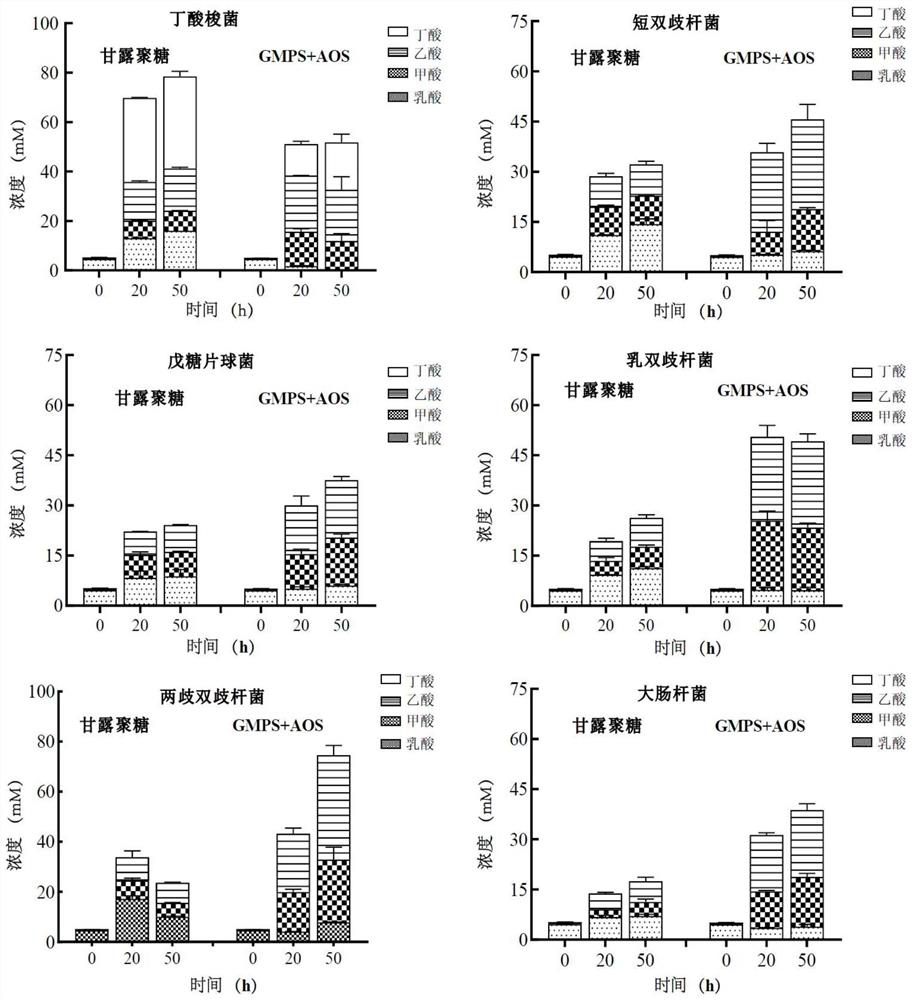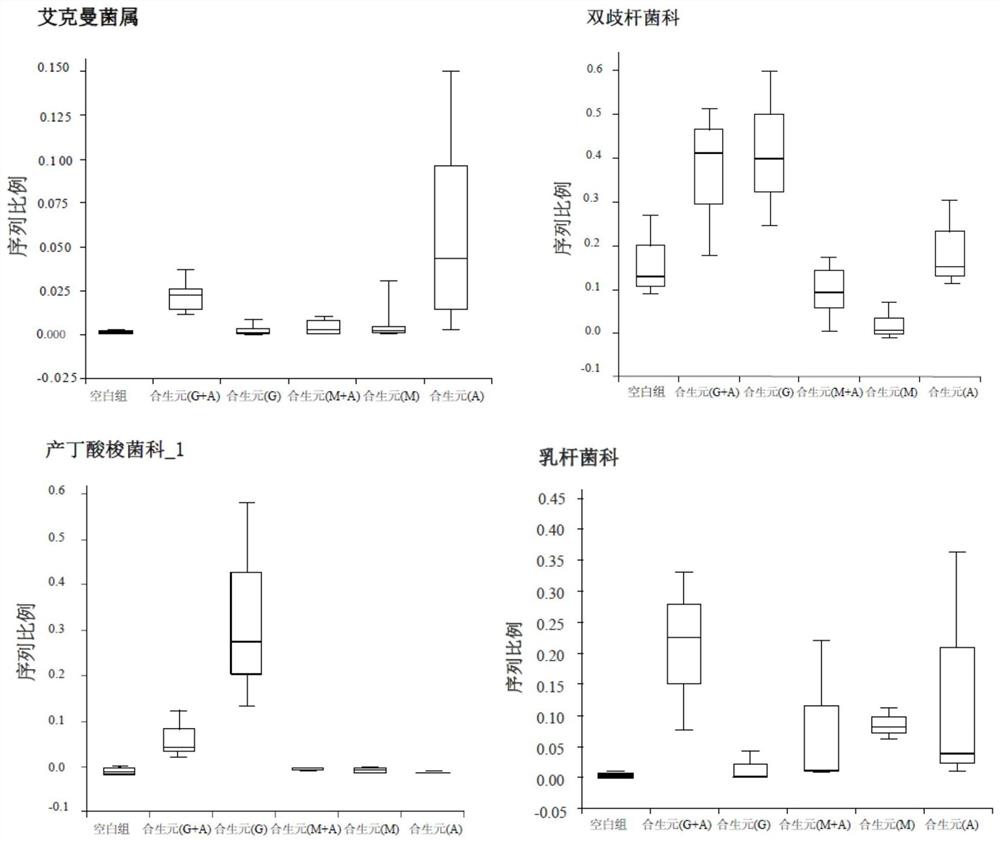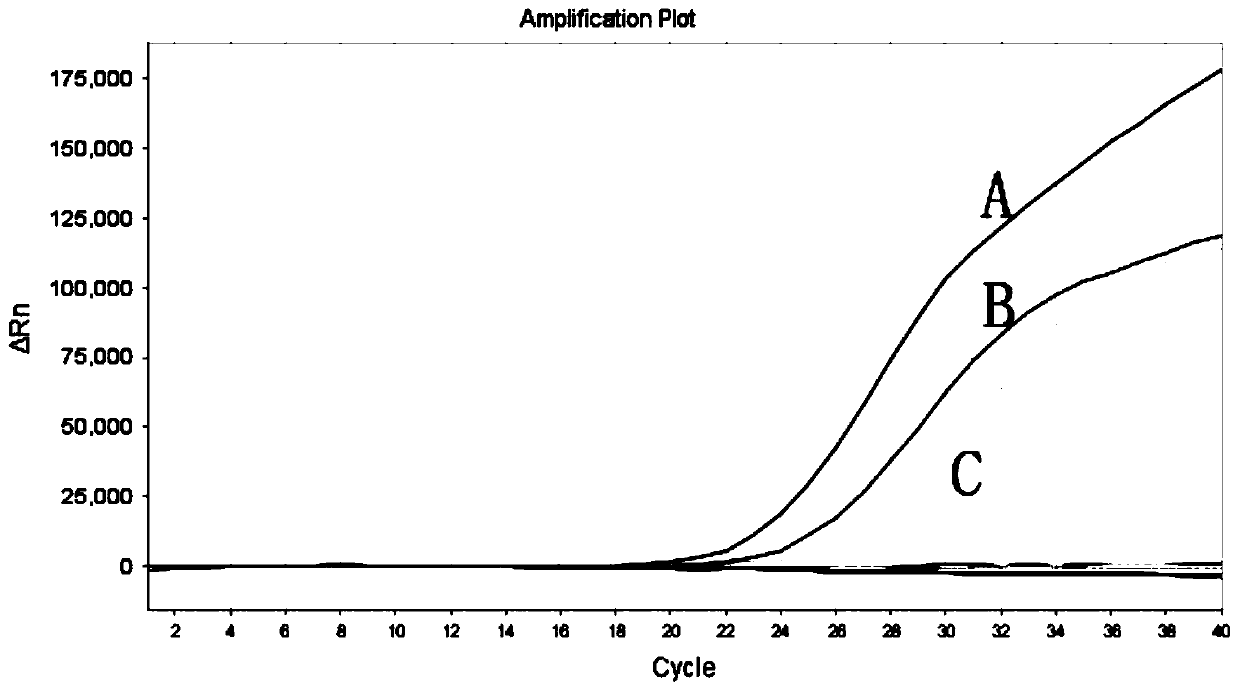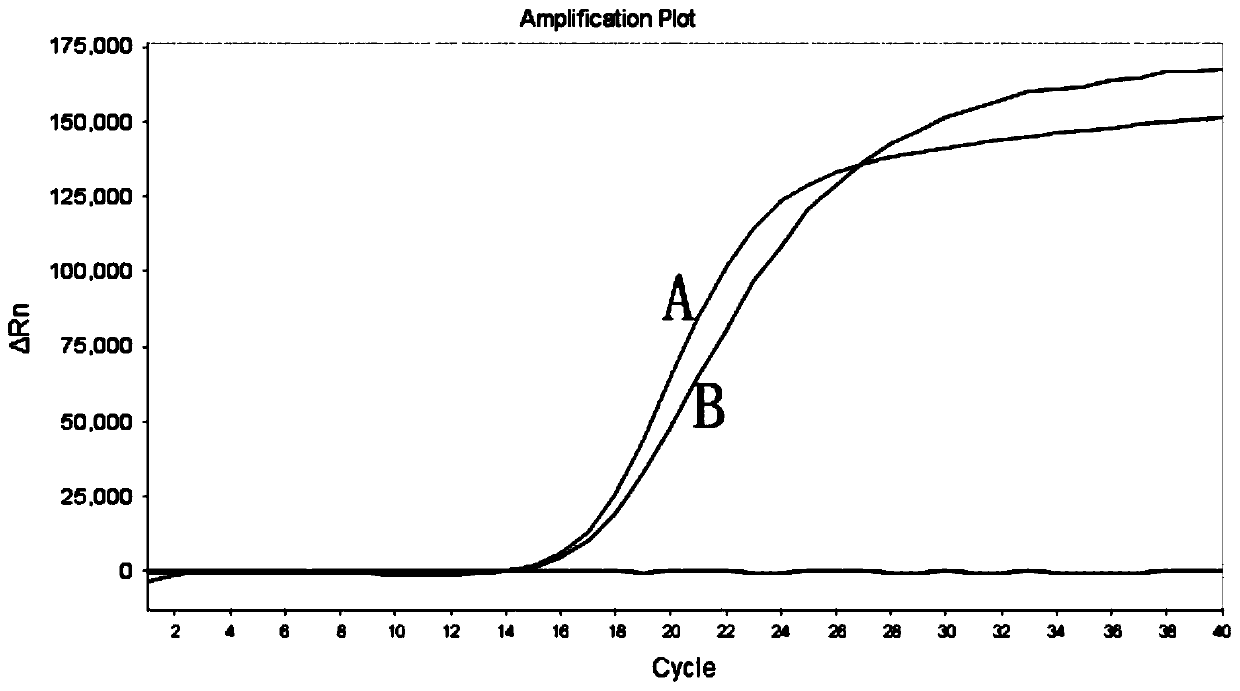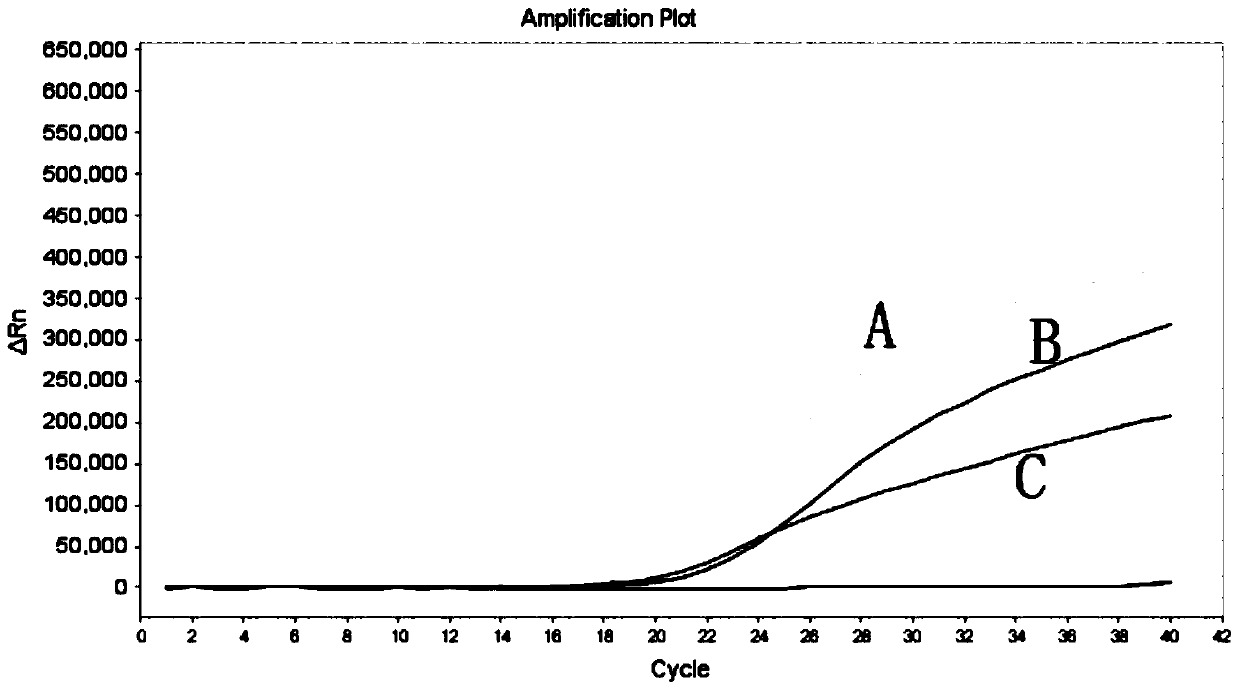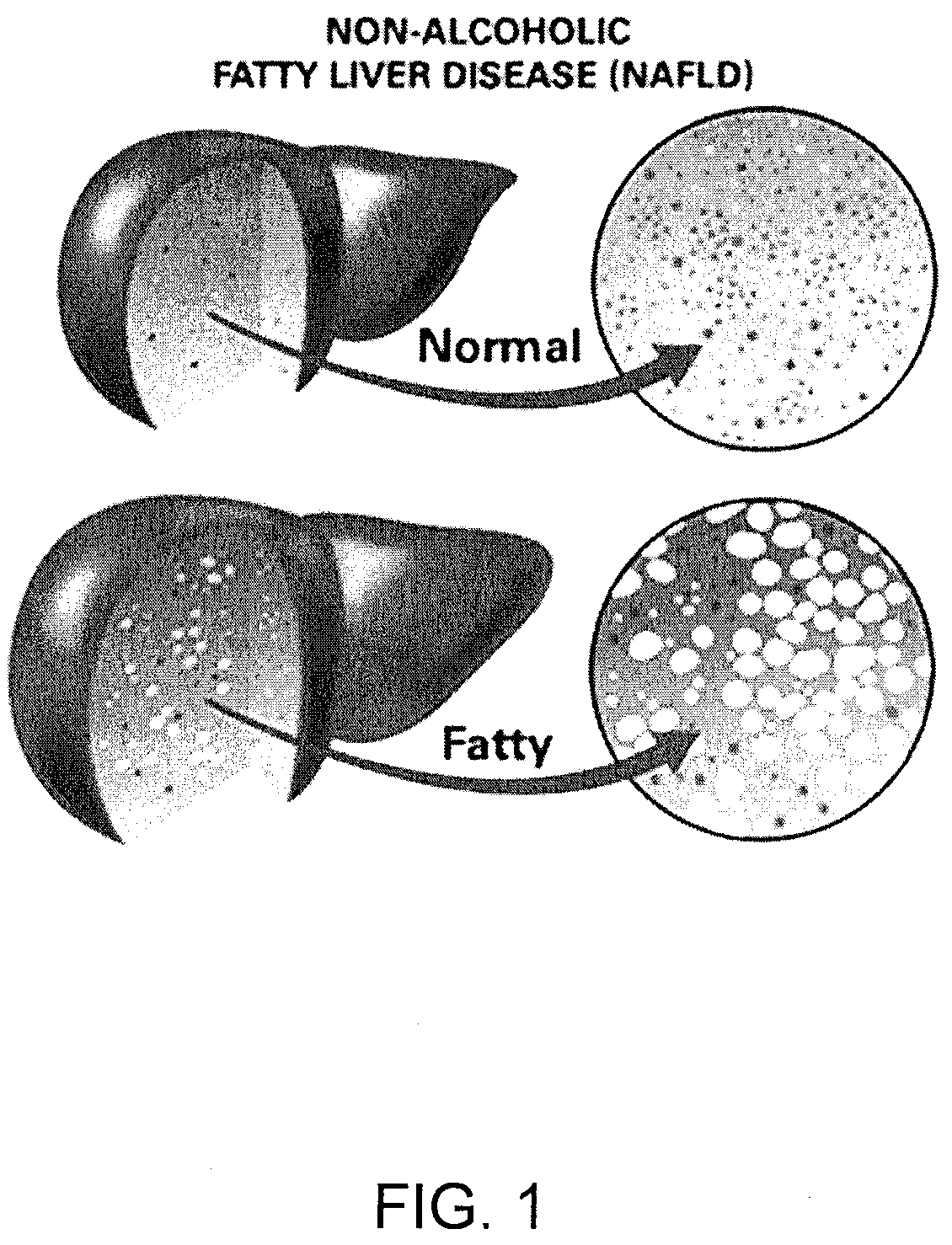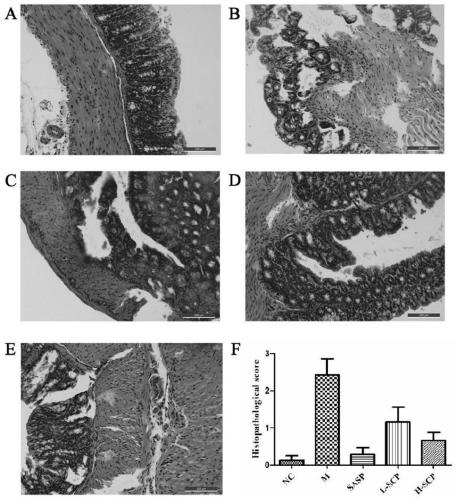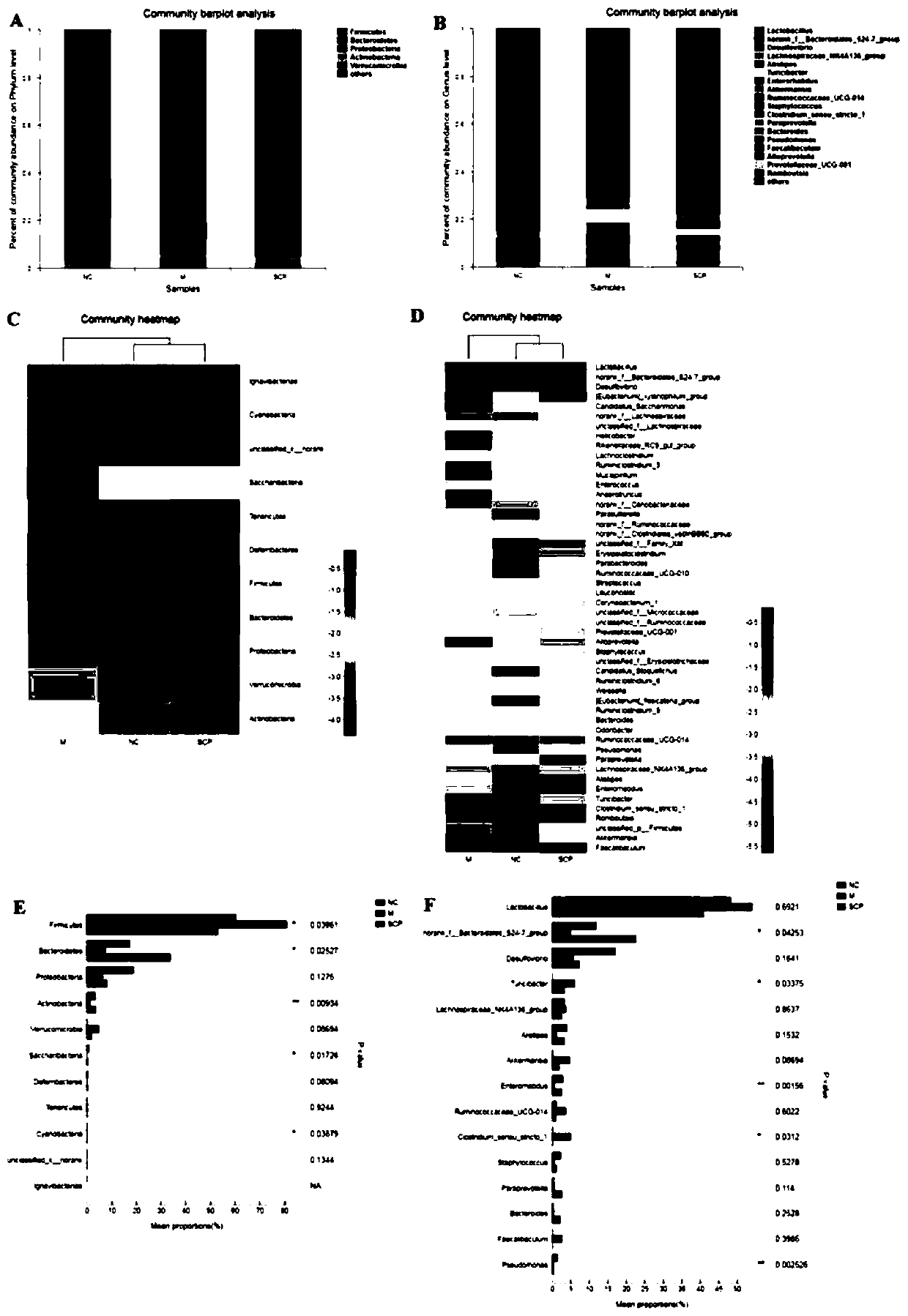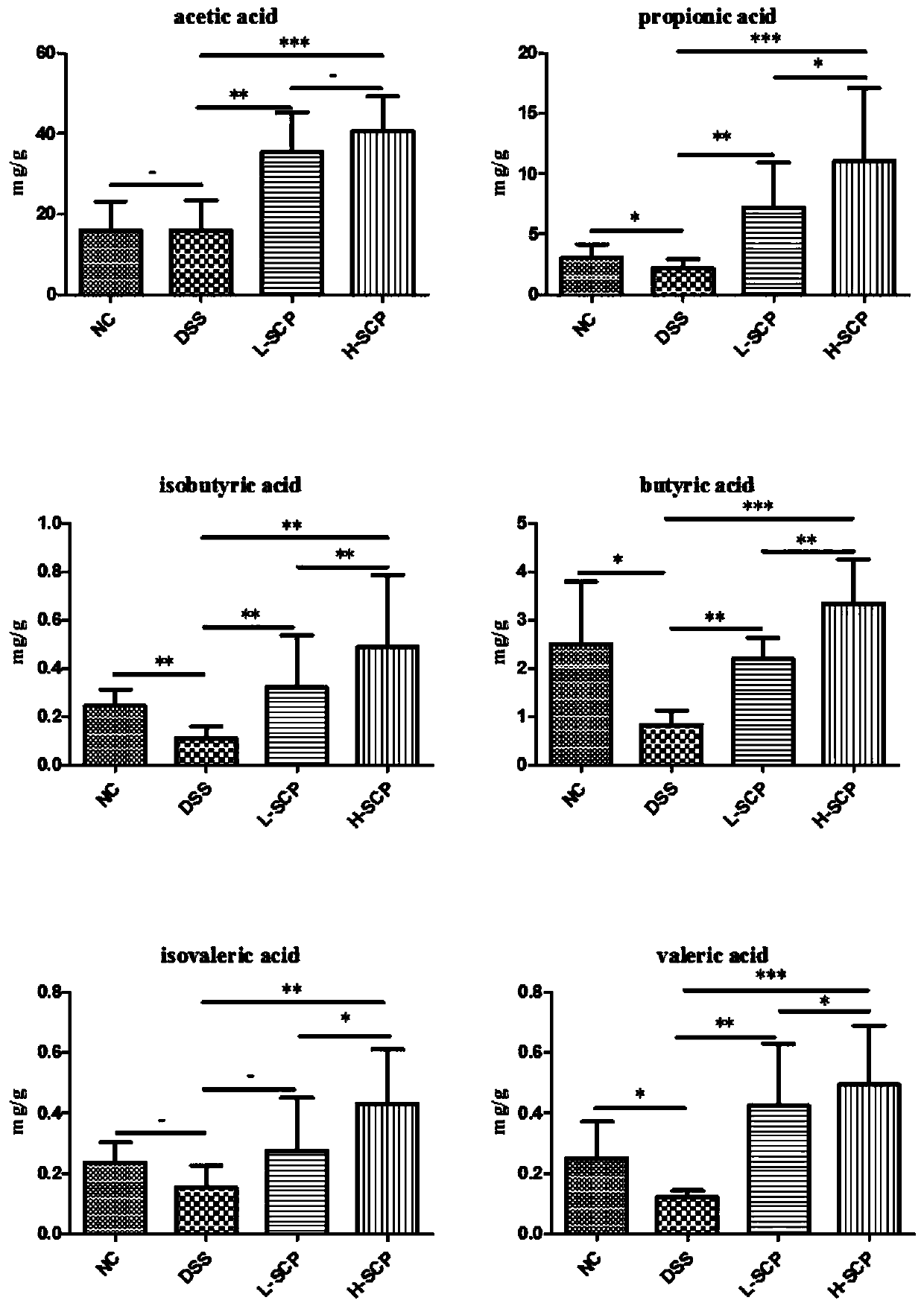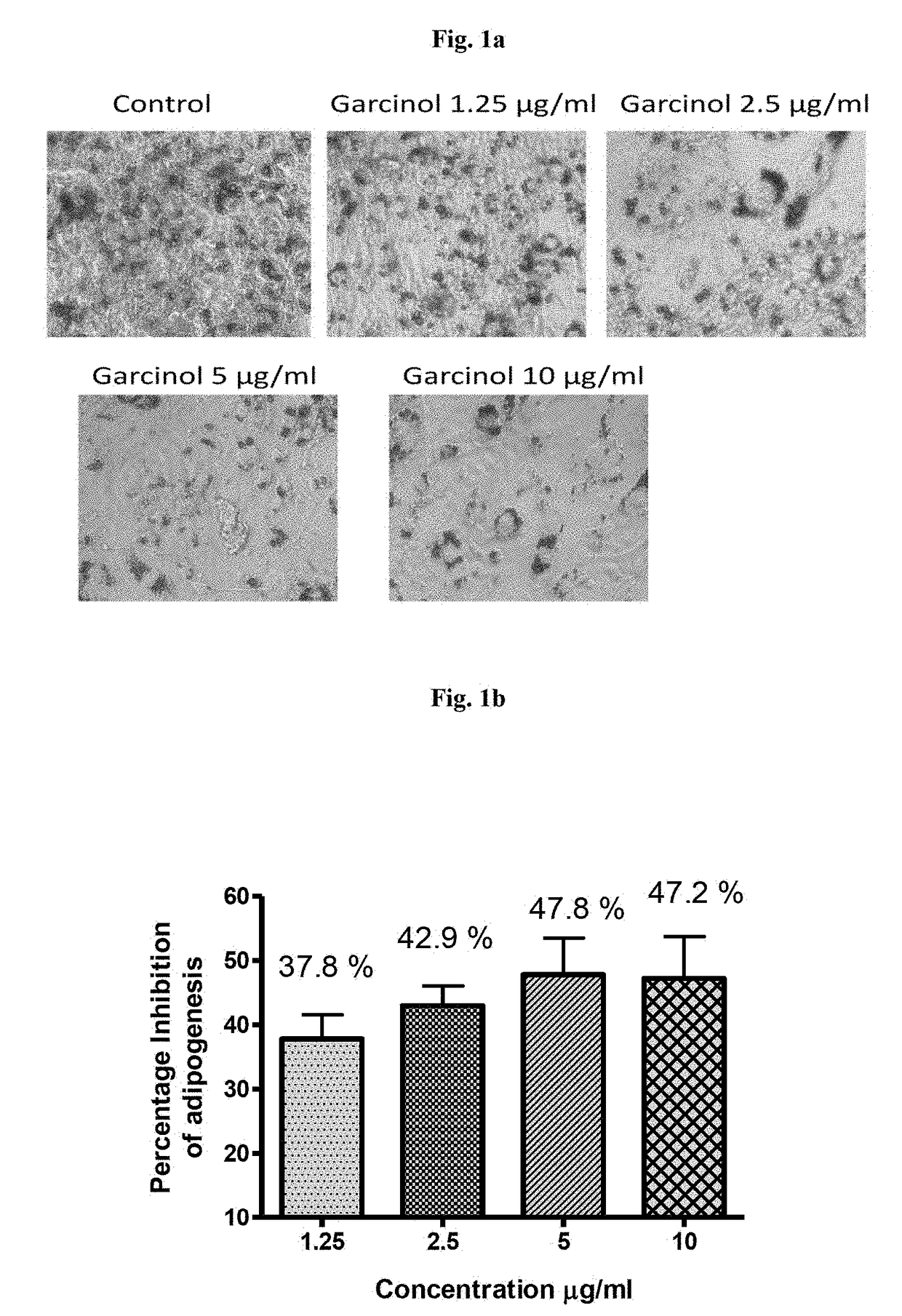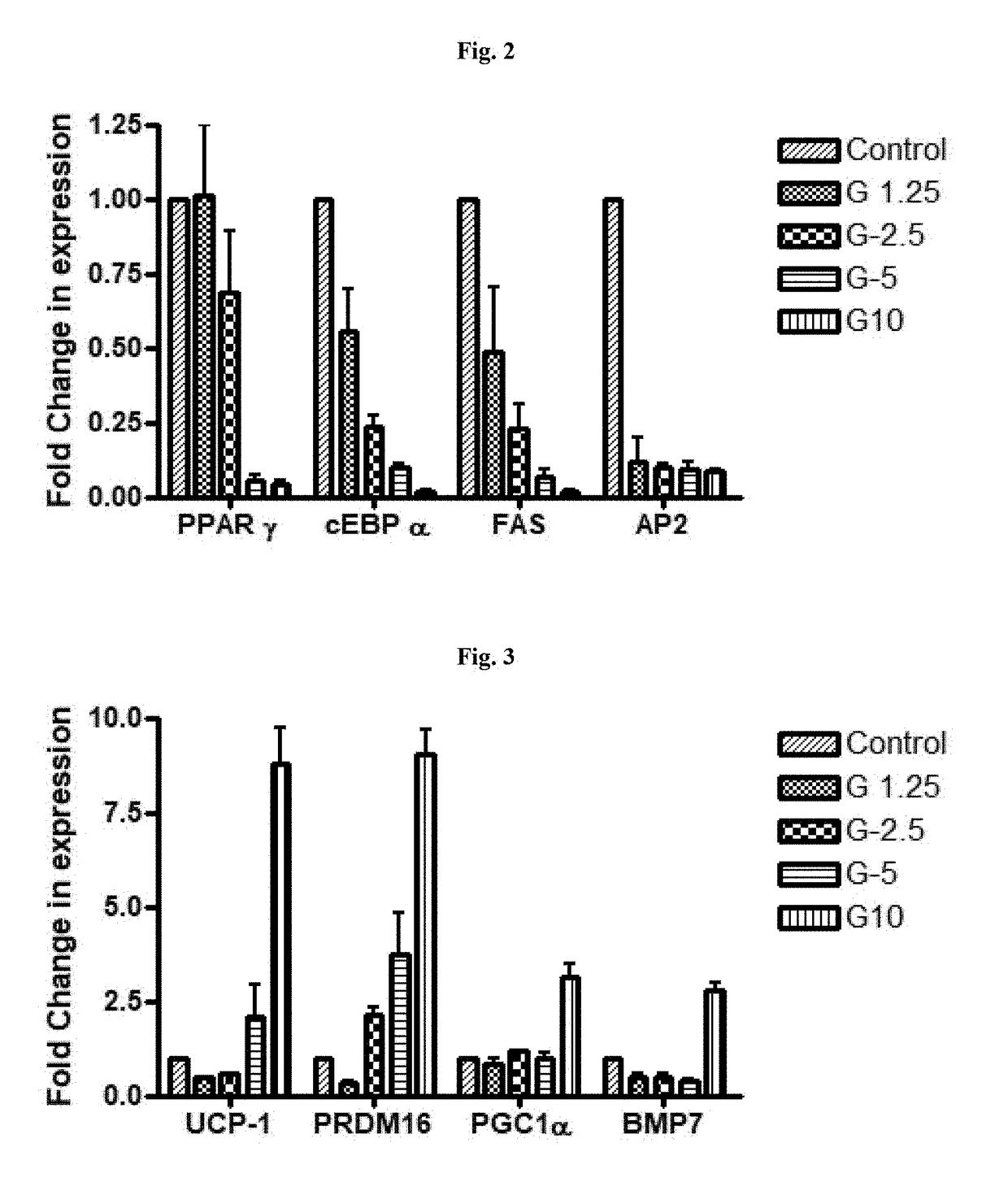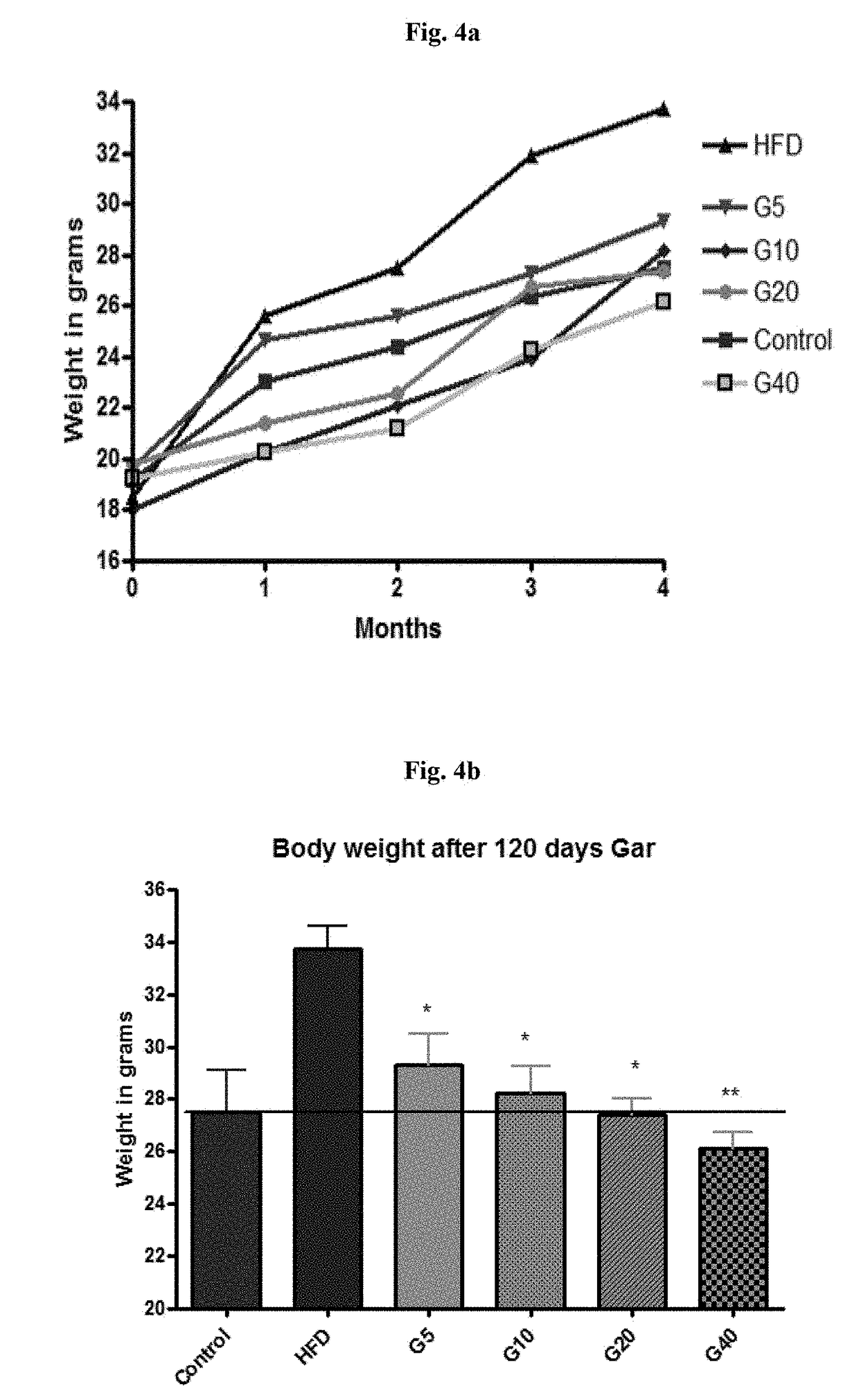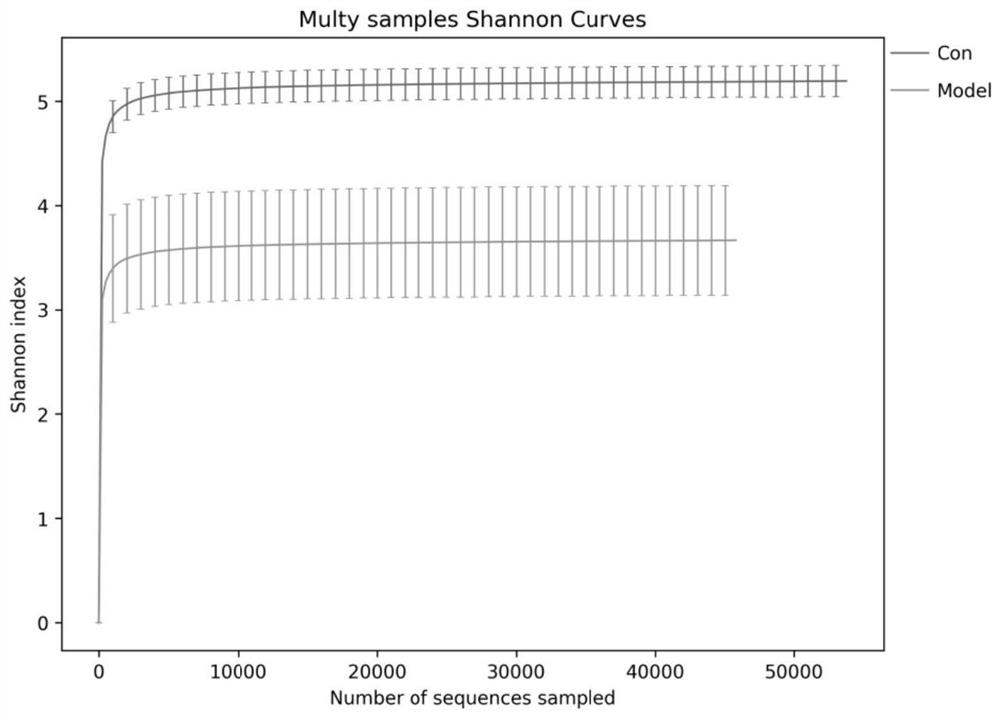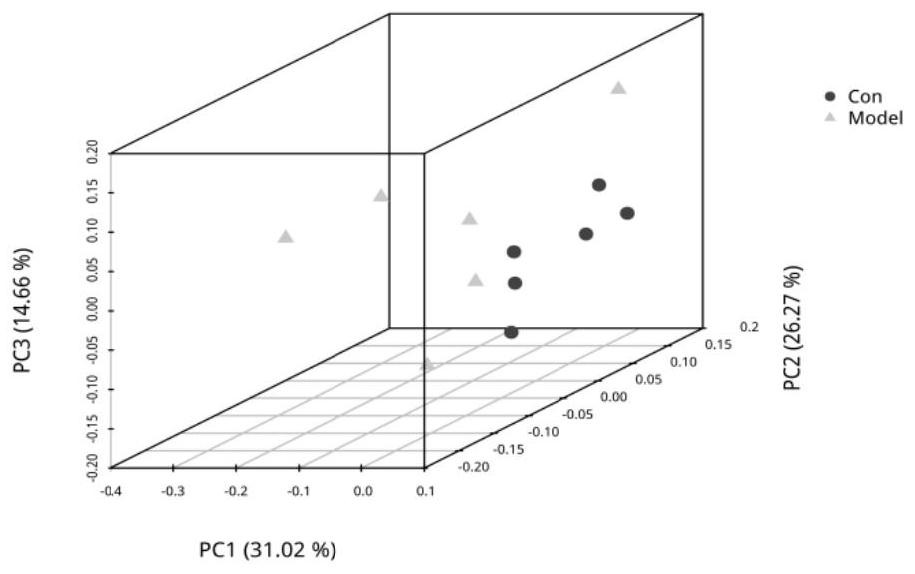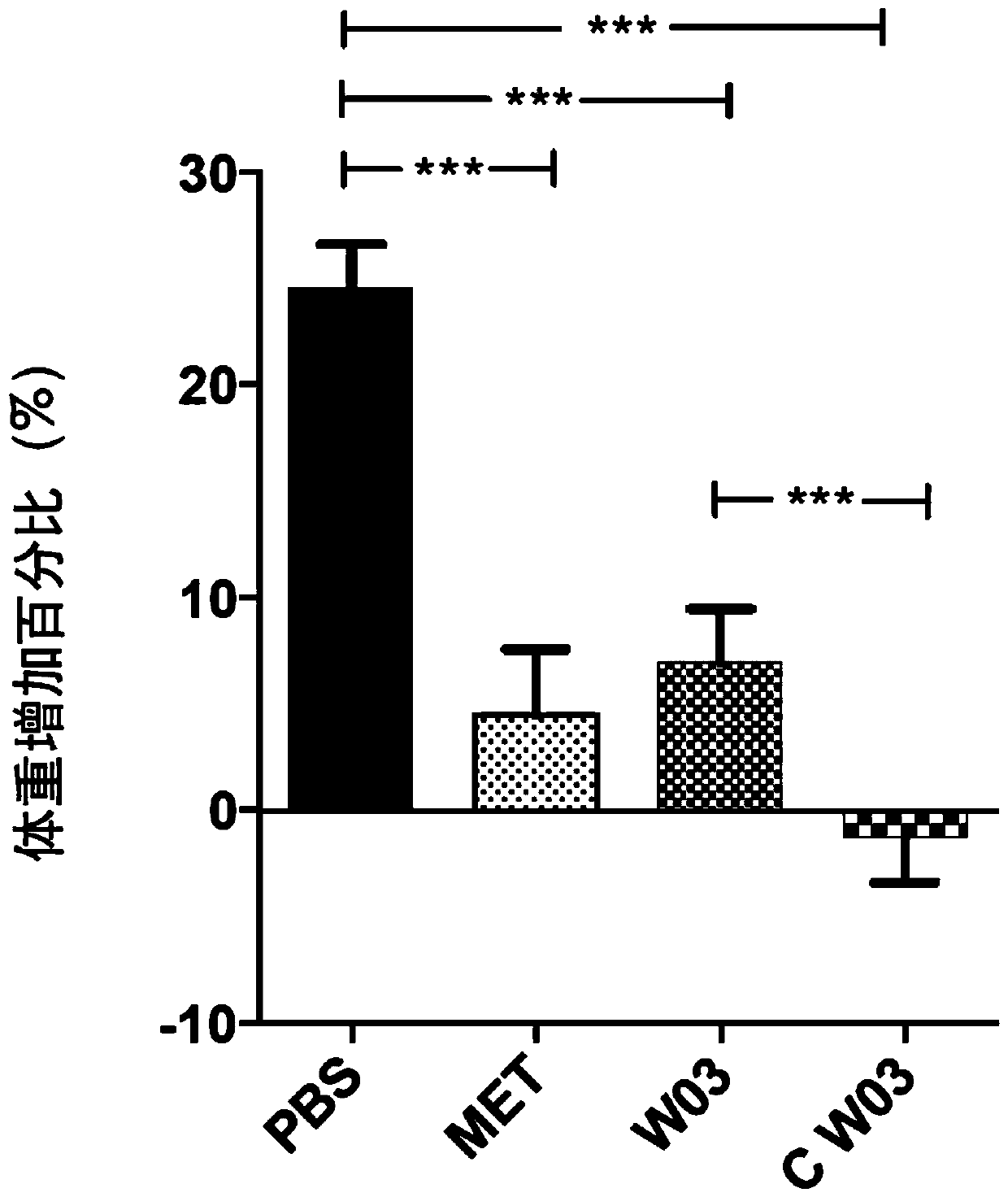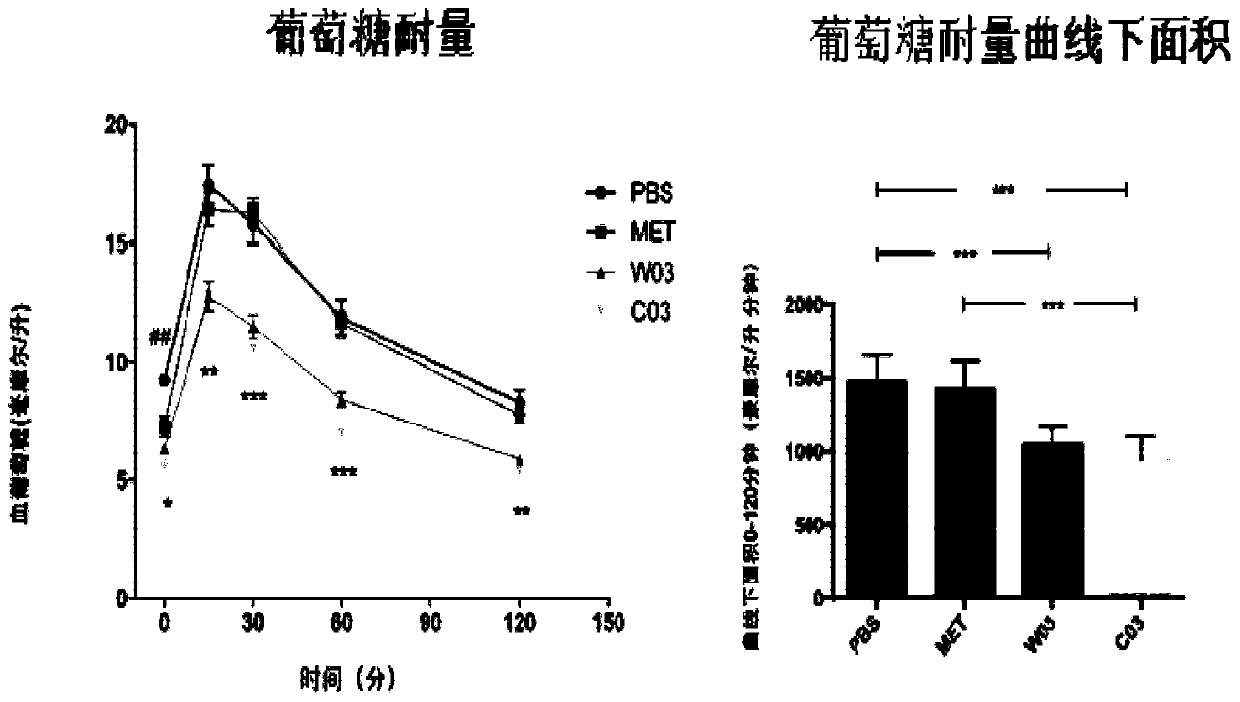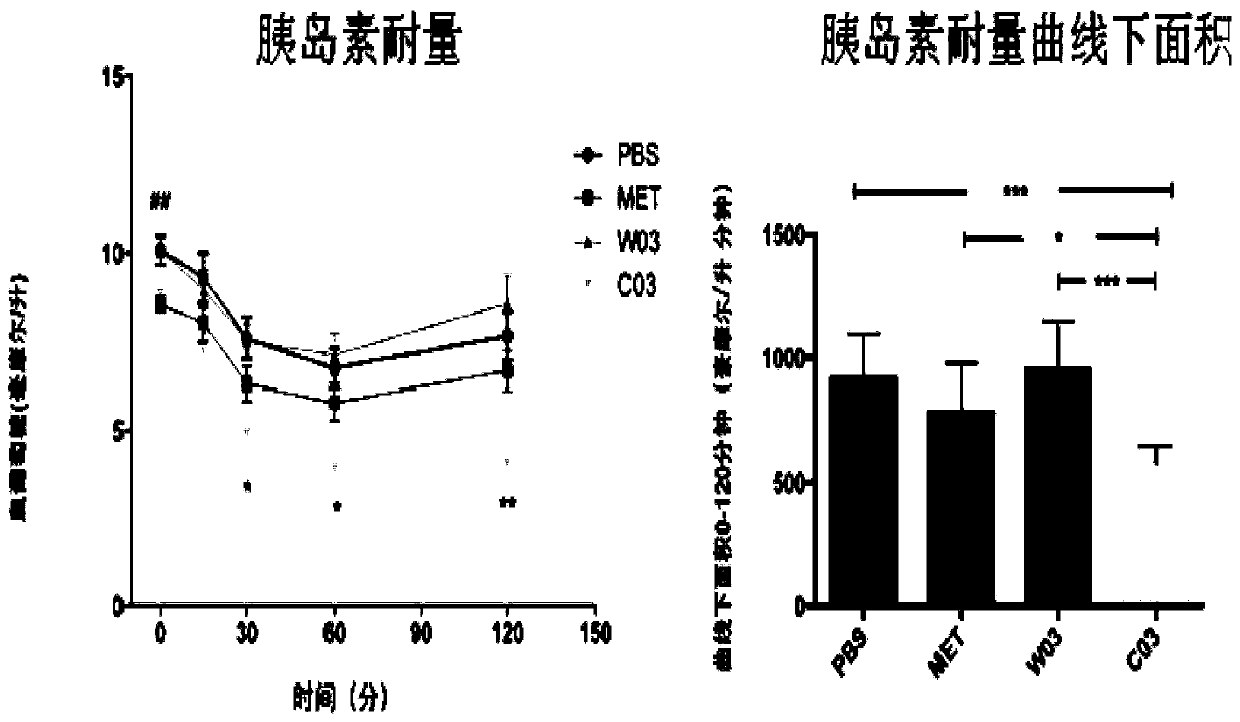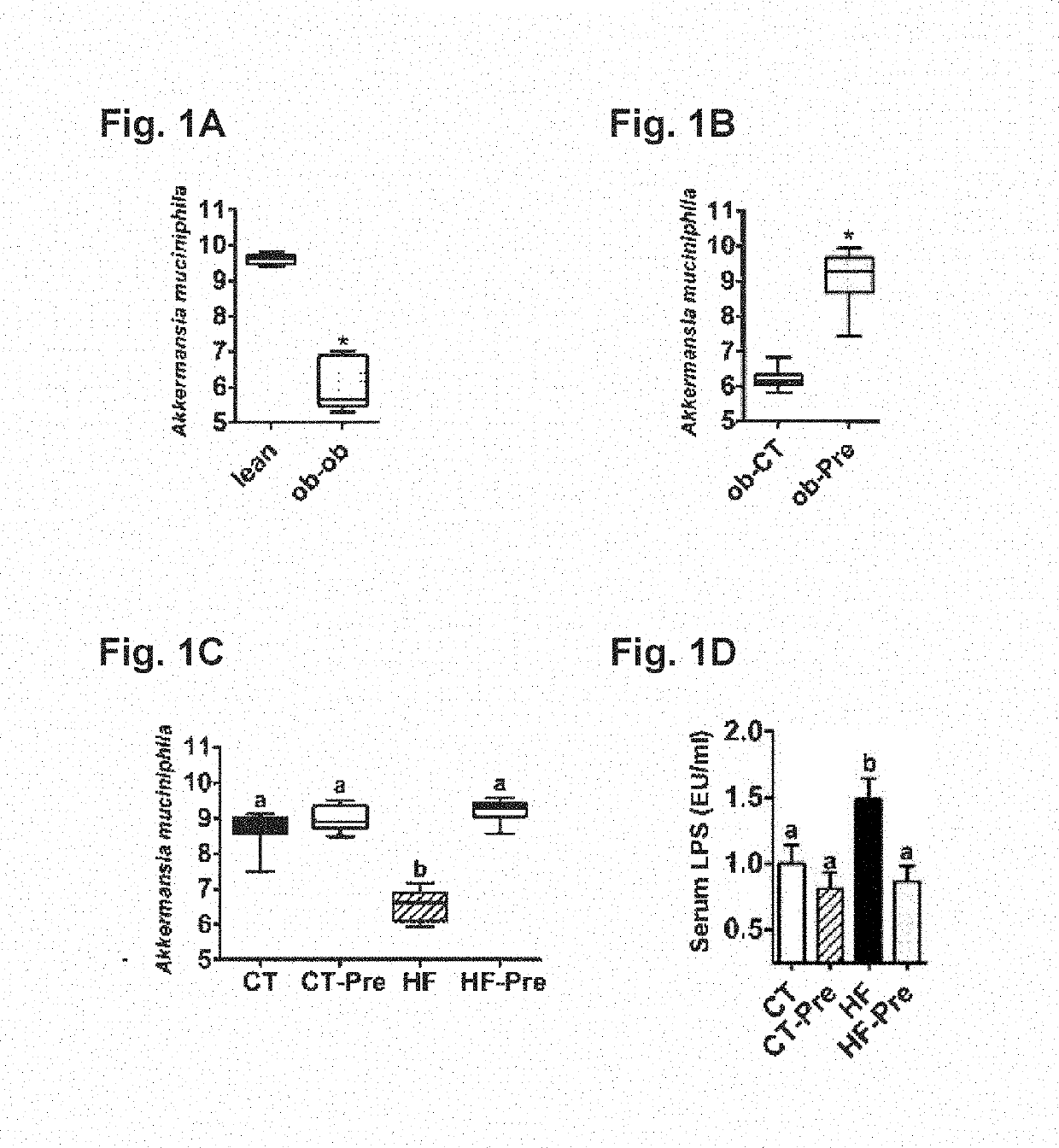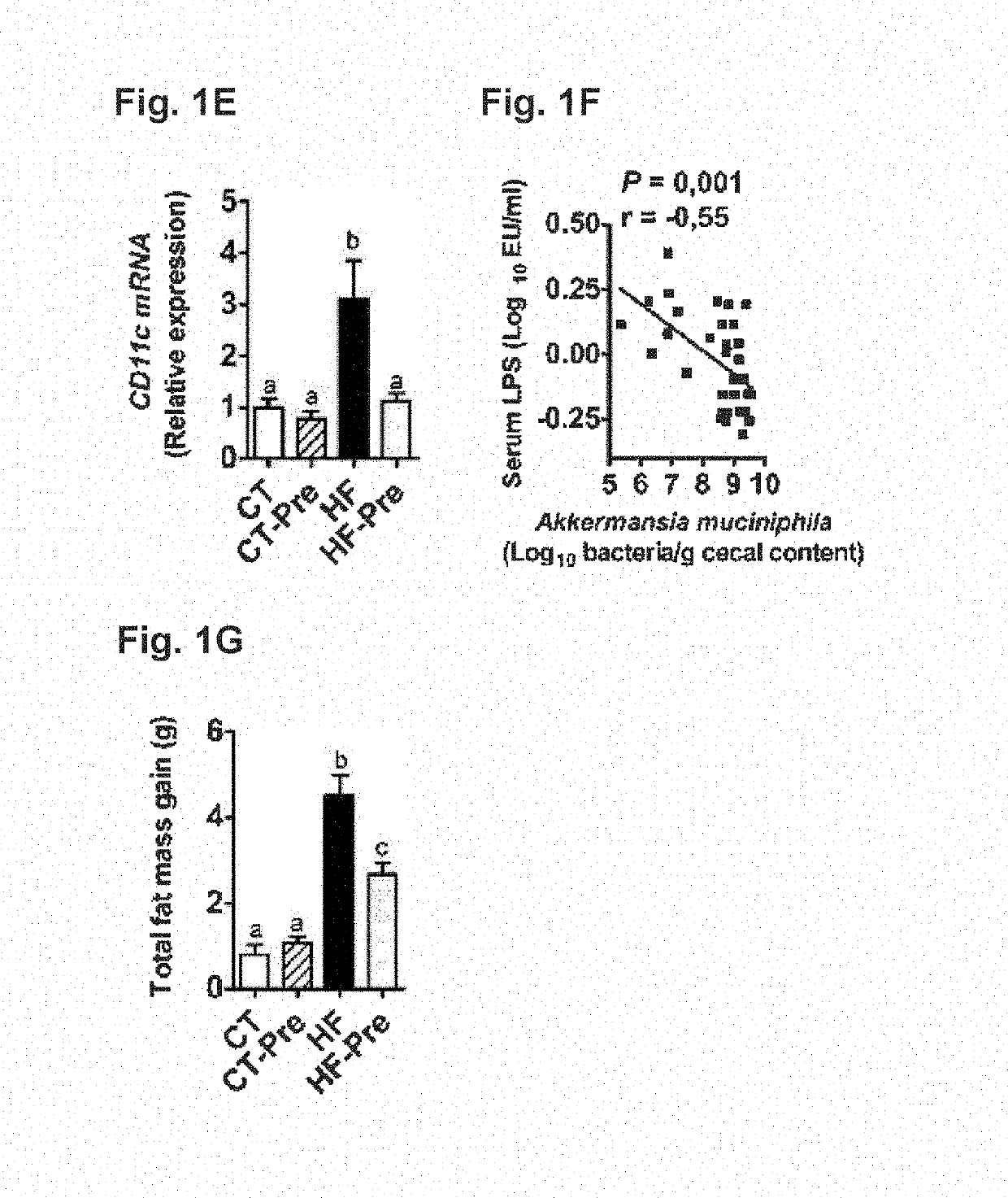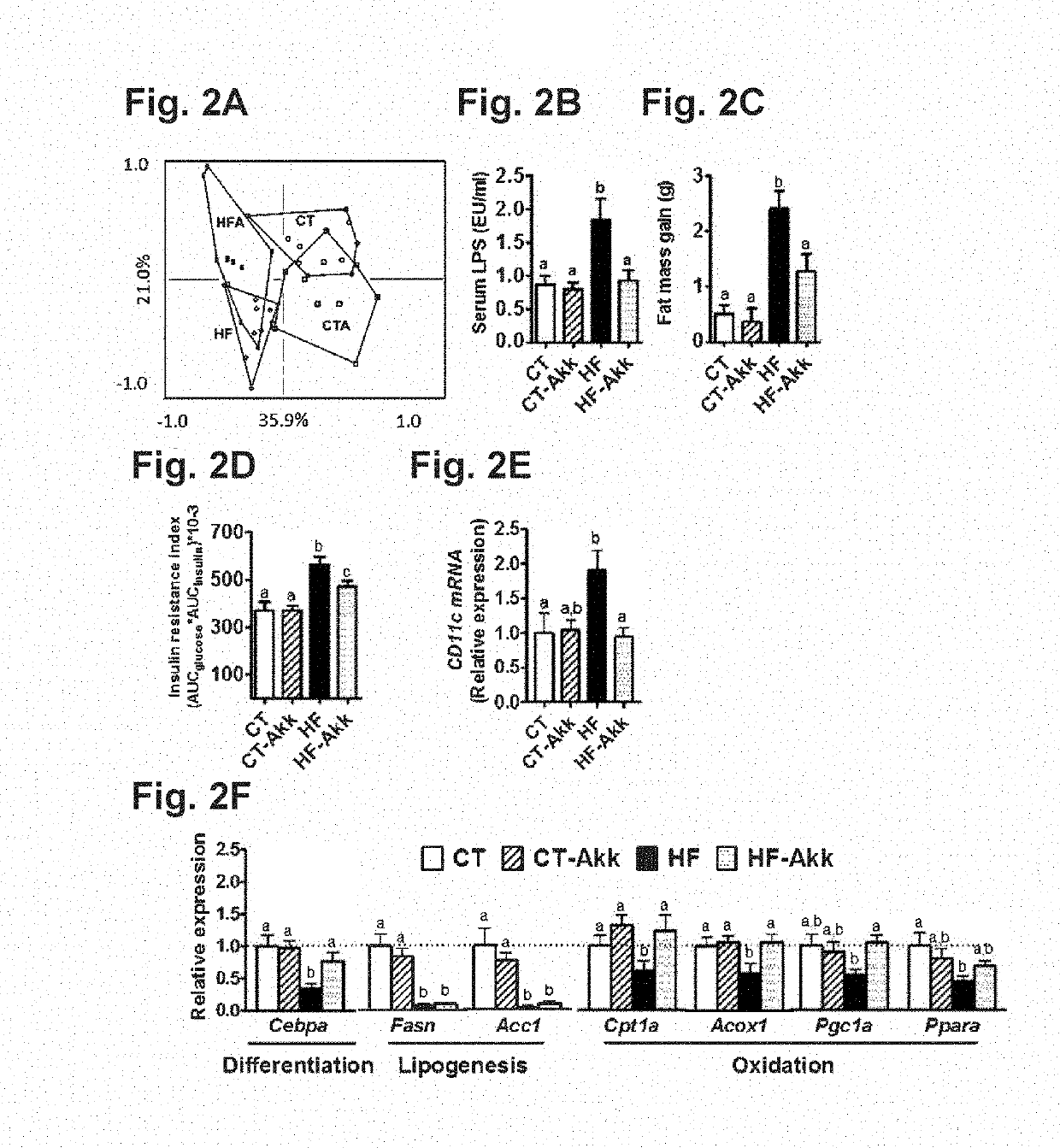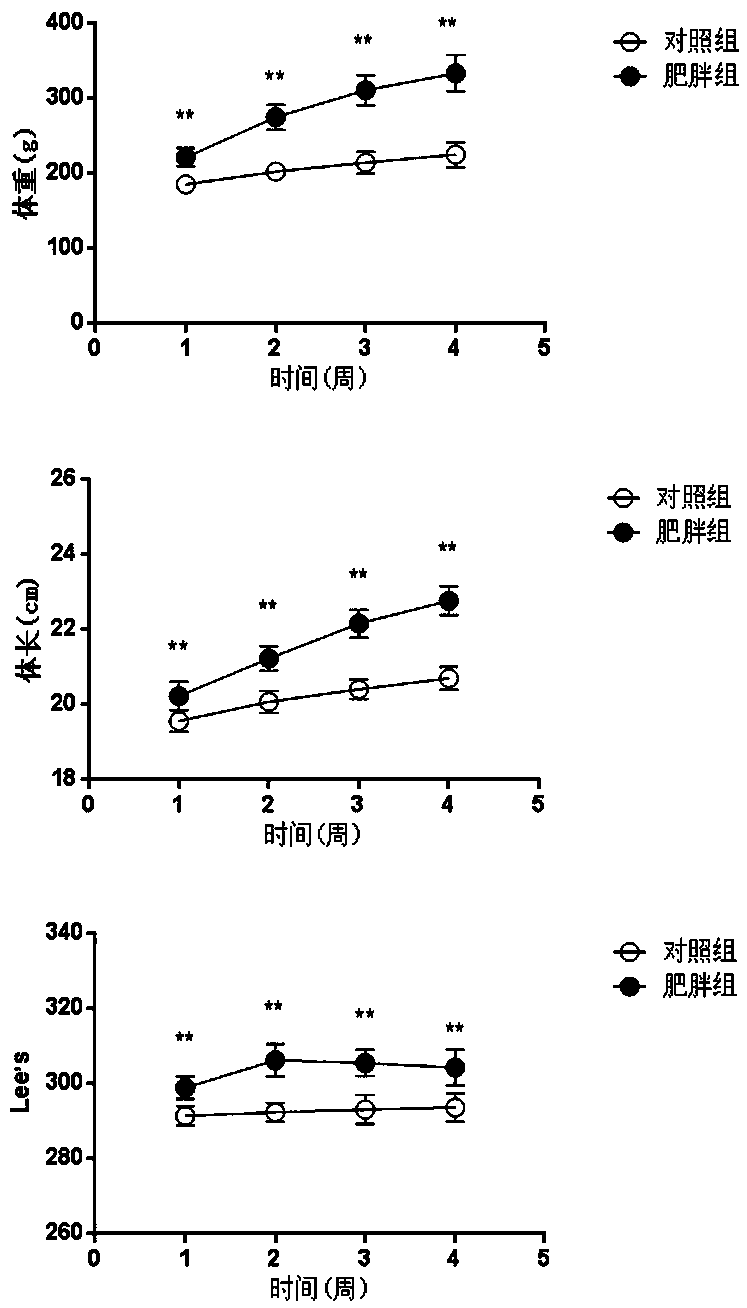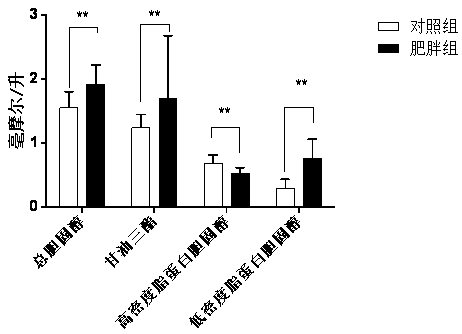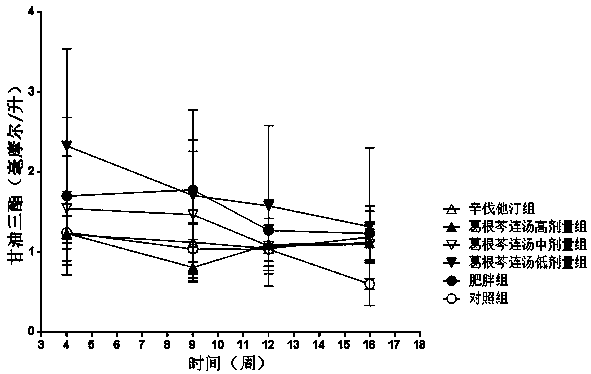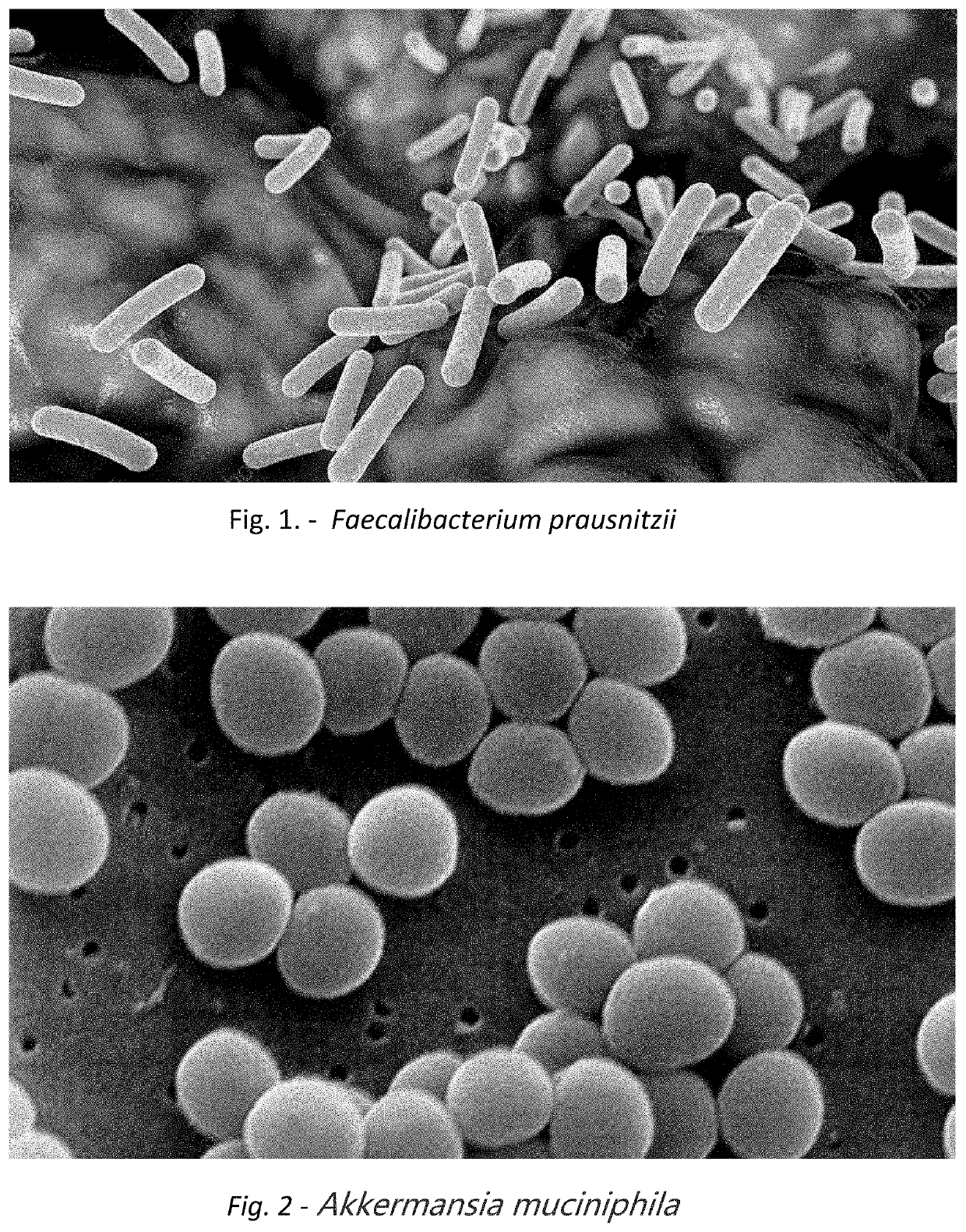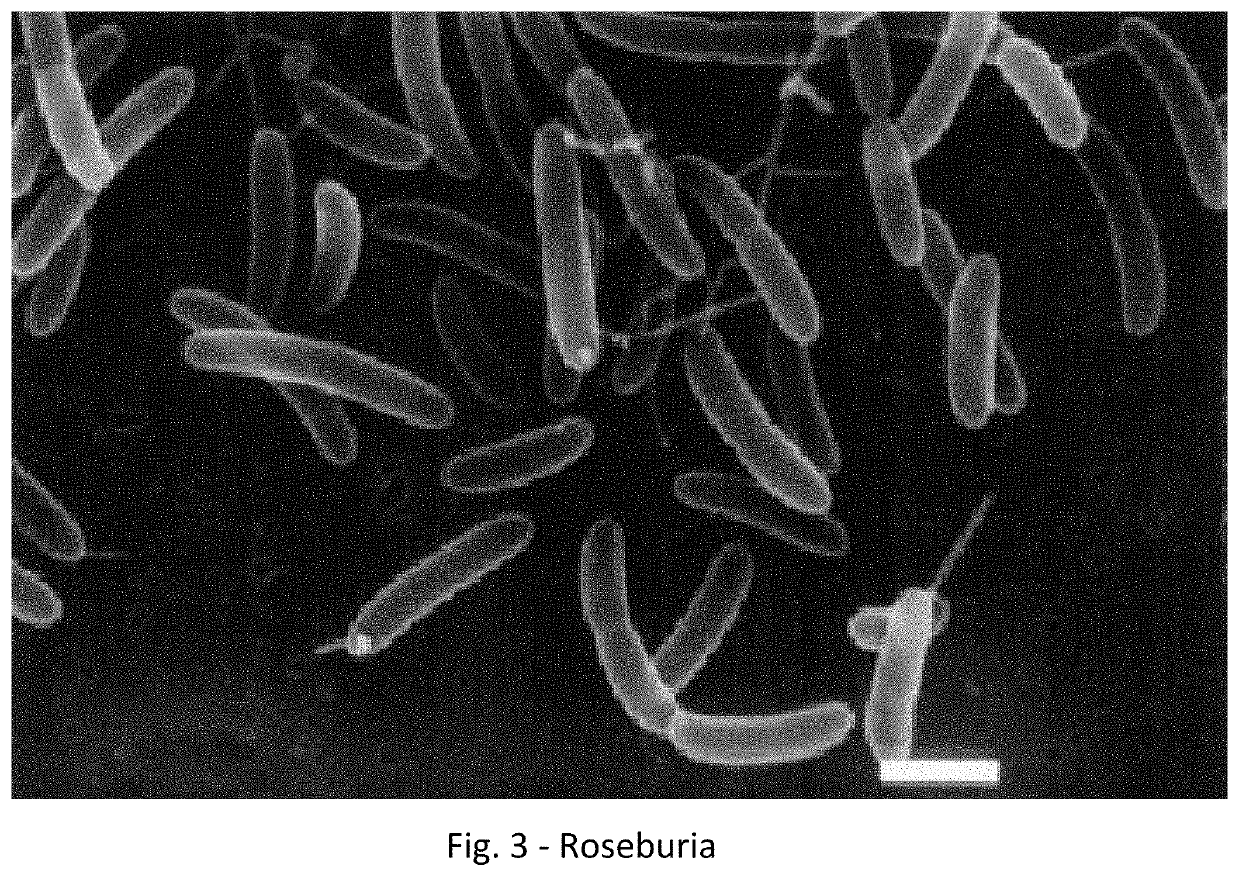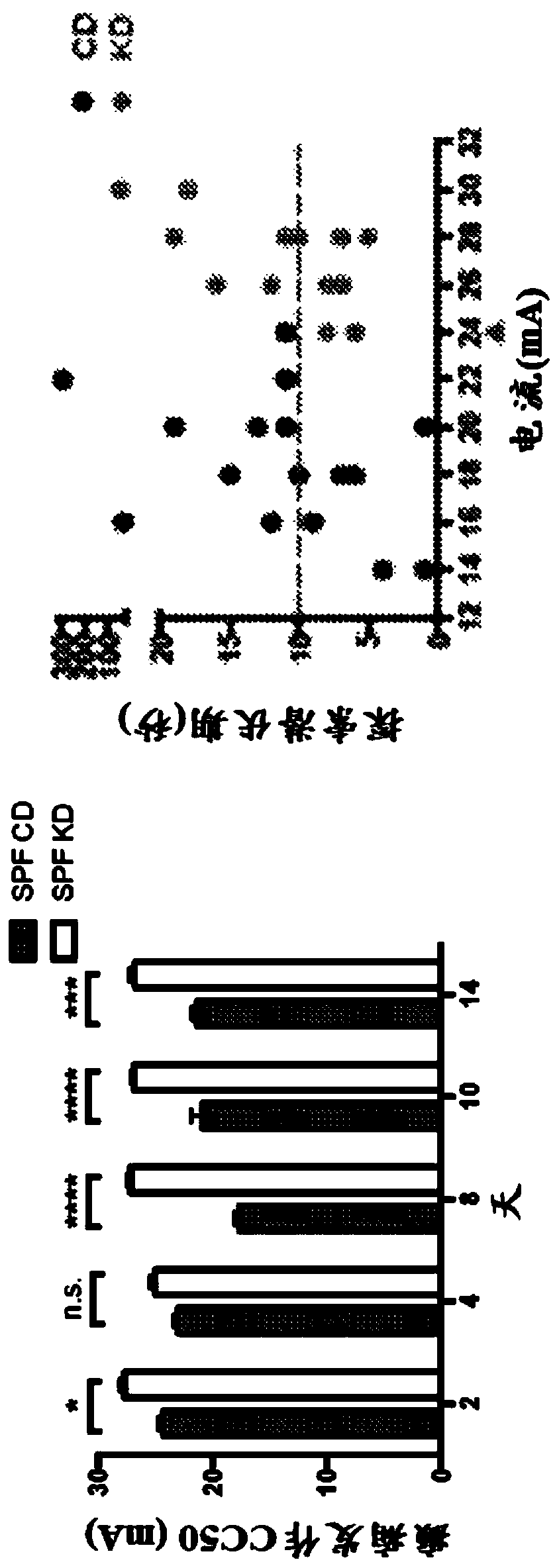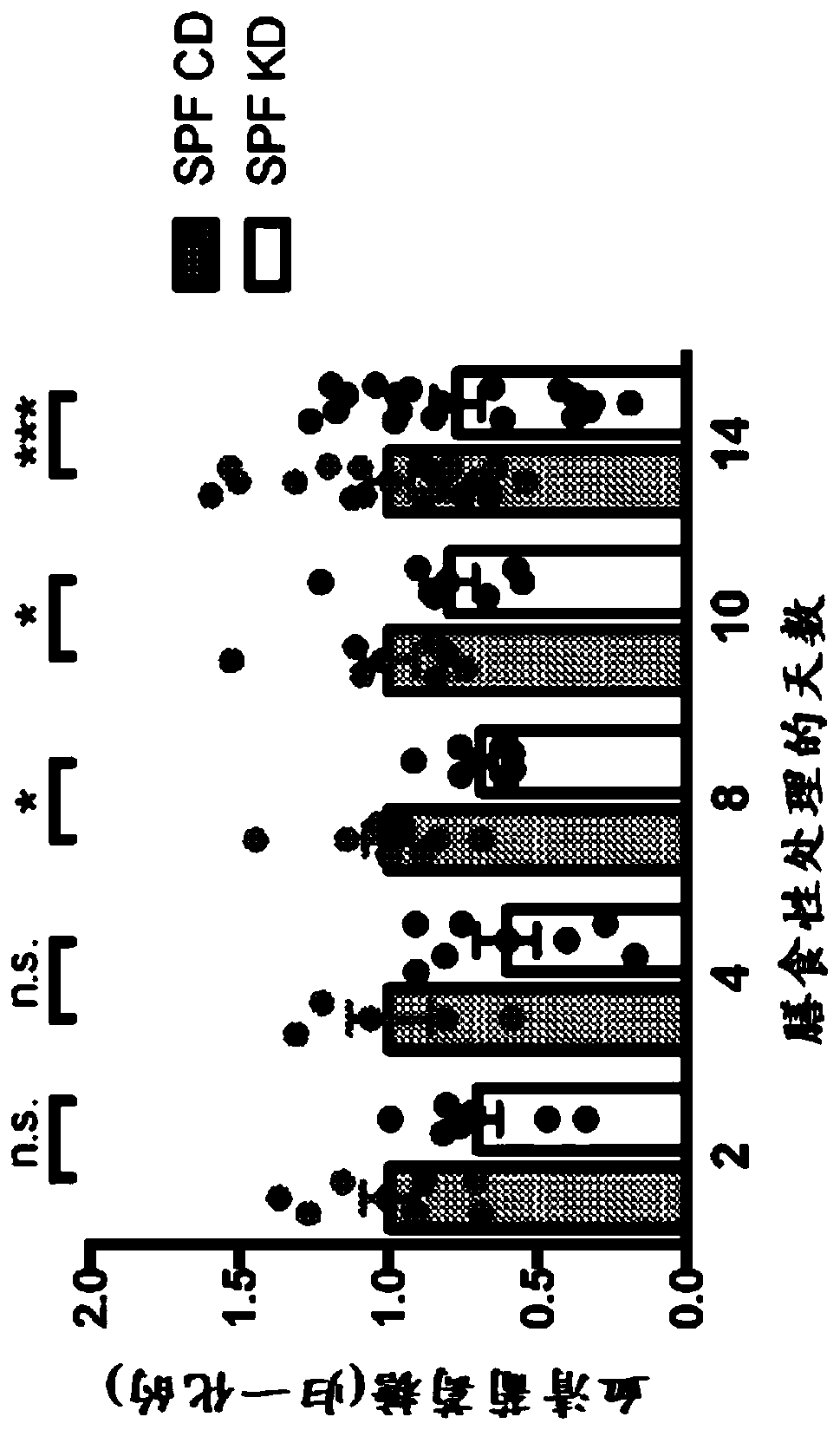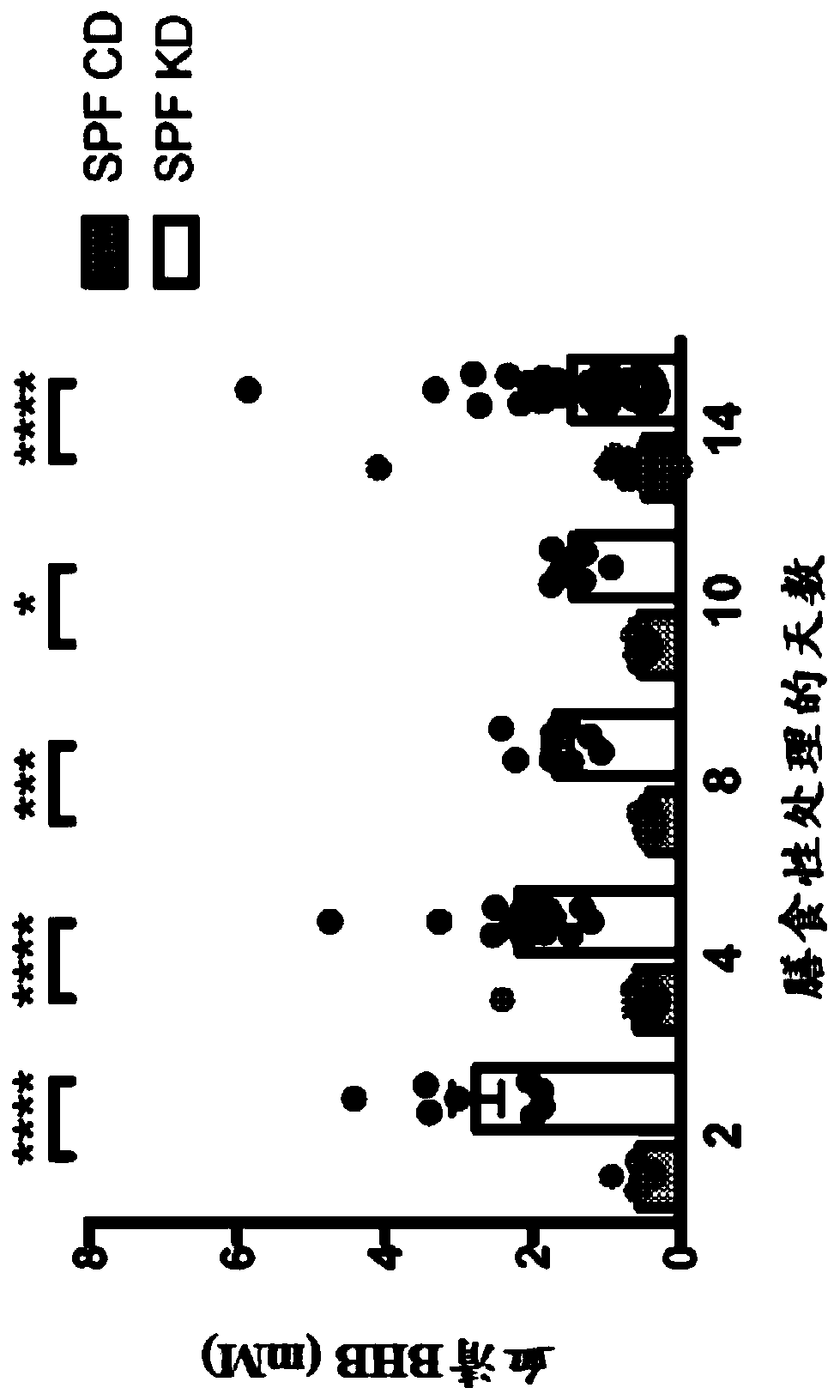Patents
Literature
73 results about "Akkermansia" patented technology
Efficacy Topic
Property
Owner
Technical Advancement
Application Domain
Technology Topic
Technology Field Word
Patent Country/Region
Patent Type
Patent Status
Application Year
Inventor
Akkermansia is a genus in the phylum Verrucomicrobia (Bacteria). The genus was first proposed in 2004 by Muriel Derrien and others, with the type species Akkermansia muciniphila (gen. nov., sp. nov).
Compositions of microbiota and methods related thereto
Methods and compositions are provided for treating weight related conditions and metabolic disorders by altering microbiota in a subject. One aspect provides methods and compositions to alter microbiota in a subject by administering to the subject a composition that includes a substantially purified microbiota from phyla such as Bacteroidetes, Proteobacteria, Firmicutes and Verrucomicrobia or orders such as Bacteroidales, Verrucomicrobiales, Clostridiales and Enterobacteriales or genera such as Alistipes, Clostridium, Escherichia, and Akkermansia. Another aspect includes a pharmaceutical composition for altering microbiota that includes a therapeutically effective amount of substantially purified microbiota and a pharmaceutically acceptable carrier. Yet another aspect includes methods for treating a disorder, such as obesity, in a subject in need of such treatment by changing relative abundance of microbiota in a gastrointestinal tract of the subject without or in addition to a surgical procedure.
Owner:PRESIDENT & FELLOWS OF HARVARD COLLEGE
Probiotics with methods for growth and use separately and in combination
InactiveUS20150246081A1Strengthening the immune systemBiocideUnknown materialsDietary supplementDiverticulitis
A dietary supplement that may contain probiotics from the genera Akkermansia, Bacteriodes, Faecalibacterium, Eubacterium, Escherichia, Collinsella, Desulfovibrio, Clostridium, Mycobacterium, Pediococcus, and Bifidobacterium. The dietary supplement may provide a variety of benefits including weight management, blood sugar management, treatment of irritable bowel syndrome, treatment of Crohn's disease, treatment of diverticulitis, treatment for inflammatory bowel, treatment for dysbiosis, and strengthening the immune system.
Owner:MORRIS SHAYNE KENNETH
Biomarkers for diabetes and usages thereof
ActiveCN104540962ABioreactor/fermenter combinationsBiological substance pretreatmentsDiabetes mellitusAkkermansia
Biomarkers for diabetes and usages thereof are provided. And the biomarkers are Akkermansia muciniphilacBacteroides intestinaliscBacteroides sp. 20_3cClostridium bolteaec Clostridium hathewayicClostridium ramosumcClostridium sp. HGF2cClostridium symbiosumc5 Desulfovibrio sp. 3_1_syn3cEggerthella lentacEscherichia colicClostridiales sp. SS3 / 4c Eubacterium rectalecFaecalibacterium prausnitziicHaemophilus parainfluenzaecRoseburia intestinalis and Roseburia inulinivorans.
Owner:SHENZHEN HUADA GENE INST +1
Use of akkermansia for treating metabolic disorders
PendingUS20150306152A1Increased energy expenditureIncrease satietyBiocideNervous disorderPharmaceutical drugPharmacology
The present invention relates to Akkermansia muciniphila or fragments thereof for treating a metabolic disorder in a subject in need thereof. The present invention also relates to a composition, a pharmaceutical composition and a medicament comprising Akkermansia muciniphila or fragments thereof for treating a metabolic disorder. The present invention also relates to the use of Akkermansia muciniphila or fragments thereof for promoting weight loss in a subject in need thereof.
Owner:UNIVERSITE CATHOLIQUE DE LOUVAIN +1
Method and system for reducing the likelihood of developing liver cancer in an individual diagnosed with non-alcoholic fatty liver disease
ActiveUS20190117709A1Inhibit progressEarly detectionOrganic active ingredientsDigestive systemFiberMonoacylglycerol acyltransferase
A method for reducing the likelihood of developing non-alcoholic steatohepatitis (NASH) in an individual diagnosed with non-alcoholic fatty liver disease involves providing in the gut of an individual a population of beneficial bacteria selected from the group consisting of Lactobacillus species, and at least 6 grams per day of fiber to the individual to maintain a therapeutically effective amount of the beneficial bacteria in the gut of the individual. In certain embodiments, monoacylglycerolacyltransferase-3 (MGAT3) synthesis is inhibited to lower triacylglycerol (TAG) production, while in others, expression of diacylglycerolacyltransferase-2 (DGAT-2) is inhibited. The beneficial bacteria are preferably modified to produce increased amounts of butyrate and are also encapsulated in a frangible enclosure. Levels of Roseburia are preferably increased while the levels of Akkermansia spp. in the individual's gut microbiome are reduced.
Owner:SEED HEALTH INC
Novel fucosyltransferases and their applications
The present invention relates to nucleic acid and amino acid sequences from Akkermansia muciniphila and from Bacteroides fragilis, coding for / representing novel alpha-1,3-fucosyltransferases. The invention also provides uses and methods for using the alpha-1,3-fucosyltransferases to generate fucosylated products, such as oligosaccharides, (glyco)proteins, or (glyco)lipids, in particular of 3-fucosyllactose.
Owner:CHR HANSEN HMO GMBH
Strain for preventing and treating metabolic diseases and application for strain
ActiveCN110964650AImprove fermentation performanceGood storage stabilityBacteriaMetabolism disorderBiotechnologyDisease
The invention discloses a strain for preventing and treating metabolic diseases and application for the strain. The strain is Akkermansia muiniphila strain which is named Akkermansia muciniphila SSYD-3 and has the preservation number being CGMCC No.14764. Compared with the existing Ackermann muiniphila strain ATCC BAA 835, the Akkermansia muiniphila strain provided by the invention is more ideal in fermentation performance, storage stability, acid resistance, bile salt tolerance and the effect of treating the metabolic diseases.
Owner:SHANGHAI SINE PHARMA LAB +1
Method of culturing akkermansia
A method for cost-effectively and efficiently culturing Akkermansia muciniphilais is disclosed. High biomass yields can be obtained on chemically defined media. This allows for large scale production of A. muciniphila suitable for use in humans, such as for pharmaceutical or food applications. The A. muciniphila can be produced free of animal-derived products, thereby allowing a broad-range of applications.
Owner:WAGENINGEN UNIV
Method and system for reducing the likelihood of developing liver cancer in an individual diagnosed with non-alcoholic fatty liver disease
ActiveUS10512661B2Improvements in intestinal dysbiosisReduce intestinal permeabilityOrganic active ingredientsDigestive systemDiseaseTriacylglycerol VLDL
A method for reducing the likelihood of developing non-alcoholic steatohepatitis (NASH) in an individual diagnosed with non-alcoholic fatty liver disease involves providing in the gut of an individual a population of beneficial bacteria selected from the group consisting of Lactobacillus species, and at least 6 grams per day of fiber to the individual to maintain a therapeutically effective amount of the beneficial bacteria in the gut of the individual. In certain embodiments, monoacylglycerolacyltransferase-3 (MGAT3) synthesis is inhibited to lower triacylglycerol (TAG) production, while in others, expression of diacylglycerolacyltransferase-2 (DGAT-2) is inhibited. The beneficial bacteria are preferably modified to produce increased amounts of butyrate and are also encapsulated in a frangible enclosure. Levels of Roseburia are preferably increased while the levels of Akkermansia spp. in the individual's gut microbiome are reduced.
Owner:SEED HEALTH INC
Method for reducing the likelihood of developing bladder or colorectal cancer in an individual human being
ActiveUS11026982B2Treatment complicationsAvoiding undesiredAntibacterial agentsOrganic active ingredientsPrevotellaMogibacterium diversum
A method for treating an individual suffering from one of bladder cancer and colorectal cancer employs a CRISPR system to selectively kill or reduce the numbers of pathogenic bacteria within the individual and the individual is then administered an immune checkpoint inhibitor. In particular embodiments, the pathogenic bacteria is one of E. coli, Pseudomonas aeruginosa and Klebsiella bacteria, and the checkpoint inhibitor is selected from the group consisting of nivolumab, pembrolizumab, pidilizumab, AMP-224, AMP-514, STI-A1110, TSR-042, RG-7446, BMS-936559, MEDI-4736, MSB-0020718C, AUR-012 and STI-A1010. Further embodiments include enhancing the growth of a second bacteria in the individual, such bacteria including Akkermansia, Bacteroides, Bifidobacterium, Clostridium, Enterococcus, Fusobacterium, Lactobacillus, Propionibacterium, Ruminococcus, Veillonella, Prevotella, Escherichia and Streptococcus. Still other embodiments include increasing the levels of Roseburia and / or Faecalibacterium prausnitzii, in the individual's gut microbiome.
Owner:SEED HEALTH INC
Method for treating an individual suffering from a chronic infectious disease and cancer
ActiveUS11213552B2Treatment complicationsAvoiding undesiredAntibacterial agentsOrganic active ingredientsPseudomonasPrevotella
A method for treating an individual suffering from a chronic infectious disease and who has cancer employs a CRISPR system to selectively kill or reduce the numbers of pathogenic bacteria within the individual and the individual is then administered an immune checkpoint inhibitor. In particular embodiments, the pathogenic bacteria is one of E. coli, Pseudomonas aeruginosa and Klebsiella bacteria, and the checkpoint inhibitor is selected from the group consisting of nivolumab, pembrolizumab, pidilizumab, AMP-224, AMP-514, STI-A1110, TSR-042, RG-7446, BMS-936559, MEDI-4736, MSB-0020718C, AUR-012 and STI-A1010. Further embodiments include enhancing the growth of a second bacteria in the individual, such bacteria including Akkermansia, Bacteroides, Bifidobacterium, Clostridium, Enterococcus, Fusobacterium, Coprococcus, Lactobacillus, Propionibacterium, Ruminococcus, Veillonella, Prevotella, Escherichia and Streptococcus. The CRISPR system may include Cas9, Cpf1 and Cas3, and may be delivered using a bacteriophage.
Owner:SEED HEALTH INC
Recombinantly-expressed Akkermansia membrane protein Amuc_1100 and application thereof
ActiveCN110698547ARegulate immune responseStimulate immune responseBacteriaPeptide/protein ingredientsLamina propriaColonic lamina propria
The invention discloses recombinantly-expressed Akkermansia membrane protein Amuc_1100 and an application thereof. The invention recombinantly expresses the Akkermansia membrane protein Amuc_1100, through animal experiments, we find that oral administration of the Akkermansia membrane protein Amuc_1100 can significantly improve the body weight of mice, increase colon length and crypt depth, and activate proliferation of intestinal stem cells to protect mice from colitis damage. Isolation of lymphocytes from the lamina propria of the colon shows that the proportion of Treg cells is significantly up-regulated and that of Th17 cells is significantly down-regulated, proving that Amuc_1100 can restore colon damage by adjusting the proportion of immune cells Treg / Th17. Therefore, the protein isexpected to be developed into a protein product for preventing or treating colitis.
Owner:NANJING AGRICULTURAL UNIVERSITY
Use of pasteurized akkermansia for treating metabolic disorders
ActiveUS20180250347A1Increased energy expenditureIncrease satietyCosmetic preparationsMetabolism disorderAkkermansiaMetabolic disorder
The present invention relates to pasteurized Akkermansia muciniphila or fragments thereof for treating a metabolic disorder in a subject in need thereof. The present invention also relates to a composition, a pharmaceutical composition and a medicament comprising pasteurized Akkermansia muciniphila or fragments thereof for treating a metabolic disorder. The present invention also relates to the use of pasteurized Akkermansia muciniphila or fragments thereof for promoting weight loss in a subject in need thereof.
Owner:UNIVERSITE CATHOLIQUE DE LOUVAIN +1
Akkermansia muciniphila 139 strain and purpose thereof
ActiveCN111321089ARegulate permeabilityInhibit the inflammatory responseBacteriaDigestive systemBiotechnologyT cell
The invention discloses a new Akkermansia muciniphila 139 strain. The strain is collected in the China General Microbiological Culture Collection Center with a collection number of CGMCC No. 16758, and a collection date is November 21st, 2018. The invention also discloses a purpose of the strain. Through separation and authentication, a new strain, i.e., the Akkermansia muciniphila 139, of Akkermansia muciniphila is obtained, the strain can carry out fermentation in vitro to generate a great quantity of short chain fatty acids, and the intestinal health of a host can be maintained. The fermentation in vitro of supernatant can induce the differentiation of mice lymphocyte regulative T cells, and the immunologic function of the host is enhanced. In addition, the bacteria strain also can alleviate enteritis, especially DSS (dextran sulfate sodium)-induced chronic enteritis, and also has a probiotic function.
Owner:上海究本科技有限公司
Use of Akkermansia muciniphila for treating inflammatory conditions
The invention relates to use of Akkermansia muciniphila, a mucin-degrading bacterial species found in the human gut, for treating undesirable inflammatory activity not caused by any metabolic disorder and / or obesity, especially for example undesirable airway inflammatory activity as seen with asthma.
Owner:GLAXOSMITHKLINE RES & DEV +1
Bacteroides fragilis capable of regulating and controlling relative abundance of akkermansia in intestinal tracts
ActiveCN111635874AIncrease abundanceReduce infiltrationBacteriaMetabolism disorderMucosal bleedingFatty acid
The invention discloses bacteroides fragilis capable of regulating and controlling relative abundance of akkermansia in intestinal tracts, and belongs to the technical field of microorganisms. The bacteroides fragilis CCFM1123 is screened out, and the bacteroides fragilis CCFM1123 has the effect of relieving inflammation. Specifically, the relative abundance of lactobacillus and akkermansia in theintestinal tract of an inflammatory mouse is remarkably improved; the content of proinflammatory factors TNF-alpha and IL-6 in the serum of the inflammatory mouse is remarkably reduced; intestinal inflammatory cell infiltration and mucosal bleeding caused by inflammatory response of the inflammatory mouse are remarkably reduced; and production of short-chain fatty acids in the intestinal tract ofthe inflammatory mice is obviously promoted. Therefore, the bacteroides fragilis CCFM1123 has a huge application prospect in preparation of products (such as foods or medicines) for preventing and / ortreating inflammation.
Owner:JIANGNAN UNIV
Chitosan oligosaccharide, composition containing chitosan oligosaccharide, medicine or food containing chitosan oligosaccharide and application of chitosan oligosaccharide
InactiveCN108514563ASignificantly regulate the effect of intestinal floraIncreased disorderOrganic active ingredientsAntipyreticGut floraOligosaccharide
The invention discloses application of chitosan oligosaccharide as regulating agent for regulating animal intestinal flora disturbance, the chitosan oligosaccharide, a mixture containing the chitosanoligosaccharide and corresponding application. The polymerization degree of the chitosan oligosaccharide is 2 to 20, so that the intestinal flora disturbance caused by obesity or diabetes or an unreasonable diet structure can be regulated, growth of beneficial bacteria such as Akkermansia, Bifidobacterium and Lactobacillus of an intestinal tract is promoted, and proliferation of harmful bacteriasuch as Desulfovibrio and Helicobacter is obviously inhibited. The invention provides an application method of a clinically-acceptable medicinal preparation or health-care food which is made by usingthe chitosan oligosaccharide alone or a composition prepared from the chitosan oligosaccharide and the beneficial bacteria according to a conventional process. By utilizing the chitosan oligosaccharide, prevention and control of the intestinal disturbance caused by the diabetes, the obesity and the inflammatory bowel disease have an active application value.
Owner:INST OF PROCESS ENG CHINESE ACAD OF SCI
Novel bacterial species
ActiveUS20190183941A1Sure easyQuick upgradeAntibacterial agentsNervous disorderDiseaseMucosal Immune Responses
A novel Akkermansia species has been isolated from fresh faeces obtained from the reticulated python. The species has been named Akkermansia glycaniphilus. It is capable of growing on mucus as a sole carbon and nitrogen source. The species can be used as a medicament, probiotic or cosmetic, e.g., for promoting weight loss, for promoting gut mucosal immune system function, for maintaining, restoring and / or increasing the physical integrity of the gut mucosal barrier, and for prevention or treatment of a variety of associated diseases or disorders.
Owner:WAGENINGEN UNIV
Composition for targeted regulation of intestinal Akkermansia and short chain fatty acid producing bacteria
ActiveCN111820419AIncreased abundance levelsSimple structureBacteriaMicroorganism based processesBiotechnologyGlycerol
The invention relates to a composition for targeted regulation of intestinal Akkermansia and short chain fatty acid producing bacteria, and belongs to the field of development of synbiotic compositionpreparation products. The composition contains, in percentage by mass, 10<6>-10<10> cfu / g of probiotics, 30-60% of prebiotics, 17-37% of skim milk powder, 4.5-10% of trehalose, 4.5-10% of gamma-polyglutamic acid, 3-6% of glycerin and 5-10% of fruit and vegetable powder. The composition can improve the abundance level of the Akkermansia and short chain fatty acid producing bacteria in a human bodyin a targeted manner, has the functions of improving the structure of intestinal florae, regulating the intestinal microecology, and promoting the health of organisms.
Owner:OCEAN UNIV OF CHINA
Multiple-fluorescence quantitative PCR primers, kit and detection method for detection of multiple types of bacteria
ActiveCN110904250AReduce distractionsStrong specificityMicrobiological testing/measurementMicroorganism based processesLactobacillus rhamnosusNucleotide
The invention discloses multiple-fluorescence quantitative PCR primers, a kit and detection method for detection of multiple types of bacteria. The primers include 16SrDNA designed primer pairs and probes which target Bifidobacterium longum, Bifidobacterium breve, Bifidobacterium animalis, Lactobacillus rhamnosus, Lactobacillus acidophilus, Lactobacillus plantarum, Lactobacillus reuteri and Akkemansia, wherein the nucleotide sequences of the primer pairs of Bifidobacterium longum, animalis Bifidobacterium and Bifidobacterium breve are shown in SEQ ID NO:1 and SEQ ID NO:2. The invention also discloses a multiple-fluorescence quantitative PCR detection kit which comprises the PCR primers and probes. The multiple-fluorescent quantitative PCR primers and probes for detection of multiple typesof bacteria are specific-sequence primers and probes which are designed and synthesized according to multiple experiments, and through the optimized specific primers and probes, it is ensured that good specificity and reduction of mutual interference among primer probes in the same reaction system can be achieved during amplification.
Owner:知几未来(成都)临床医学检验有限公司
Method and system for reducing the likelihood of developing liver cancer in an individual diagnosed with non-alcoholic fatty liver disease
ActiveUS20200121743A1Inhibit progressEarly detectionOrganic active ingredientsPharmaceutical delivery mechanismDiseaseIntestinal microorganisms
A method for reducing the likelihood of developing liver cancer in an individual diagnosed with non-alcoholic fatty liver disease involves providing in the gut of an individual a population of beneficial bacteria selected from the group consisting of Lactobacillus species, and administering fiber to the individual to maintain a therapeutically effective amount of the beneficial bacteria in the gut of the individual. In certain embodiments, monoacylglycerolacyltransferase-3 (MGAT3) synthesis is inhibited to lower triacylglycerol (TAG) production, while in others, expression of diacylglycerolacyltransferase-2 (DGAT-2) is inhibited. The beneficial bacteria are preferably modified to produce increased amounts of butyrate and may also be encapsulated in a frangible enclosure. Levels of Roseburia are preferably increased while the levels of Akkermansia spp. in the individual's gut microbiome are reduced. In other embodiments, a therapeutically effective amount of a bacterial formulation comprising Faecalibacterium prausnitzii is administered, or a composition comprising modified L. reuteri bacteria having the ability to survive conditions in the duodenum or jejunum of the individual's small intestine. Other embodiments include the administration of a bacterial formulation comprising at least one of Coprococcus, Veillonella, Roseburia, Bifidobacterium, Faecalibacterium prausnitzii and Prevotella.
Owner:SEED HEALTH INC
Application of schisandra chinensis polysaccharide in preparation of medicines or health products for treating inflammatory bowel diseases
ActiveCN111514160AImprove inflammatory bowel diseaseImprove colitisOrganic active ingredientsFood freezingPropanoic acidIntestinal microorganisms
The invention relates to new application of schisandra chinensis total polysaccharide in preparation of medicines or health products for treating inflammatory bowel diseases, in particular to new application in preparation of medicines or health products for treating ulcerative colitis (UC), Crohn disease (CD) and acute and chronic intestinal diseases. Experiments show that the schisandra chinensis total polysaccharide can significantly improve inflammatory injury of colon, reduce spleen indexes, increase thymus indexes, effectively reduce the contents (activity) of MPO, NO, MDA and ROS in thecolons, and increase the contents of GSH and SOD at the same time. Meanwhile, the schisandra chinensis polysaccharide regulates the composition and diversity of intestinal microorganisms of colitis mice, obviously improves the relative abundance of Finnicutes, sugar bacteria, Enterorhabdus and the like, reduces the relative abundance of intestinal bacteria such as Firmicutes, Turicibacter and Akkermansia, remarkably increases the contents of propionic acid, butyric acid and isobutyric acid in the colon, and it is prompted that the schisandra chinensis total polysaccharide can be used for preparing medicines for treating or improving inflammatory bowel diseases.
Owner:NANJING UNIVERSITY OF TRADITIONAL CHINESE MEDICINE
Anti-obesity potential of garcinol
InactiveUS20180360776A1Raise countOrganic active ingredientsMetabolism disorderEnergy balancingIntestinal microorganisms
Disclosed are compositions containing garcinol for the therapeutic management of obesity. More specifically, the invention relates to the use of garcinol for a) maintaining energy balance in mammalian adipose cellular systems b) management of hypercholesterolemia and c) reducing weight gain in mammals. The modification of gut microbiota and the increase of beneficial microbe, Akkermansia muciniphila by garcinol are also disclosed.
Owner:SAMI LABS LTD
Diarrhea-type irritable bowel syndrome intestinal microbial marker and application thereof
PendingCN114045326AReduced dietary intakeLose weightMicrobiological testing/measurementMicroorganism based processesDiseaseIntestinal microorganisms
The invention belongs to the technical field of microorganisms, and particularly relates to a diarrhea-type irritable bowel syndrome intestinal microbial marker and application thereof. The enteric microbe marker comprises a Staphyloccus genus, an Akkermansia genus, an Enterobacter genus, a Dubosiella genus and a Lactobacillus genus. The level change of intestinal flora in mice with diarrhea-type irritable bowel syndrome diseases is discovered for the first time, early diagnosis of diarrhea-type irritable bowel syndrome is realized, and the kit has the advantages of high specificity, high sensitivity, simplicity in collection and treatment of detection objects, no invasion, low cost and the like; and the discovery of the marker provides reference for diagnosing the microbial diarrhea-type irritable bowel syndrome.
Owner:GUANGDONG PHARMA UNIV
Akkermansia muciniphila composition
InactiveCN111202752AImprove securityOrganic active ingredientsMetabolism disorderPharmaceutical drugBiochemistry
The invention relates to the field of akkermansia muciniphila compositions, and provides a medicine composition. The medicine composition comprises Akkermansia muciniphila and metformin, wherein on the basis of the mass of the medicine composition, the number of the live akkermansia muciniphila is 10<6>-10<14> CFU / g, and the content of the metformin is 20-60%.
Owner:SHANGHAI INST FOR ENDOCRINE & METABOLIC DISEASES +1
Use of akkermansia for treating metabolic disorders
InactiveUS20190282630A1Good for healthImprove balanceNervous disorderMetabolism disorderPharmaceutical drugPharmacology
Owner:UNIVERSITE CATHOLIQUE DE LOUVAIN +1
Gegen-qinlian decoction water extract for regulating obese body
InactiveCN110464756ALower serum triglyceride levelsAlter energy metabolismMetabolism disorderDigestive systemLow density lipoprotein cholesterolMetabolite
The invention relates to the technical field of traditional Chinese medicines, in particular to a gegen-qinlian decoction water extract for regulating an obese body. The gegen-qinlian decoction waterextract is obtained from puerarin, radix scutellariae, coptidis rhizome and radix liquiritiae through medicinal material compatibility and water decoction; the medicinal material compatibility is calculated by the following materials in parts by mass: 7-9 parts of the puerarin, 2-4 parts of the radix scutellariae, 2-4 parts of the coptidis rhizome, and 1-3 parts of the radix liquiritiae; the gegen-qinlian decoction water extract is used for preparing drugs to regulate intestinal flora and liver biological clock genes of intestine damp heat of the obese body, and has the effect of reversing Akkermansia and Lactobacillus, at the same time, the expression and transcription level of liver Clock and Arntl genes is up-regulated, the level of body serum triglyceride can be effectively reduced, and the gegen-qinlian decoction water extract has a regulatory effect on total cholesterol, high-density lipoprotein cholesterol, low-density lipoprotein cholesterol, blood glucose, insulin and other blood lipid and blood glucose indexes, and also has a regulatory effect on short chain, medium chain and long chain fatty acids, tryptophan, kynurenine, cannabinoid and other metabolites of the body.
Owner:JIANGXI UNIVERSITY OF TRADITIONAL CHINESE MEDICINE
Method for Reducing the Likelihood of Developing Cancer in an Individual Human Being
ActiveUS20200330526A1Reduce the possibilityPromote resultsOrganic active ingredientsPeptide/protein ingredientsFaecalibacterium prausnitziiProbiotic bacterium
A person's intestinal (gut), oral or skin microbiota is modified using specific combinations of pre-biotics, pro-biotics and / or anti-biotics to establish a defined microbiota that can treat and / or reduce the likelihood that individuals will experience various diseases, including cancer. The employment of various bacteria, whether in particular combinations or after being modified using CRISPR-type systems, leads to improved outcomes when checkpoint inhibitors are used to treat various forms of cancer. One embodiment is directed to a method for reducing the likelihood of developing cancer by providing in the gut of an individual a population of beneficial bacteria selected from the group consisting of Lactobacillus species. The level of Roseburia and Faecalibacterium prausnitzii, and / or Akkermansia muciniphila bacteria are increased in the individual's gut microbiome such that when an individual is administered an immune checkpoint inhibitor, its function is enhanced due to the presence of the bacterial population.
Owner:SEED HEALTH INC
Compositions and methods for inhibiting seizures
PendingCN110325196ANervous disorderBacteria material medical ingredientsMicrobiologyEpilepsy seizure
Provided herein are methods and compositions related to treating or preventing seizures. In some aspects, provided herein are methods of treating or preventing seizures in a subject by administering to the subject a composition comprising Parabacteroides and Akkermansia bacteria.
Owner:RGT UNIV OF CALIFORNIA
Probiotic agent capable of improving strain storage stability as well as preparation method and application of probiotic agent
PendingCN114806965AMitigate active oxygen toxicityGuaranteed live bacteria rateImmobilised enzymesBacteriaCell membranePhospholipid
The invention provides a probiotic agent capable of improving the storage stability of a strain as well as a preparation method and application of the probiotic agent. The probiotic agent capable of improving the storage stability of the strain is prepared from the following raw materials: probiotics, a protective agent and an embedding medium, the protective agent comprises inactivated lactic acid bacteria and a cell membrane homeostasis agent; the cell membrane homeostasis agent comprises any one of selenocysteine, methionine, mannitol or phosphatidylserine or a combination of at least two of the selenocysteine, the methionine, the mannitol and the phosphatidylserine; the embedding medium comprises a polylactic acid-glycolic acid copolymer. The protective agent is mainly used for protecting the endogenous steady state of probiotic cells, and the embedding agent is used for forming a micro-capsule structure, isolating adverse exogenous conditions, further protecting the probiotics and improving the storage stability of the probiotics. Compared with the prior art, the scheme provided by the invention has a better effect of improving the storage stability of the strain, is not only suitable for common probiotics such as lactic acid bacteria, but also suitable for strict anaerobic strains such as Ackerman's bacteria, and has an important application value.
Owner:JIANGSU WECARE BIOTECHNOLOGY CO LTD
Features
- R&D
- Intellectual Property
- Life Sciences
- Materials
- Tech Scout
Why Patsnap Eureka
- Unparalleled Data Quality
- Higher Quality Content
- 60% Fewer Hallucinations
Social media
Patsnap Eureka Blog
Learn More Browse by: Latest US Patents, China's latest patents, Technical Efficacy Thesaurus, Application Domain, Technology Topic, Popular Technical Reports.
© 2025 PatSnap. All rights reserved.Legal|Privacy policy|Modern Slavery Act Transparency Statement|Sitemap|About US| Contact US: help@patsnap.com
